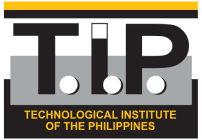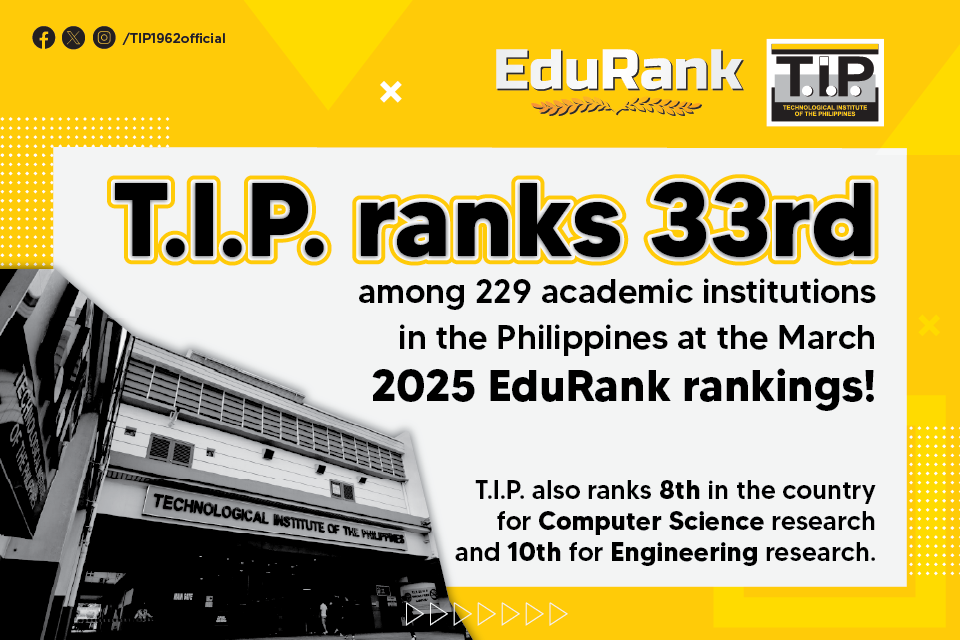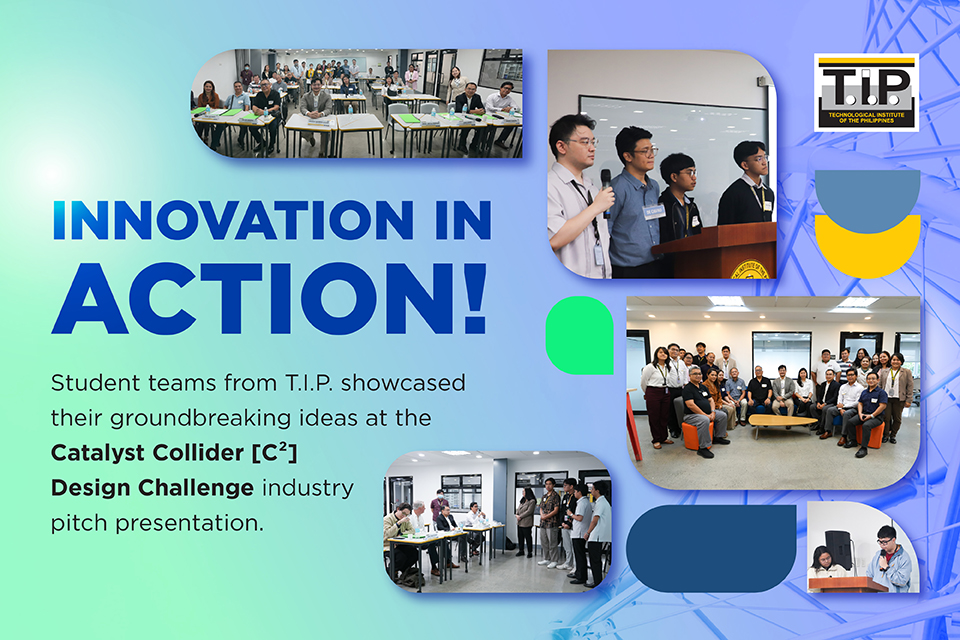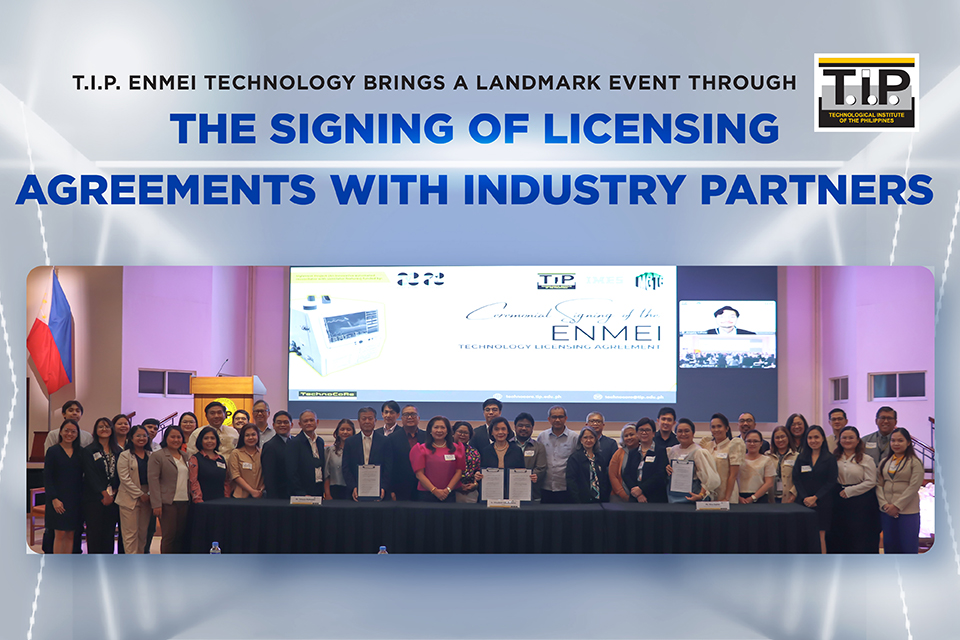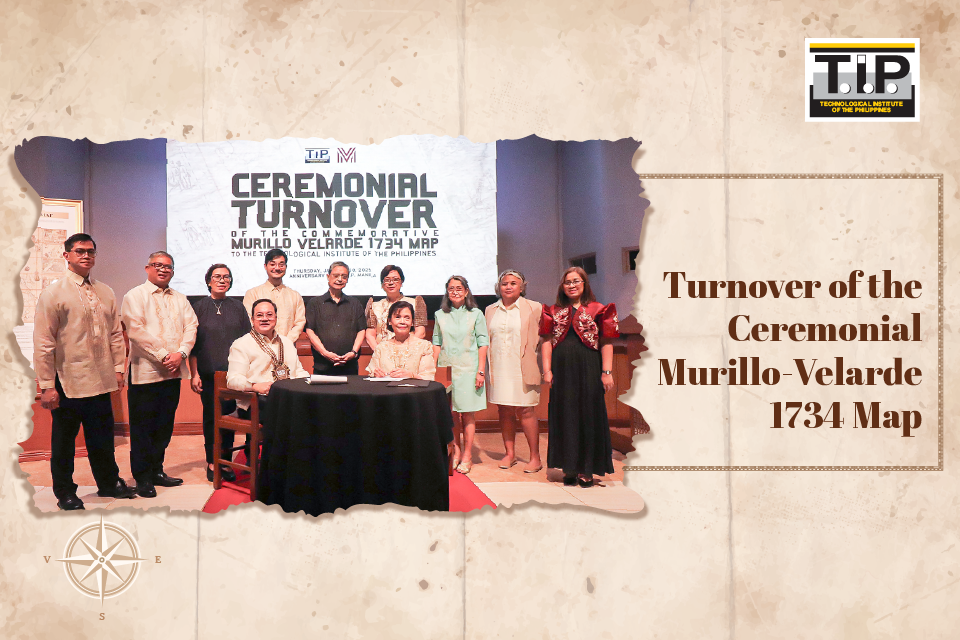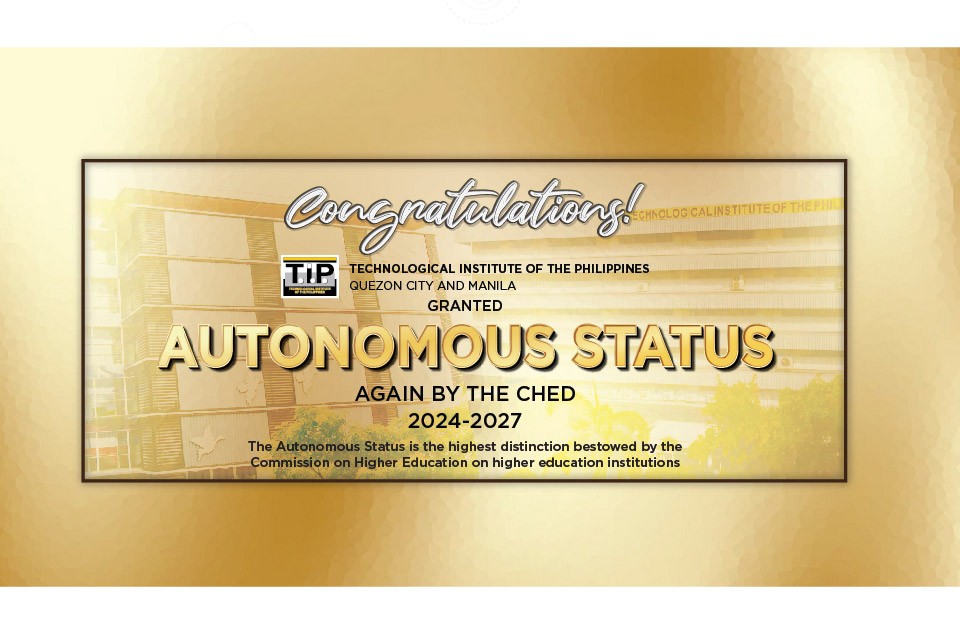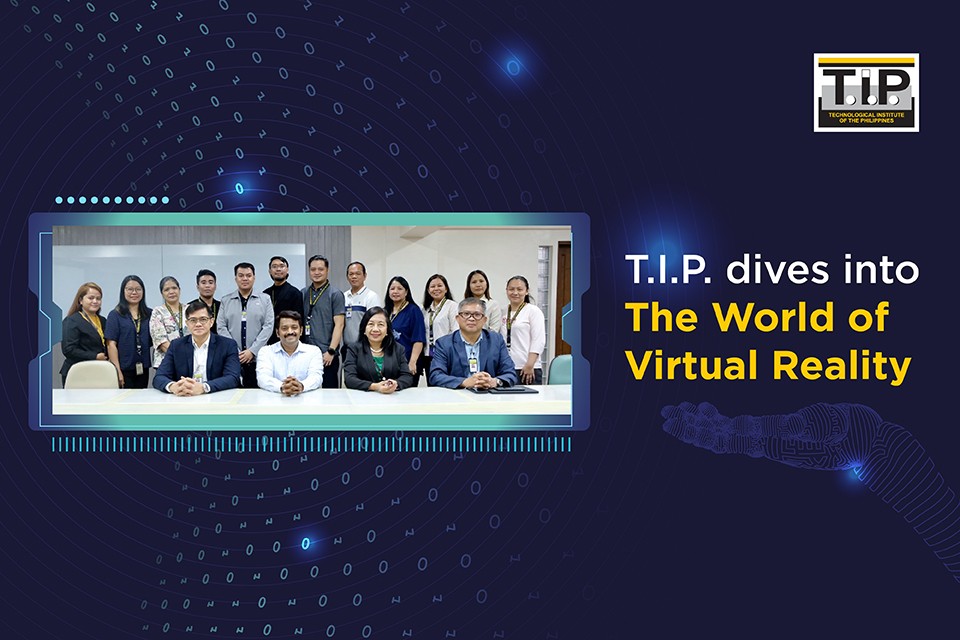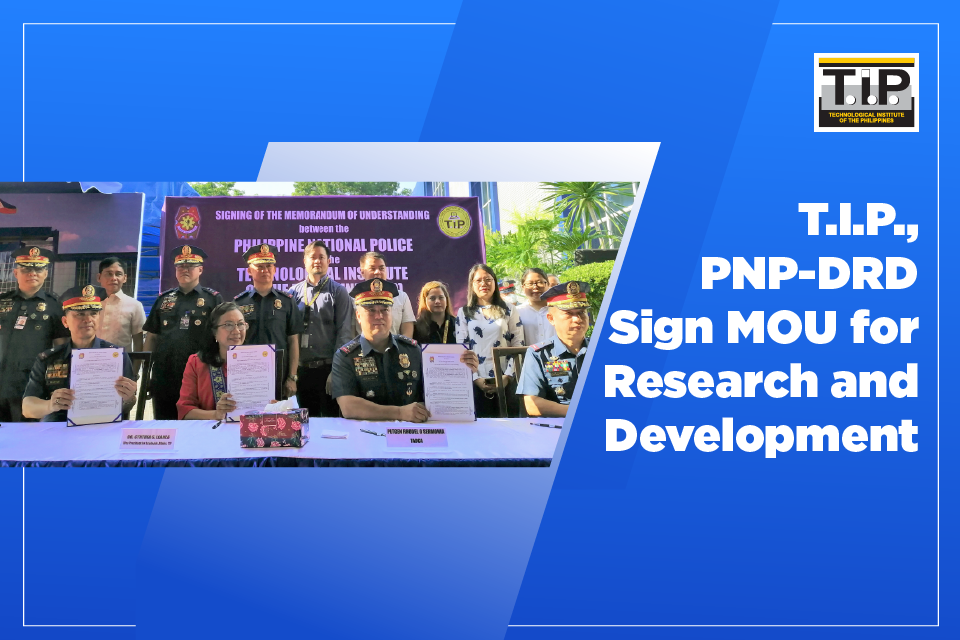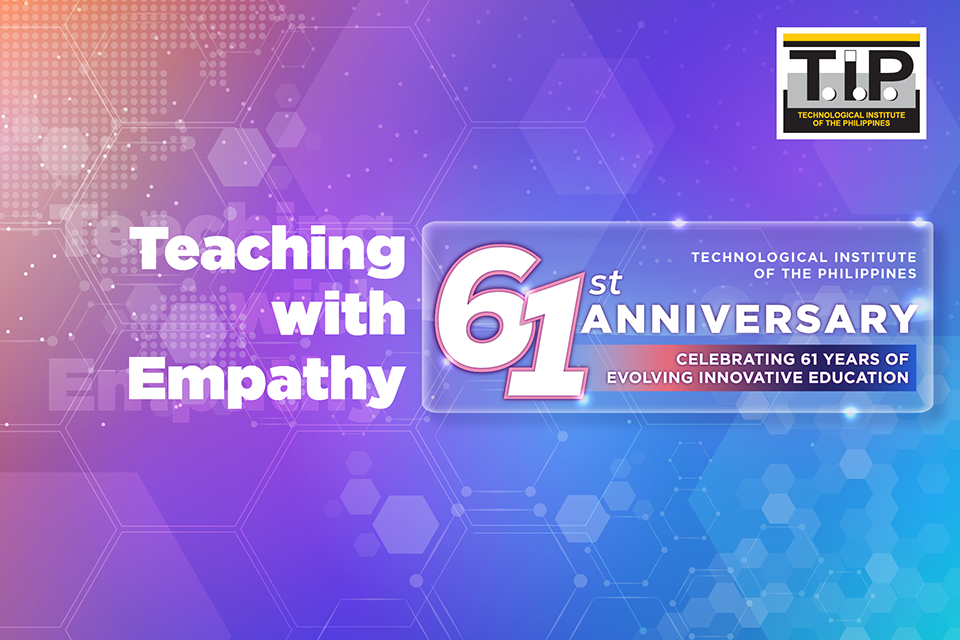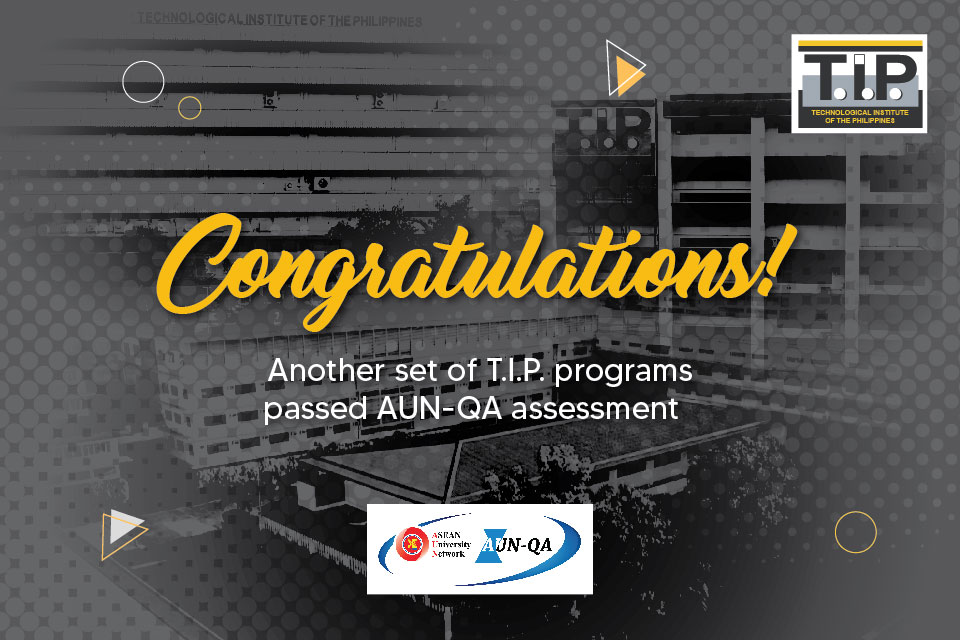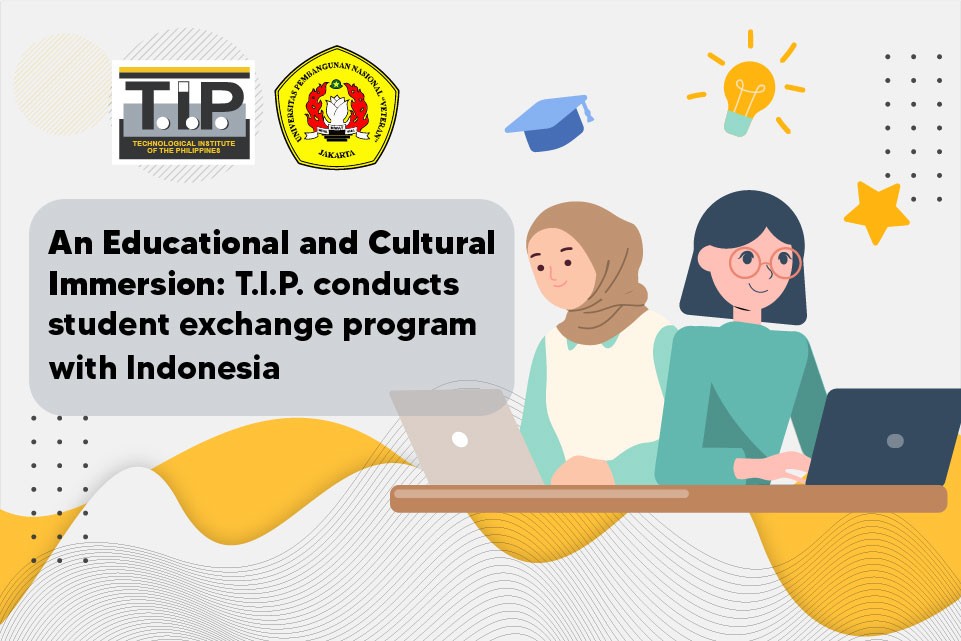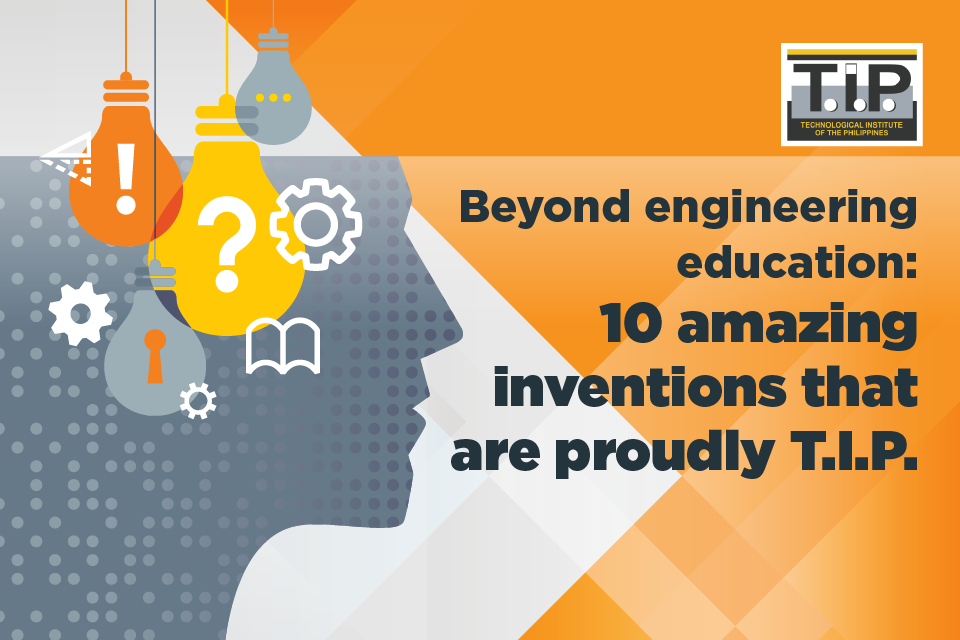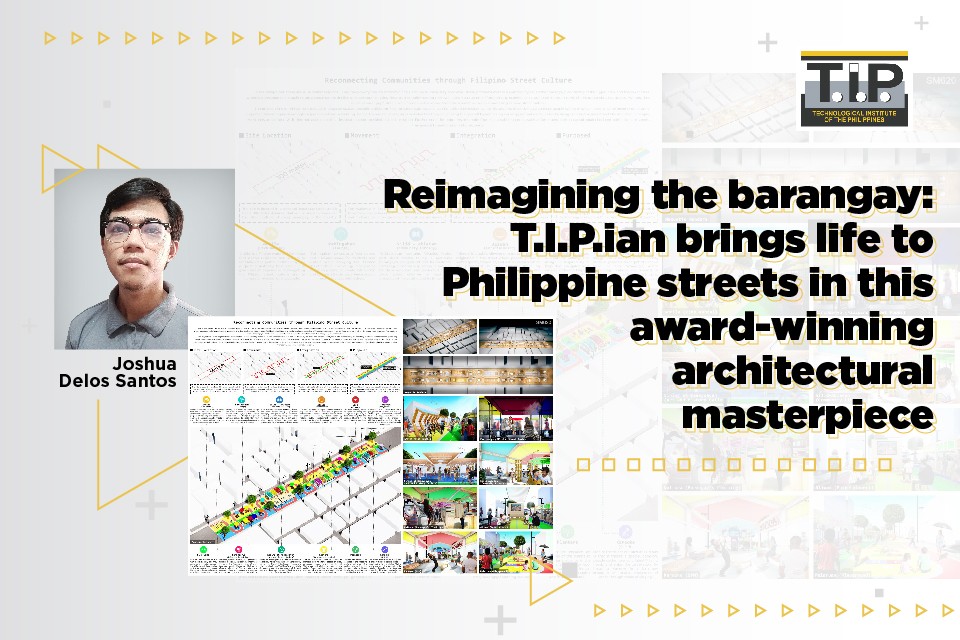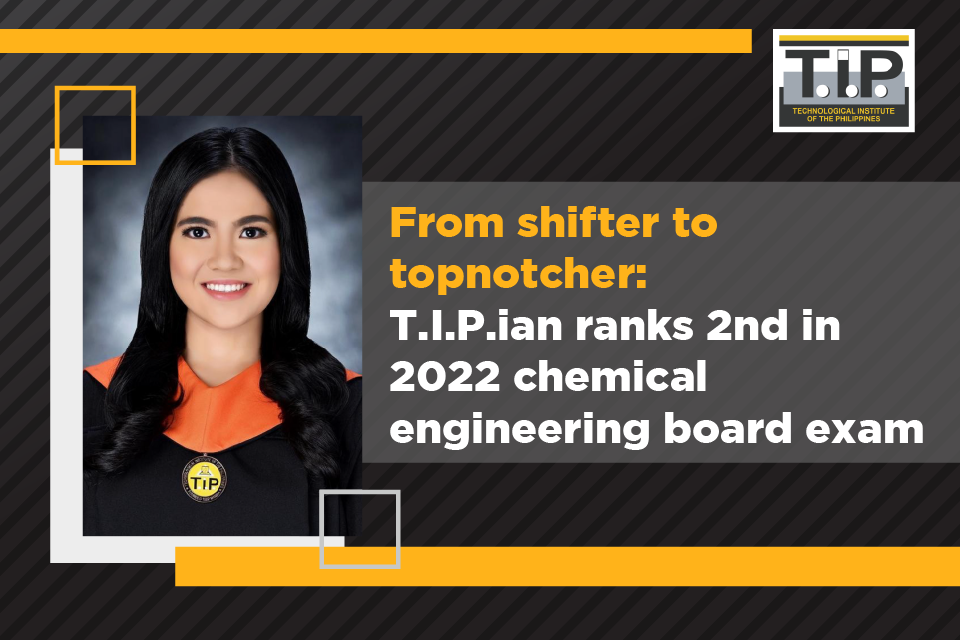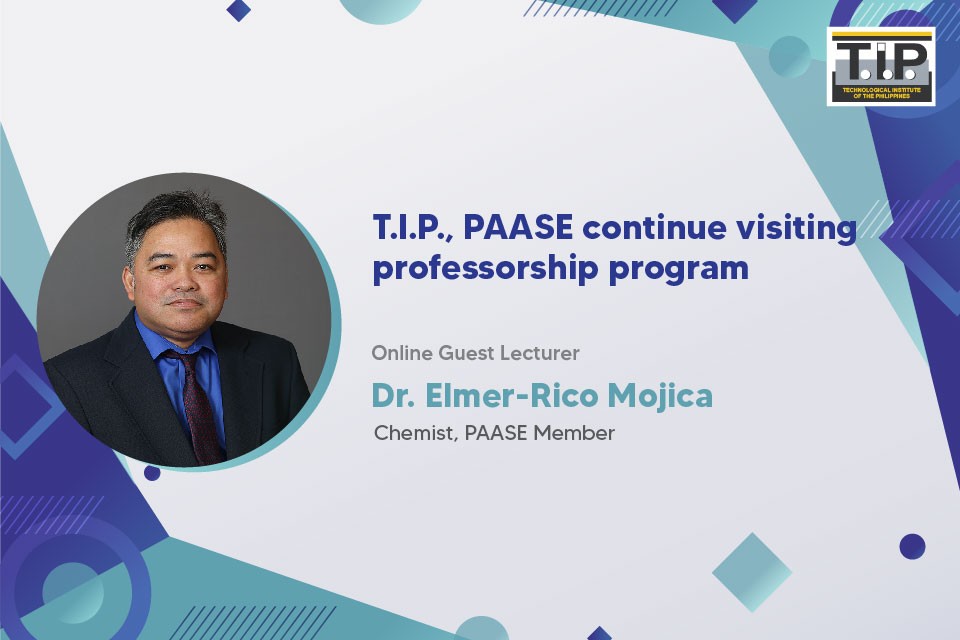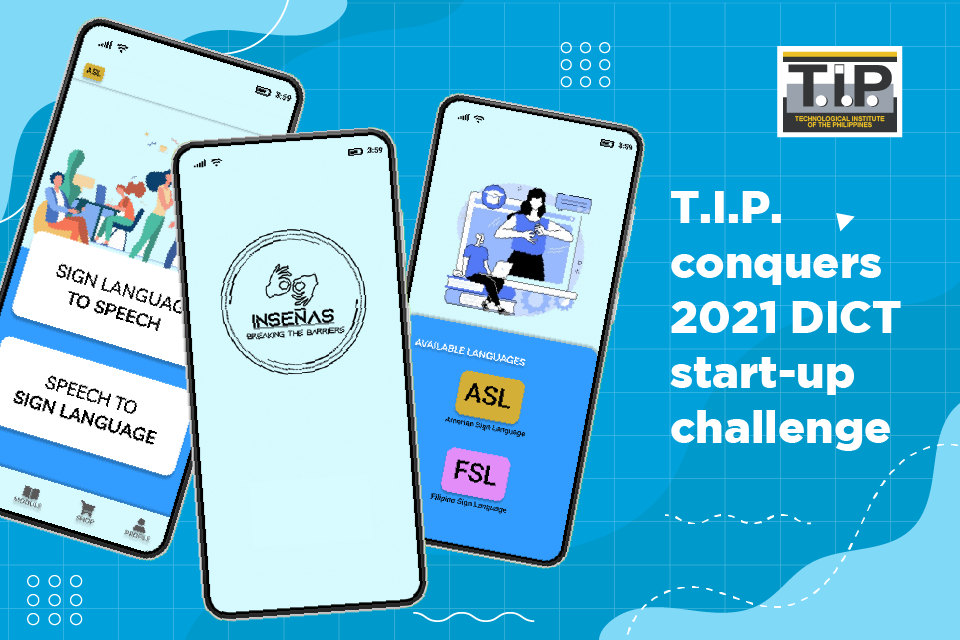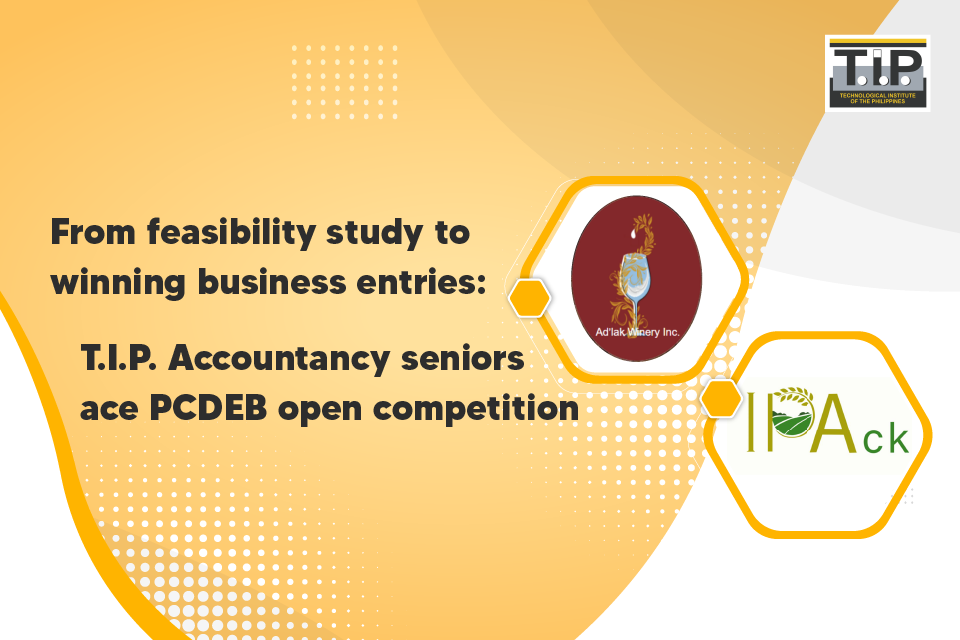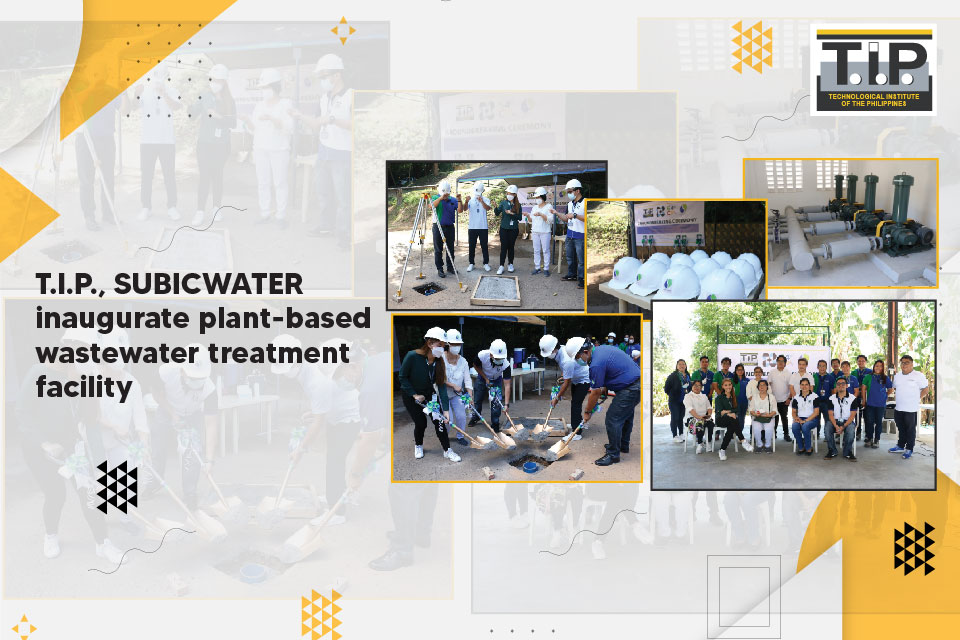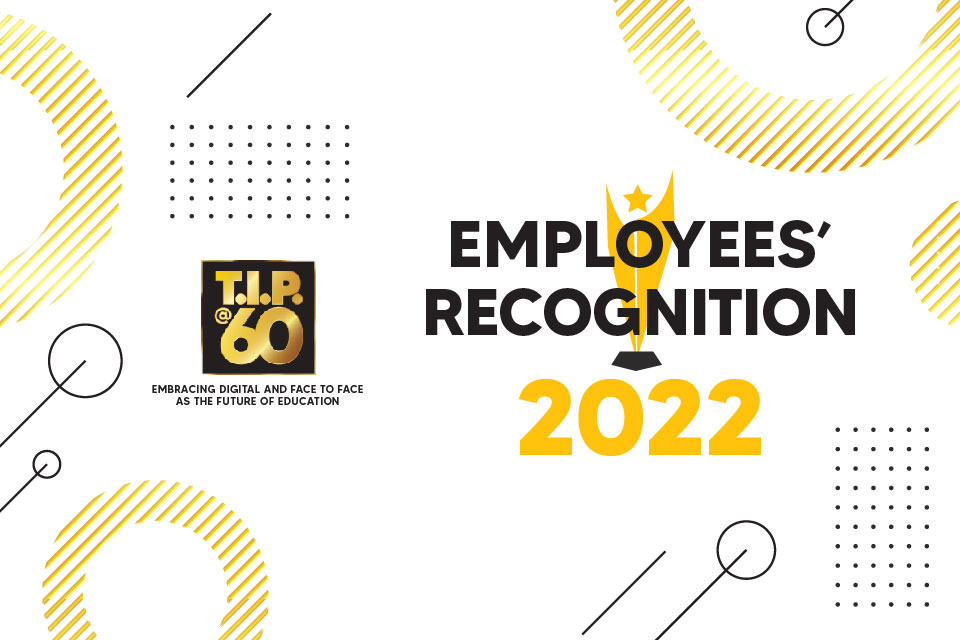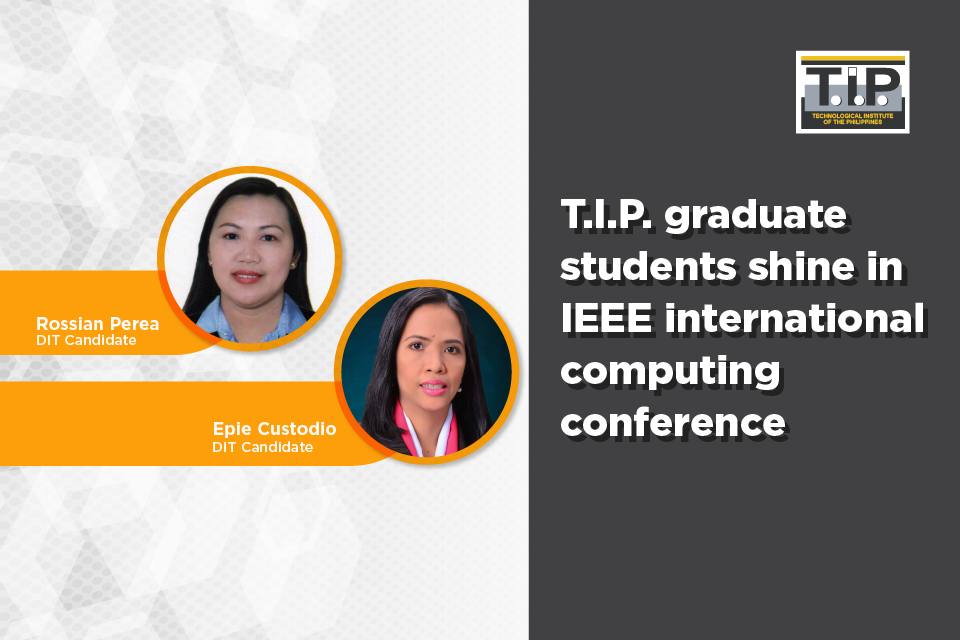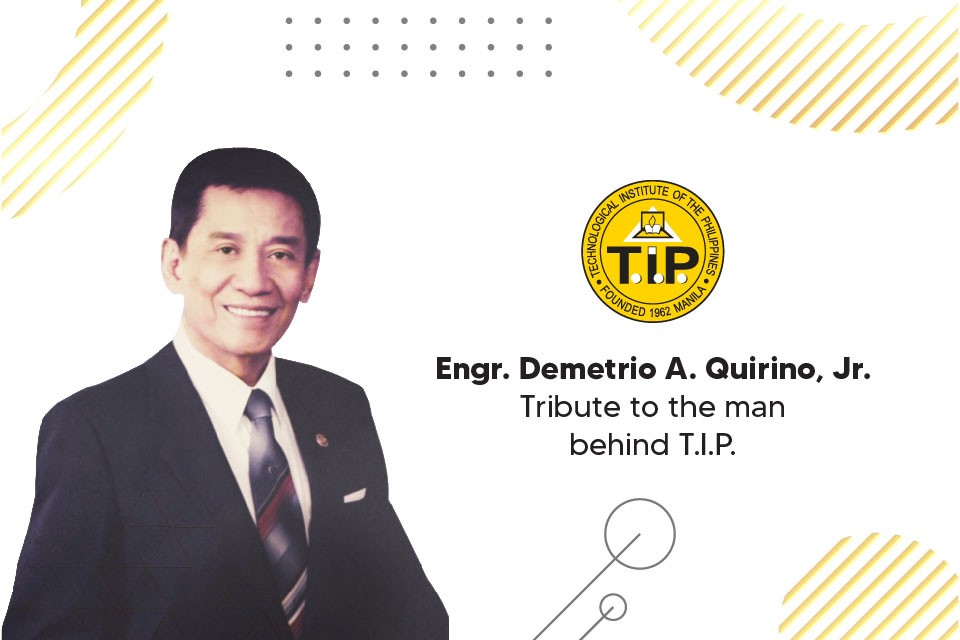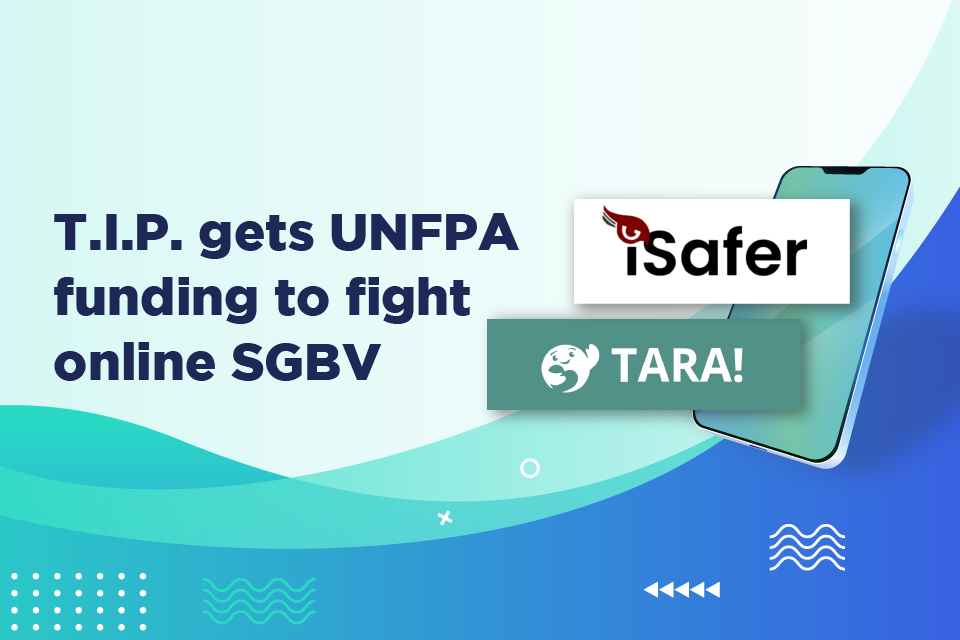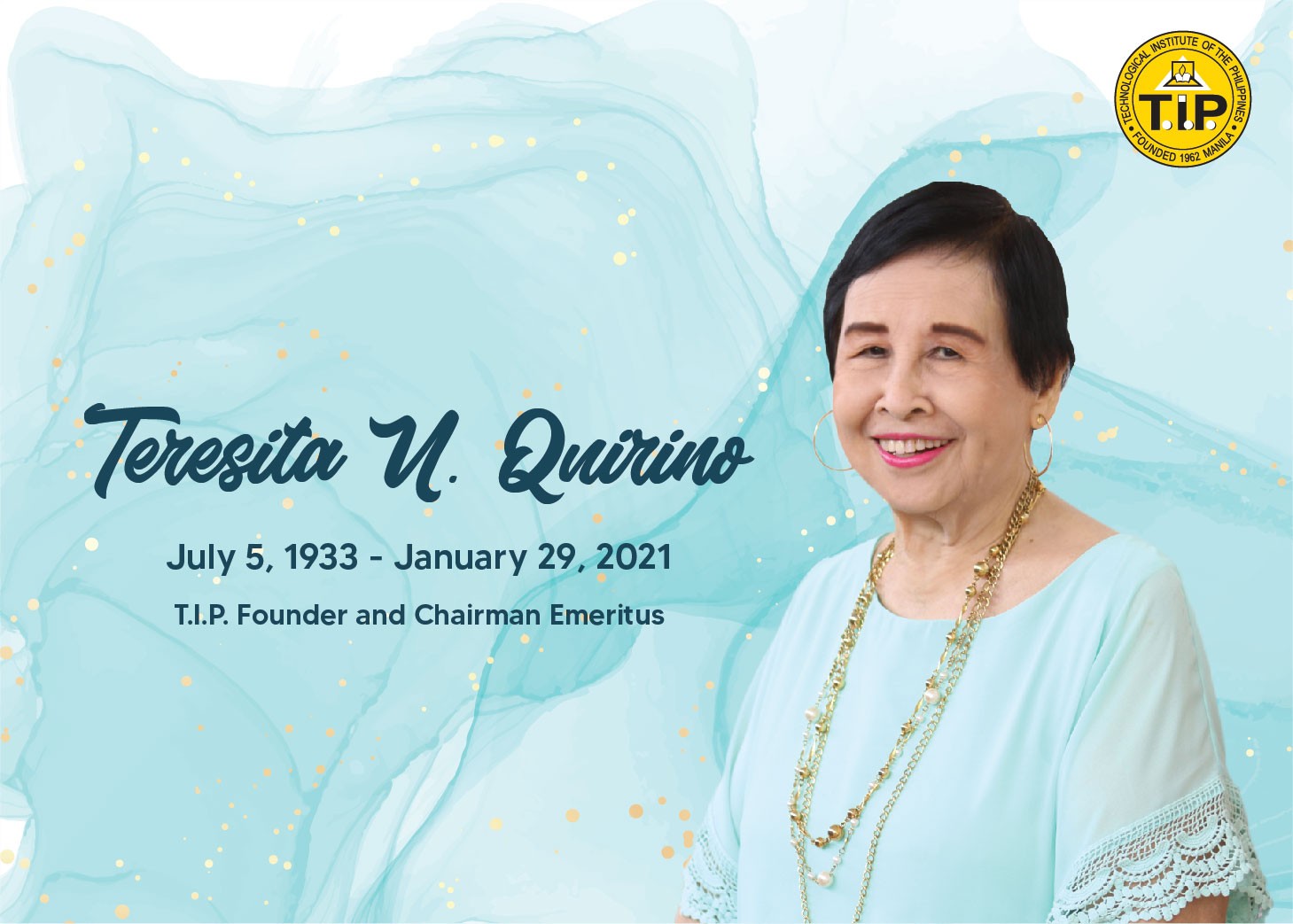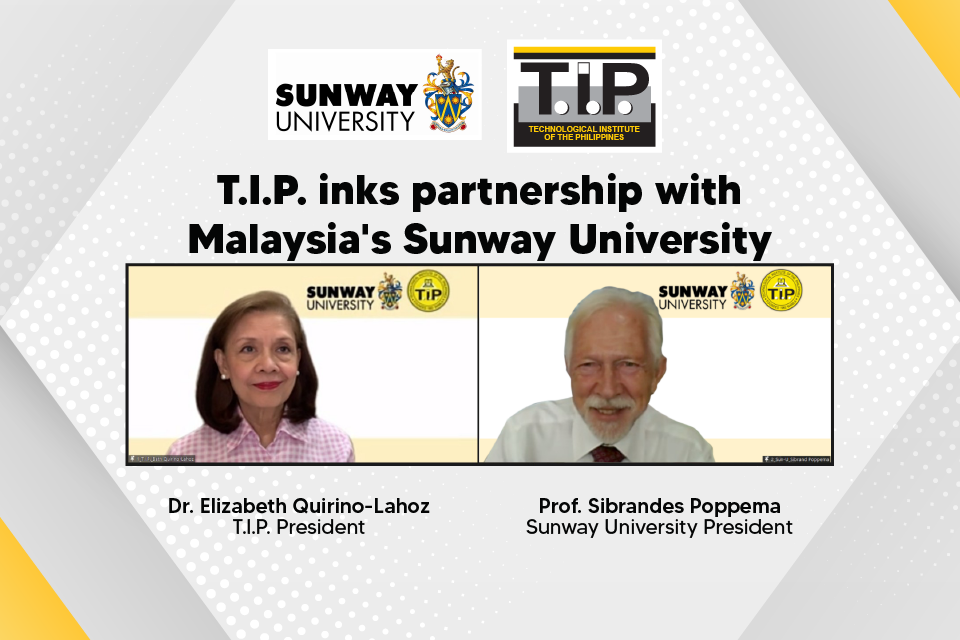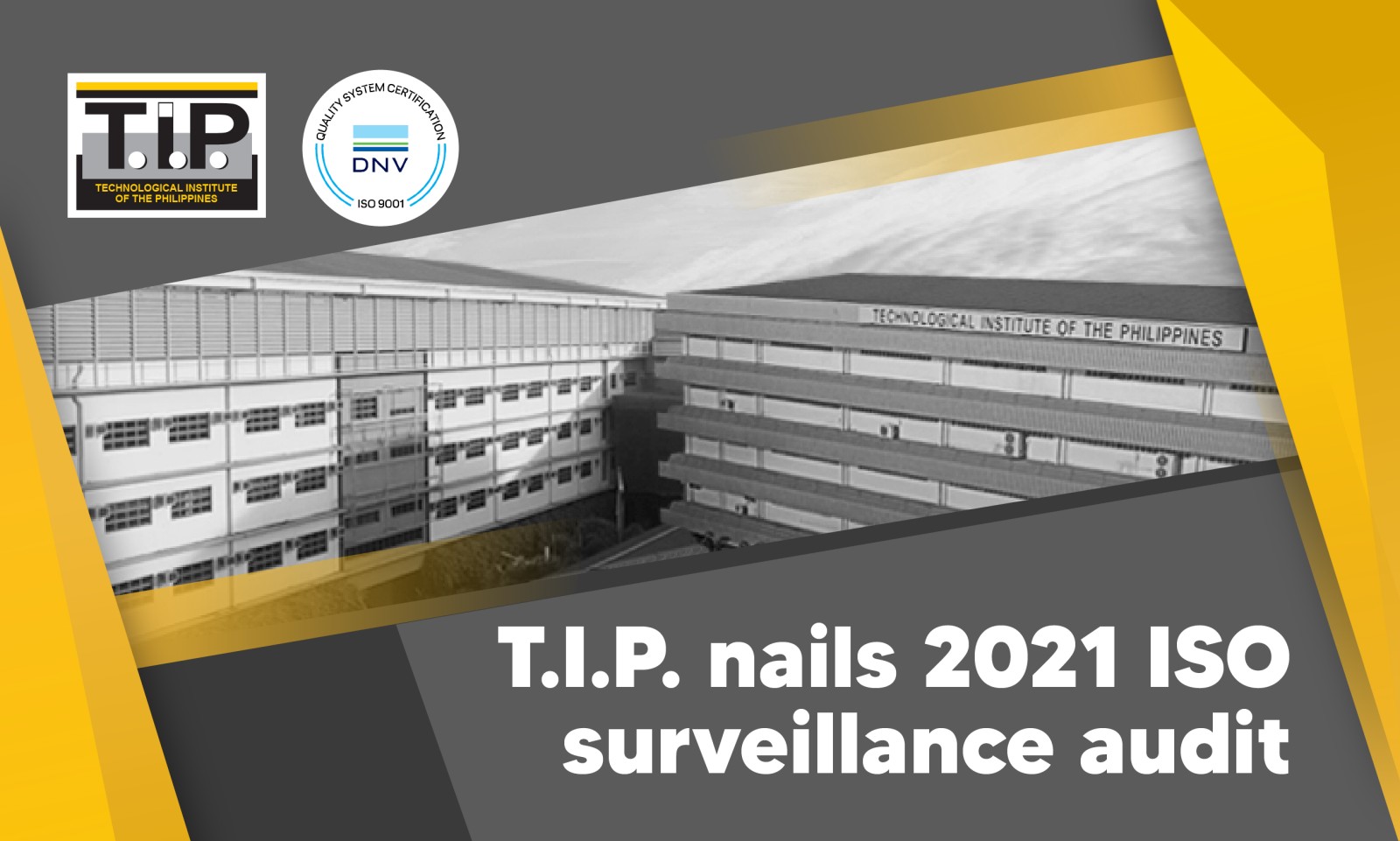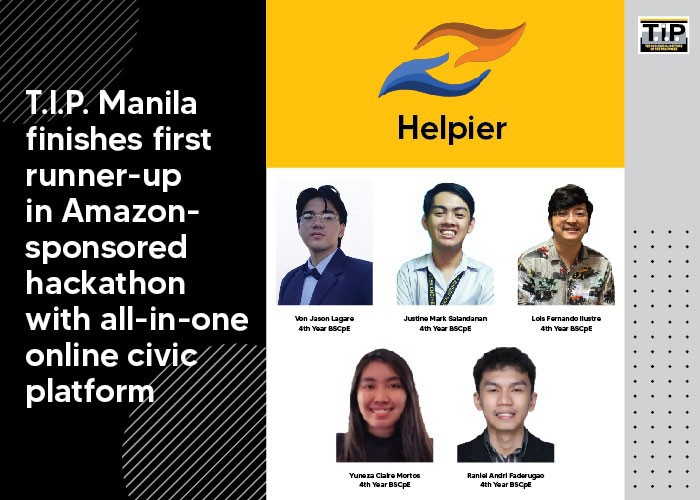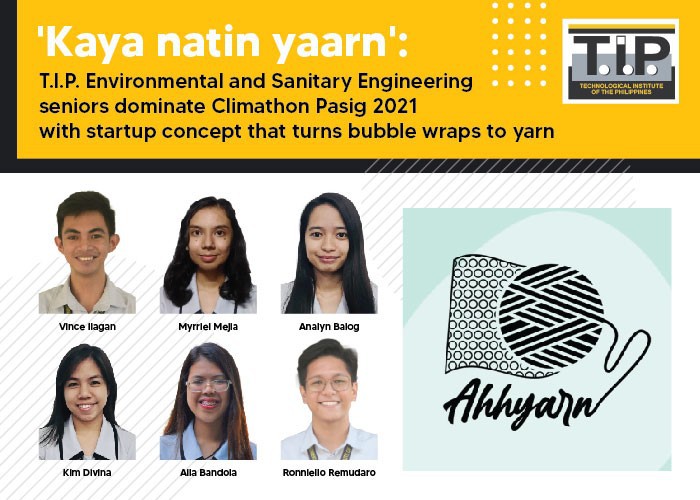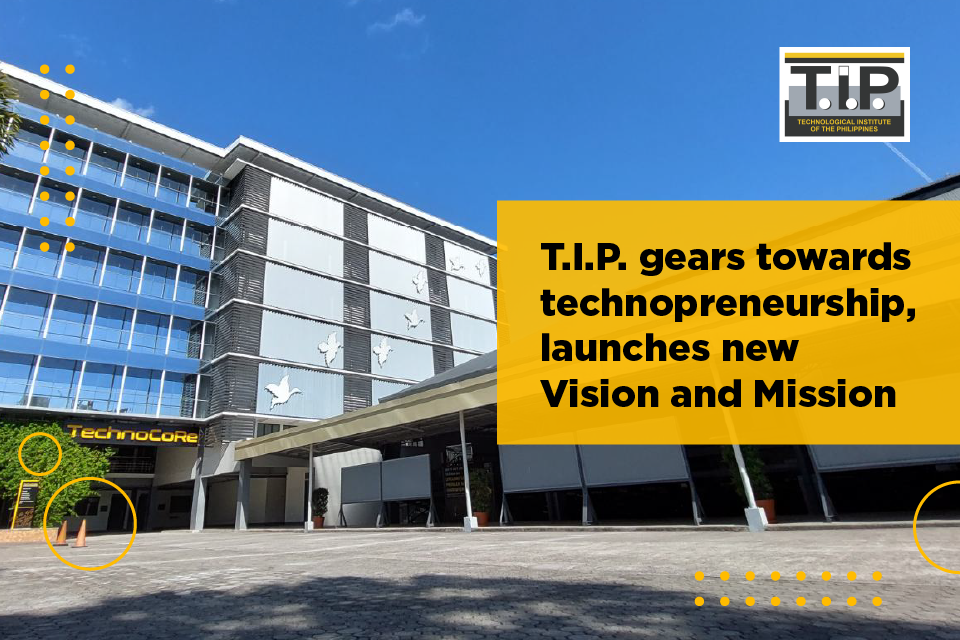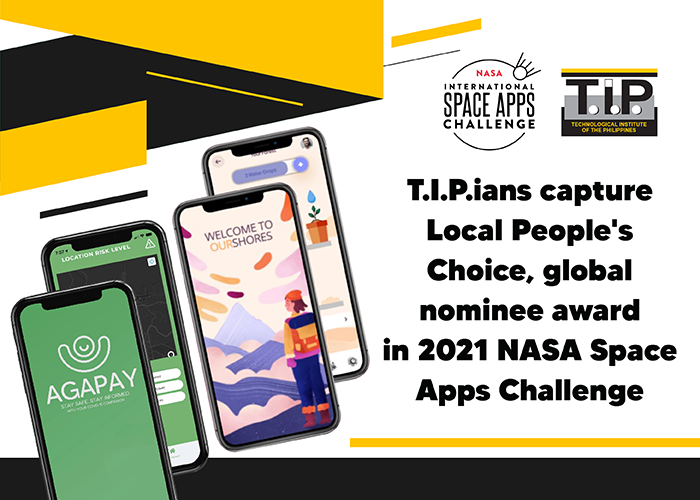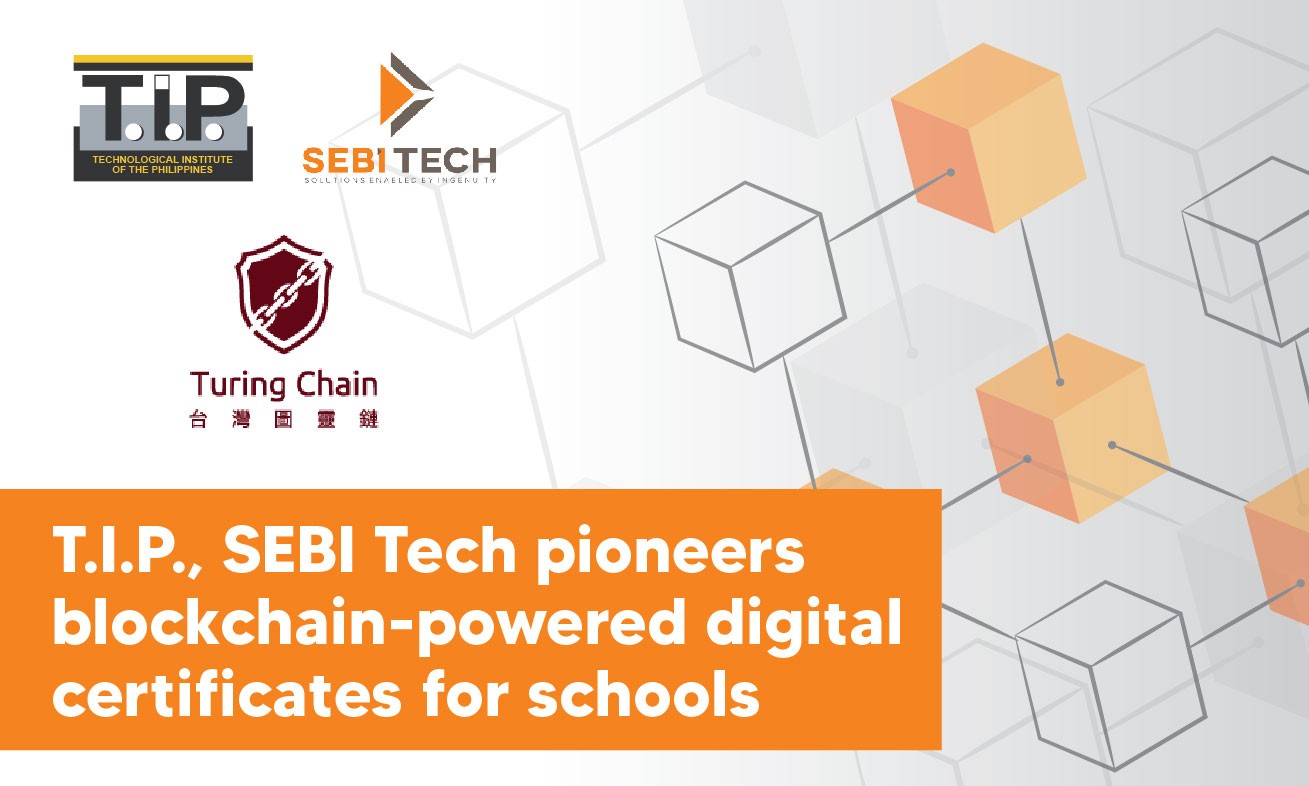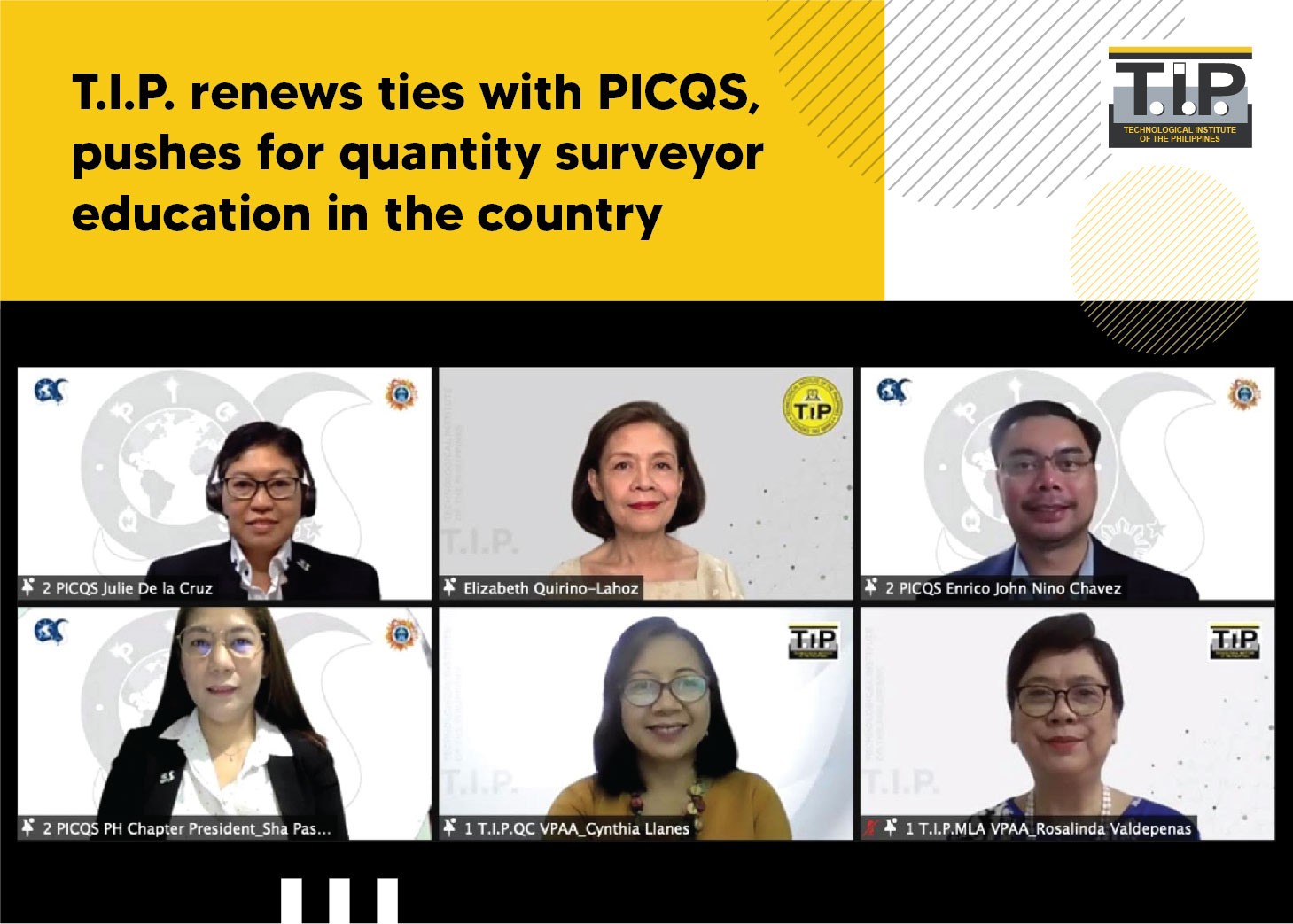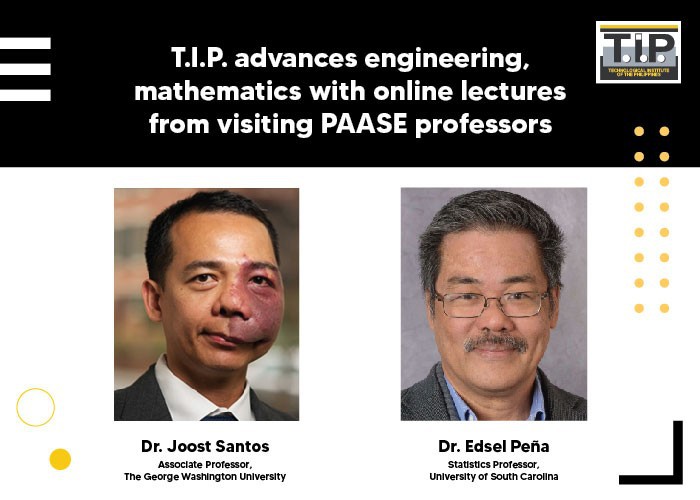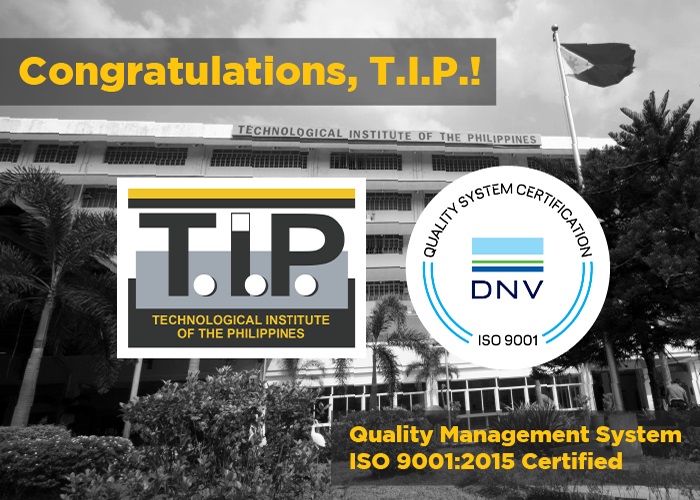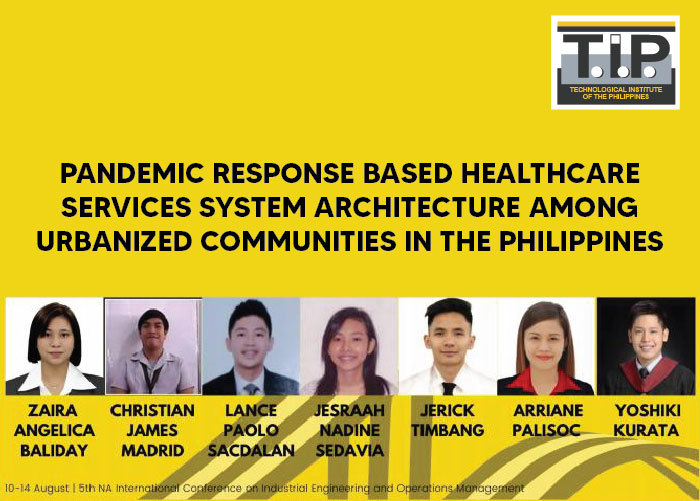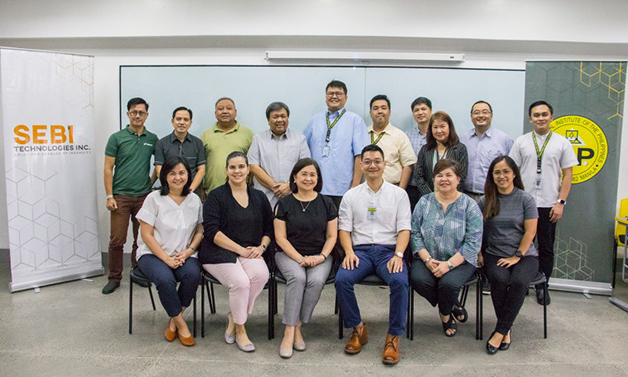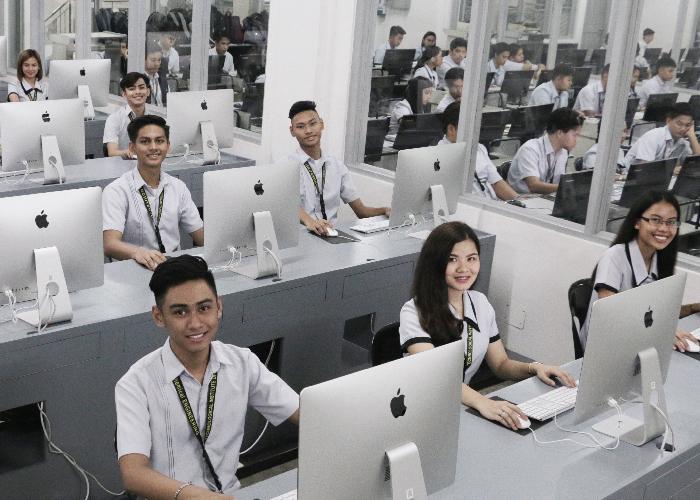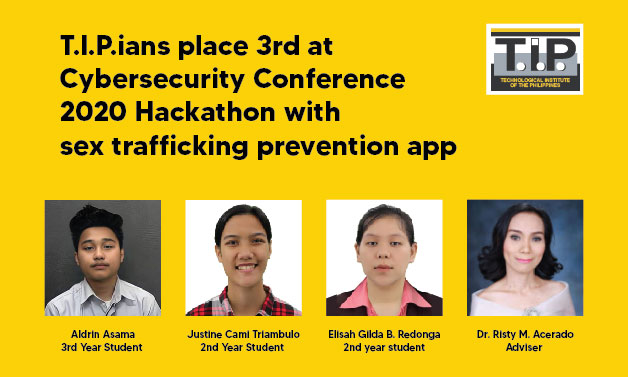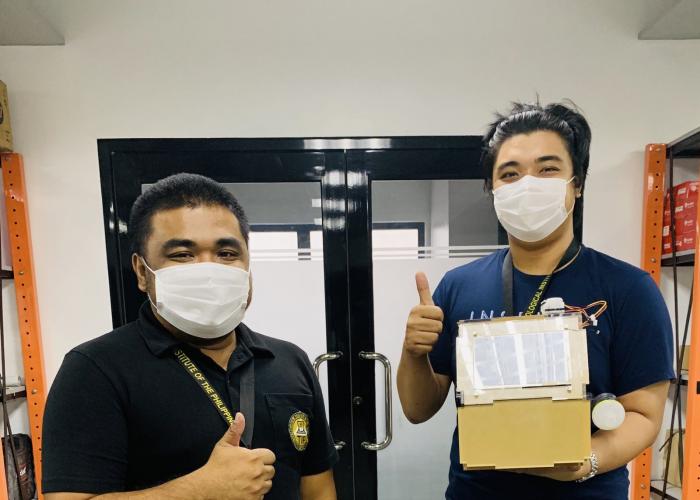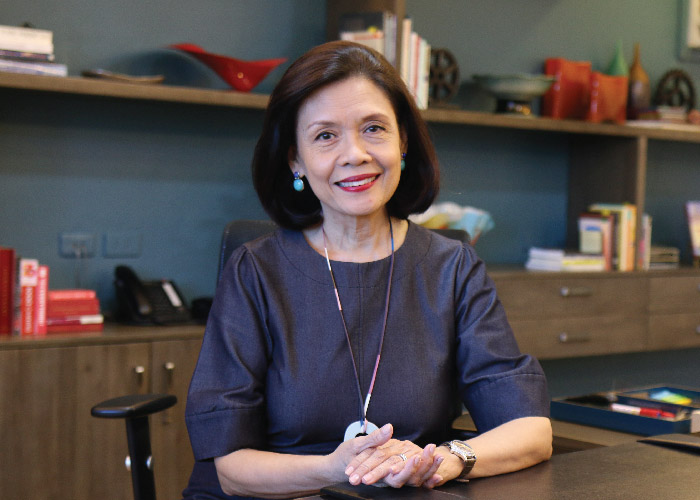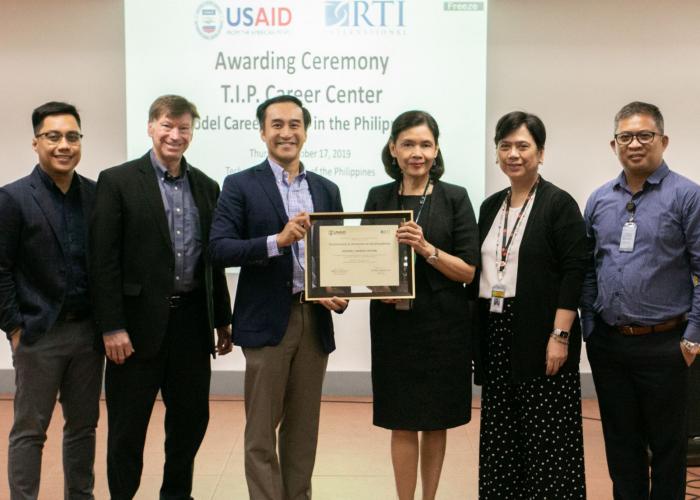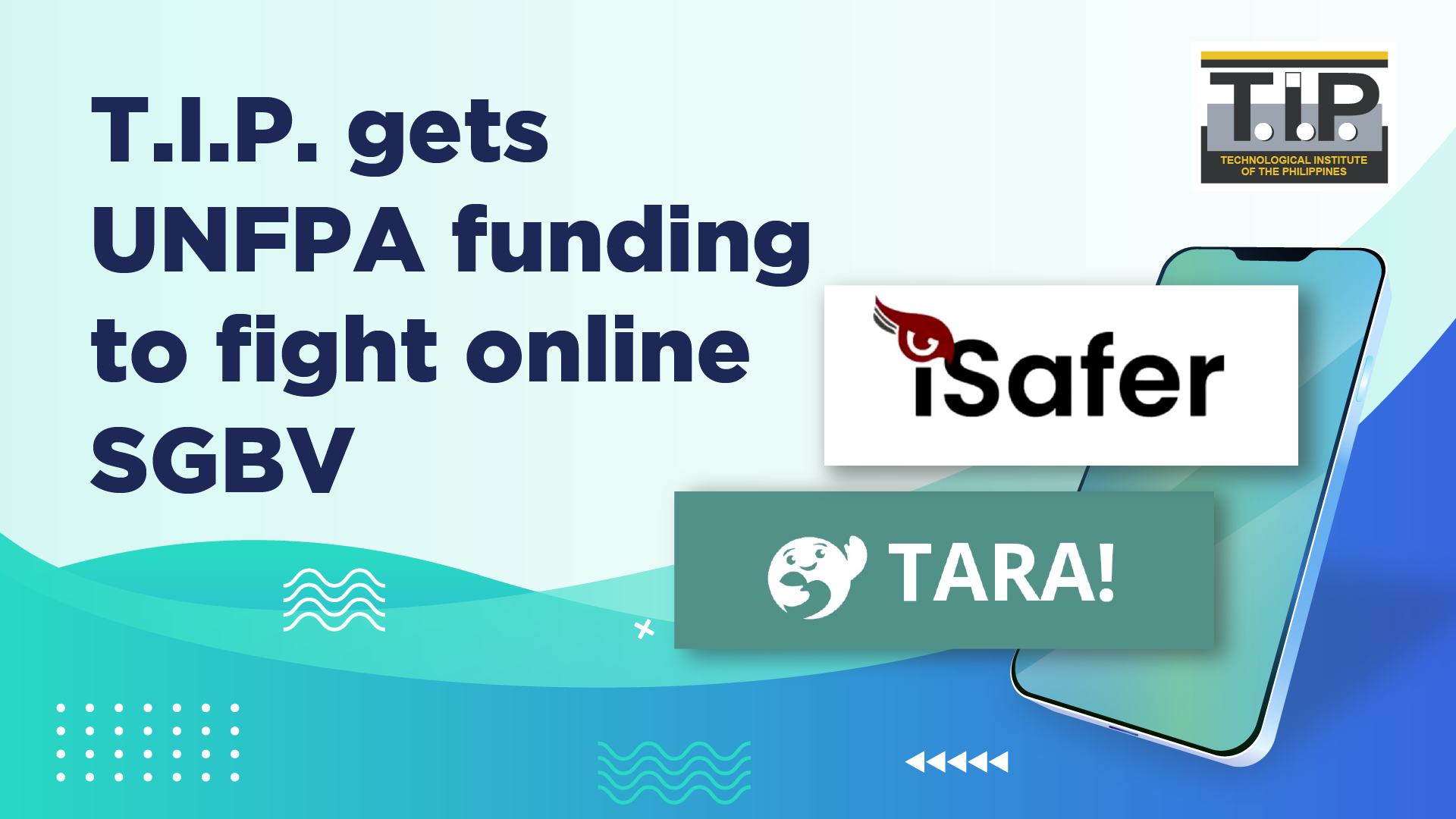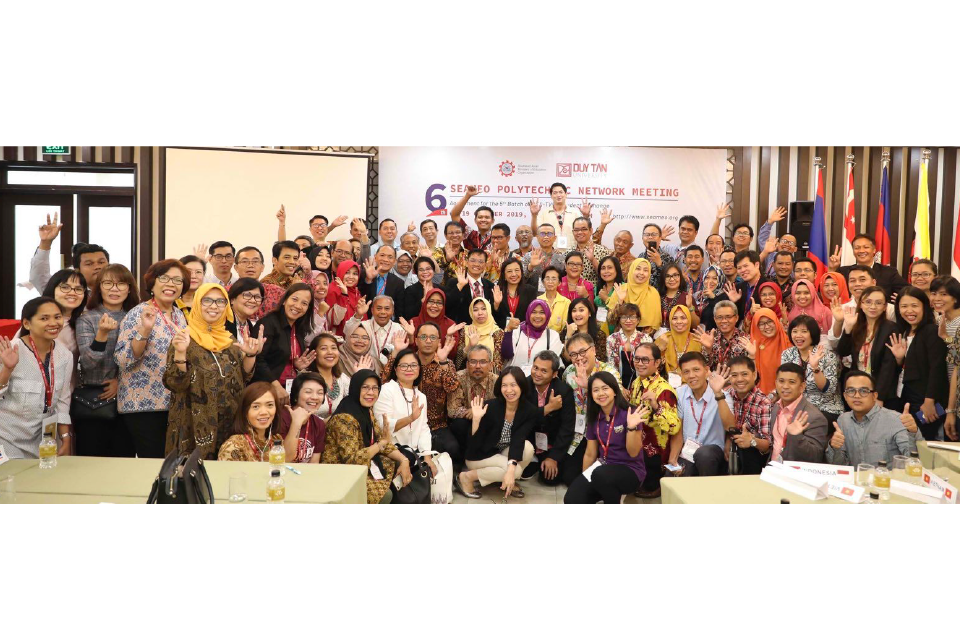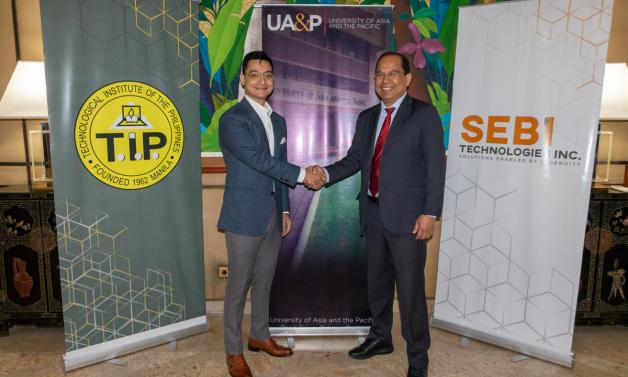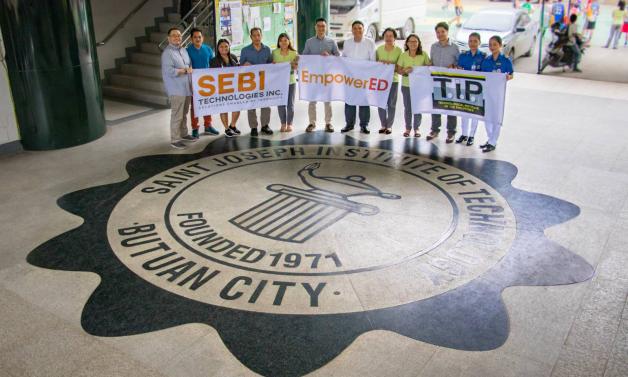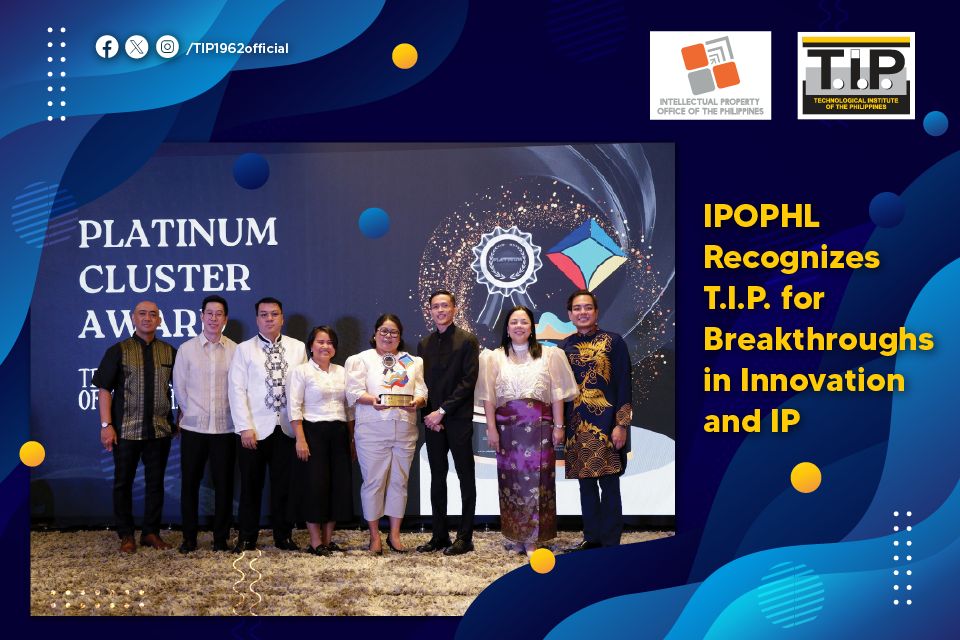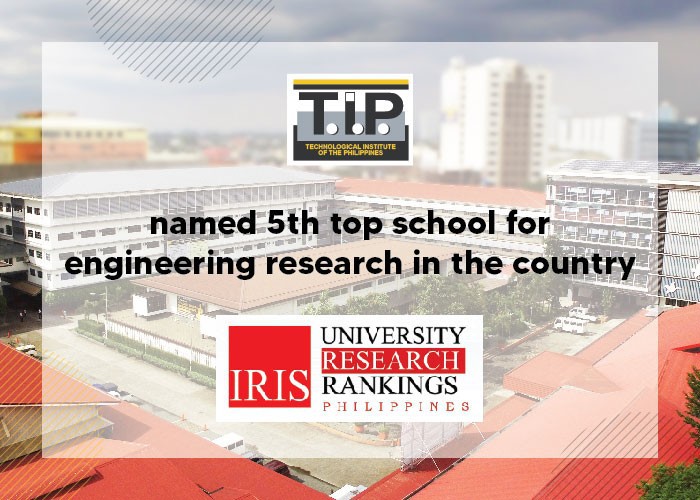
T.I.P. named 5th top school for engineering research in the country - IRIS
The Technological Institute of the Philippines (T.I.P.) was hailed as the fifth top school for engineering research in the 2021 IRIS (Institutes for Research, Innovation, and Scholarship) Philippine University Research Rankings.
In a webinar last July, IRIS revealed its beta list of 106 public and private higher education institutions (HEIs) ranked in the engineering, sciences, and health sciences fields based on cumulative publications and citations from Thomson Reuters and Elvesier.
IRIS also cited T.I.P. as one of the fastest growing universities in the sciences category, jumping from 37th to 28th in the last five years.
T.I.P. President Dr. Elizabeth Quirino-Lahoz welcomed the results as "good news," saying "affirmations such as this one inspire us to further contribute to that critical mass in research and innovation."
The IRIS rankings provide a stepping stone for local HEIs aspiring to earn international standing.
Dr. Carlos Primo David, who presented the list, stressed the importance of tracking university research performance "as these institutions are the primary seedbeds for knowledge creation." He also noted that "there's a good correlation between a vibrant research culture and high quality instructions at the tertiary level."
IRIS is a private educational organization that seeks to create pathways for collaboration among Filipino researchers, educators, and innovators in science, technology, engineering, mathematics, and agro-fisheries.
For more information on T.I.P., please visit tip.edu.ph or T.I.P.’s official social media accounts through @TIP1962official for Facebook, Twitter, and Instagram.
Latest News
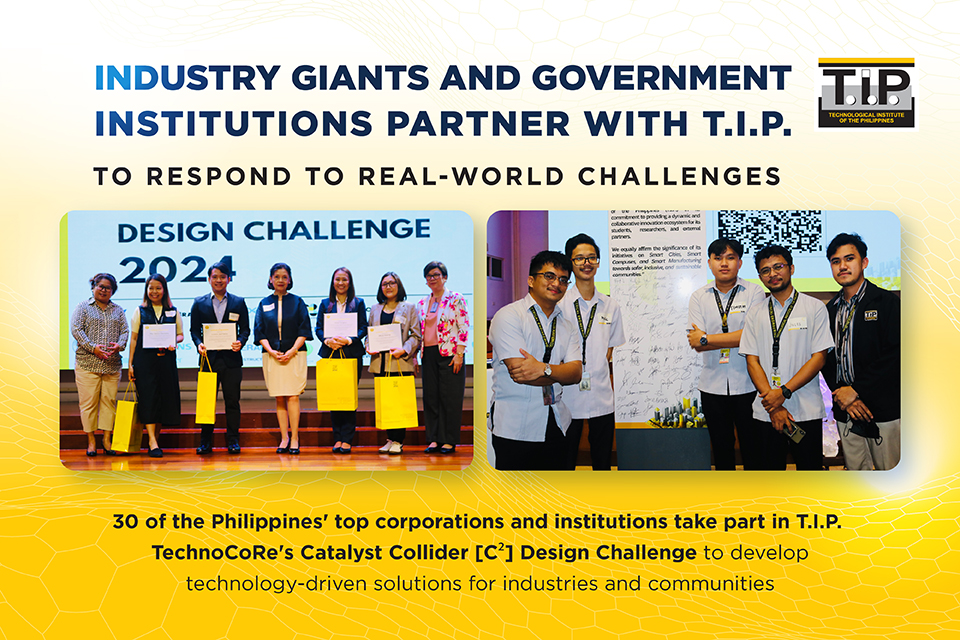
Industry Giants And Government Institutions Partner With T.I.P. To Respond To Real-World Challenges
The Technological Institute of the Philippines (T.I.P.) aims to bring about creative solutions to real-world problems through the Catalyst Collider [C²] Design Challenge – a platform for developing high-impact, technology-driven solutions to create value for industries and communities.
The event, which was initiated by T.I.P. TechnoCoRe, is guided by the theme “Smart Applications for Safer and Sustainable Cities, Schools, and Industries.” It aims to challenge T.I.P. students and faculty to develop cutting-edge and scalable solutions which promote smarter, more sustainable cities, industries, and campuses.
Students and faculty from the College of Computer Studies and the College of Engineering have taken on the challenge of designing impactful solutions. As part of TechnoCoRe’s thrust to provide students with real-world experiences through industry-academe partnerships, 35 partner institutions were tapped to be part of the design challenge as collaborators. These partners will mentor participants and provide insights into real-world challenges, pain points and commercialization opportunities.
Present during the event was a diverse range of public and private entities such as Dell Technologies, Siemens, Western Digital, P.IMES Corporation, Aboitiz Power, Azvercons, Braemac, Computrends, Geodata Systems Technologies, Globe Telecom, Gryke Scientific Instruments, Manila GIS Center, MELCO Factory Automation Philippines (MELAP), Philippine Chamber of Commerce and Industry - Las Piñas Chapter (PCCI Las Piñas), Presidium, Robinsons Land Corporation (RLC), Rohde and Schwarz, San Miguel Infrastructure, Subic Water and Sewerage Co., (SUBICWATER), Sumisetsu Philippines, Teradyne, Wadhwani Foundation, Wurth Electronics, the Department of Science and Technology (DOST), and the Department of Trade and Industry (DTI).
The Design Challenge encourages the project teams to innovate on several key focus areas such as Smart Manufacturing, which integrates advanced technologies like IoT, AI, and analytics to enhance manufacturing operations; Smart Cities, which leverages data-driven solutions for infrastructure, sustainability, and citizen services; and Smart Campuses, to optimize campus operations, resource management, and student experiences through automation and connected devices.
The champion will be awarded based on the Best Overall Design for the challenge. A People’s Choice Award and Special Industry Awards for standout performers will also be up for grabs.
The Catalyst Collider [C²] Design Challenge was officially launched last October 28, 2024 at the Anniversary Hall of T.I.P. Quezon City. The launch was also attended by almost 70 representatives from the participating institutions as well as representatives from T.I.P, led by Dr. Elizabeth Quirino-Lahoz.
Over the course of several months, the participating teams will create and refine their design projects, culminating in a final pitching session on Demo Day in May 2025.
Interested companies and institutions who would like to be a part of the innovation ecosystem for this year’s Catalyst Collider [C²] Design Challenge may join us in the upcoming events. Inquiries may be sent to the TechnoCoRe Director, Dr. Therese May G. Alejandrino, via email (tere.alejandrino@tip.edu.ph).
The Catalyst Collider [C²] Design Challenge is part of T.I.P.‘s initiative to empower students and faculty to be agents of change by turning research into industry-ready innovations through academe-industry-government partnerships.

T.I.P. clinches "Best Project of the Year" title anew; wins BPI-DOST Innovation Award second time in a row
For the second year straight, the Technological Institute of the Philippines (T.I.P.) Quezon City has won the “Best Project of the Year” award in the prestigious BPI - DOST Innovation Awards.
The team of 3rd year and 4th year Electronics Engineering students clinched the title with “Project Cacaotect,” a machine learning model that utilizes radio frequency to assist farmers in predicting cacao harvest date. The portable device has the potential to revolutionize the cacao farming industry by providing farmers with insights that can optimize harvest time.
Project Cacaotect, which was developed by students Julius Rafael Ele, Carl Vincent Reyno, and Sherie Paleracio under the guidance of Dr. John Joel Martinez of the T.I.P. QC Electronics Engineering department, bested other schools including Ateneo de Manila University and West Visayas State University.
The BPI-DOST Innovation awards is an annual competition which challenges the country’s brightest young minds to find solutions for pressing issues in local communities. This year’s edition was held on December 11, 2024 at the Makati Diamond Residences.
The Project Cacaotect team received PHP 150,000 in cash prizes, as well as plaques and medals for their win.
This is the second time that the T.I.P. Quezon City Electronics Engineering department won the “Best Project of the Year” title in the BPI-DOST competition. In 2023, Electronics Engineering alumni Joanna Keith Ildefonso, Orwell Orit, Liezl Lalaine Patrimonio, and Keanu Reodava got the award with their hand rehabilitation device, HandMATE. This continued success further underlines the Institution’s ongoing commitment to fostering young minds geared towards technological innovation.

T.I.P. Got AUN-QA Institutional Assessment!
The Technological Institute of the Philippines (T.I.P.) successfully passes the ASEAN University Network-Quality Assurance (AUN-QA) Institutional Assessment.
With this feat, T.I.P. is now only the third higher education institution (HEI) in the Philippines to have been granted this honorable assessment. This also places T.I.P. as the 10th overall to successfully pass the AUN-QA institutional assessment in the entire Southeast Asia region.
This institutional milestone plays a pivotal role in delivering a holistic and high-quality student experience. Hand in hand with our most recent three-year renewal of the Autonomous Grant from the Commission on Higher Education (CHED), it amplifies our goal to be a global and national standard of excellence.
Dr. Elizabeth Quirino-Lahoz, president of T.I.P., thanks the T.I.P. Community for its unwavering support and dedication to the institution and challenges its members to translate this success into better and more value-adding student outcomes.
The AUN-QA team conducted its week-long assessment at T.I.P. Quezon City and Manila from September 2 to 6, 2024.
On top of the institutional assessment, T.I.P. also has 20 academic programs assessed by the AUN-QA. These programs include its architecture, accountancy, business administration and teacher education, and some engineering, computing and graduate programs.
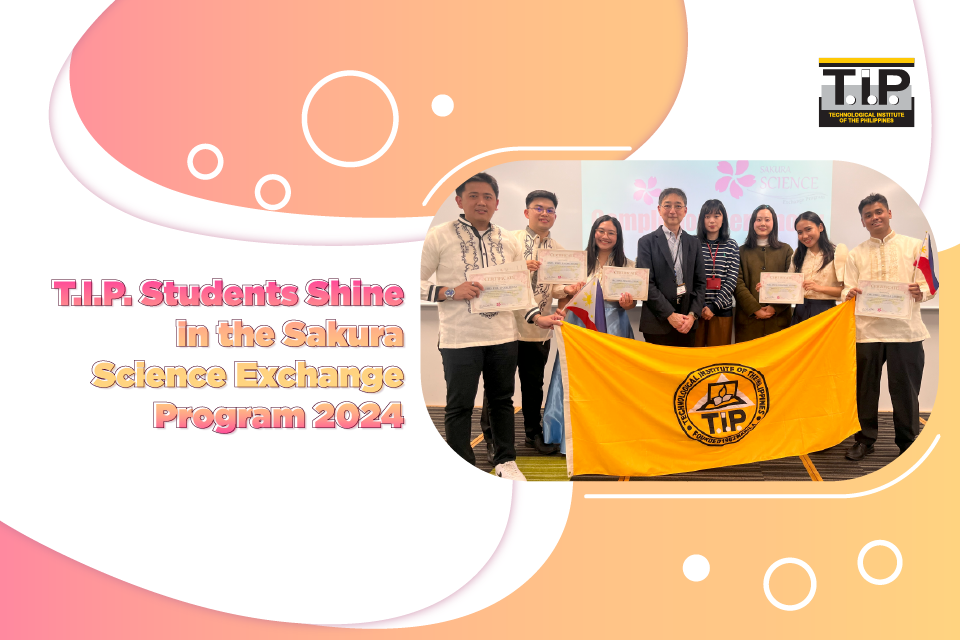
T.I.P. Students Shine in the Sakura Science Exchange Program 2024
Recognizing the transformative power of international collaboration and cultural exchange, a group of motivated students from the Technological Institute of the Philippines (T.I.P.) recently joined the esteemed Sakura Science Exchange Program (SSEP) in Japan.
This immersive experience, from March 3 to March 9, 2024, provided an invaluable opportunity for Jeshua Mikkel Abejero, Faye Angelu Aguirre, John Cyrell Jadormio, and Ma. Sophia Payang, who are taking up different business and accountancy courses, to explore science, technology, and cross-cultural understanding.
Led by their passion for innovation and global engagement, these T.I.P. students proudly represented the Philippines, eager to learn and make meaningful connections.
Facilitated by the Japan Science and Technology (JST) agency and hosted by JF Oberlin University in Machida, Japan, the SSEP serves as a platform to promote international scientific exchange and collaboration in science and technology.
Prior to their departure, the T.I.P. International Relations Office and the Student Development Program Unit of the Career Center meticulously prepared the students, providing essential guidance on travel logistics, cultural readiness, and academic engagement.
Under the guidance of James Paul Menina, a faculty member of T.I.P. 's College of Business Education, the delegates immersed themselves in various activities designed to deepen their understanding of Japan's advanced technology and meet people from different backgrounds. From attending business lectures to engaging in corporate visits and cultural exchanges, the students embraced every opportunity to expand their horizons.
Reflecting on their experiences, Faye Aguirre, a third-year student of BS Administration - Major in Financial Management (BSBA-FM), emphasized the impact of the exchange program on both her personal and academic growth. She stated, "The SSEP really opened my eyes to global partnerships and how they help economies grow. It really changed how I see things."
Similarly, Cyrell Jadormio, a third-year student of BS Accountancy (BSA), added, "Talking with students from other countries reminded me how important it is to work together and understand each other in today’s connected world."
Overall, the SSEP 2024 was an unforgettable experience for the T.I.P. students. They gained valuable knowledge about Japanese technology and are now better prepared to take on leadership roles in the global scientific community.
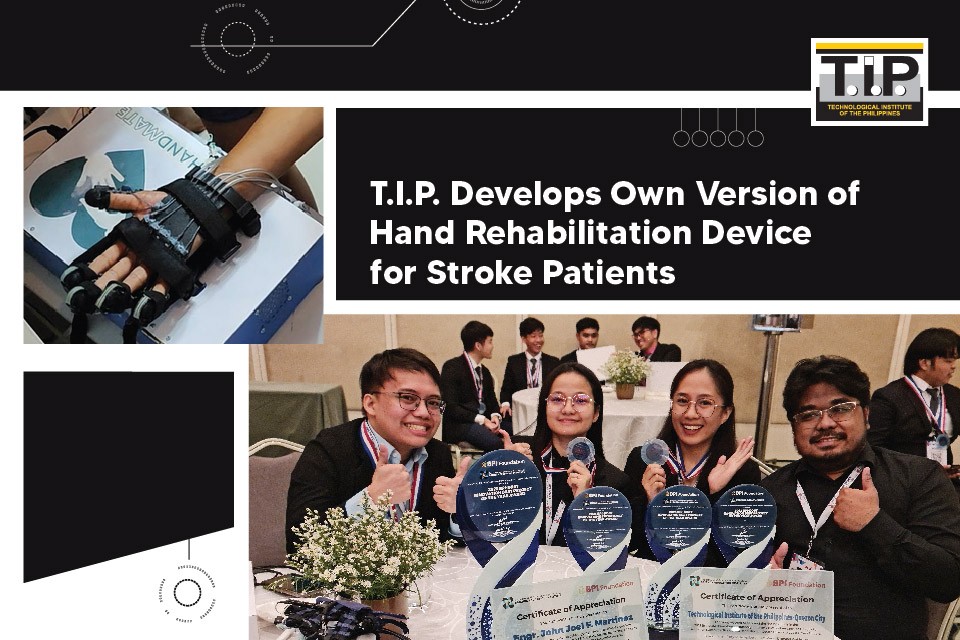
T.I.P. Develops Own Version of Hand Rehabilitation Device for Stroke Patients
What started as a thesis project for a group of Technological Institute of the Philippines (T.I.P.) electronics engineering (ECE) graduates turned into a promising rehabilitation device that seeks to aid recovering stroke patients.
T.I.P. Quezon City alumni Joanna Keith Ildefonso, Orwell Orit, Liezl Lalaine Patrimonio, and Keanu Reodava developed their project called “HandMATE,” which recently won “Best Project of the Year” at the 2023 BPI-DOST Innovation Awards.
Collectively known as “RAD Tech,” the team worked with their adviser ECE faculty member Engr. John Joel Martinez to create a glove-like device made of light materials that uses a network of cost-effective internet-based technologies to facilitate the therapy of patients.
“The HandMATE has been specifically designed to address the extended healing period associated with hand rehabilitation, a process influenced by limited blood circulation,” the team wrote in the abstract of their study.
“By leveraging neuroplasticity, it aims to reestablish connections between nerve cells, restore lost motor skills, and meticulously monitor the healing progress, thereby contributing to an enhanced quality of life for post-stroke patients,” they added.
Neuroplasticity refers to the ability of our nervous system to change its activity in response to intrinsic or extrinsic stimuli by reorganizing its structure, functions, or connections after a stroke or other types of traumatic brain injuries, according to the National Library of Medicine.
Engr. Martinez said his students worked on the “HandMATE” project for one and a half years. They also tested the prototype “numerous times with satisfactory results,” which notably became their competitive edge.
“This device stands out for its capacity to facilitate both passive and active exercises, prioritizing rehabilitation, integrating IoT (internet of things)-based control and data retention functionalities, and providing an affordable solution,” team RAD Tech noted.
The team accepted their award in a ceremony organized by the Bank of the Philippine Islands (BPI) Foundation and the Department of Science and Technology (DOST) Science Education Institute last December 11, 2023 at the Makati Diamond Residences.
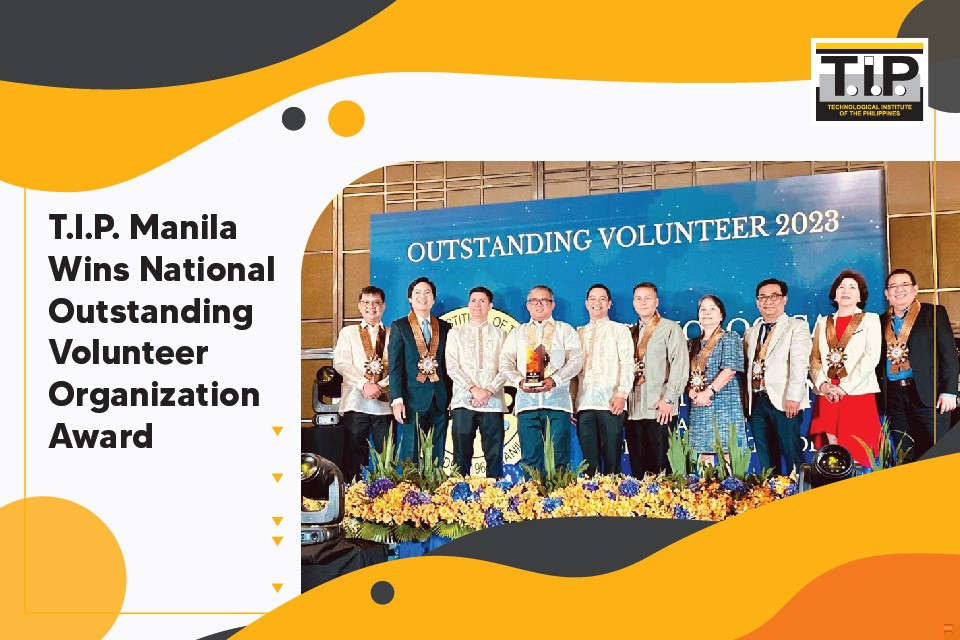
T.I.P. Manila Wins National Outstanding Volunteer Organization Award
Technological Institute of the Philippines (T.I.P.) Manila was named one of the outstanding volunteer organizations under the corporate category by the Philippine National Volunteer Service Coordinating Agency (PNVSCA) last December 12, 2023.
T.I.P. Manila won the award at the regional and national levels in the 2023 Search for Outstanding Volunteers (SOV) for its “multifaceted approach to community engagement, innovative projects, and integration of technology” that creates a lasting and positive impact.
The Metro Manila Development Authority (MMDA), which was part of the SOV selection committee, nominated T.I.P. Manila based on the various community extension services (CES) projects it implemented for the last five years.
T.I.P. Vice President for Student Affairs Dr. Frank Alejandrino, Student Life and Leadership Development Manager Joel Dannug, and T.I.P. Manila CES Coordinator Jovito Lazo, Jr. accepted the award on behalf of the school in a ceremony held at Century Park Hotel, Manila.
The MMDA also held a separate awarding ceremony for the regional awardees at its head office in Pasig City last December 14, 2023.
PNVSCA is an attached agency of the National Economic Development Authority (NEDA) tasked to promote and coordinate volunteer programs and services in the country. It organizes the annual SOV during the National Volunteer Month (NVM), which is held every December, to recognize the contributions of outstanding Filipino volunteers and organizations towards nation-building.
IN PHOTO (L-R): Mr. Greg Pineda (Assistant Secretary, NEDA Regional Development Group/Chairperson, NVM Steering Committee); Atty. Karlo Alexei Nograles (Chairperson, Civil Service Commission/NVM Honorary Chair); Mr. Jovito Lazo, Jr. (CES Coordinator, T.I.P.); Dr. Frank Alejandrino (Vice President for Student Affairs, T.I.P.); Mr. Joel Dannug (Student Life and Leadership Development Manager, T.I.P.); Atty. Crisanto Saruca, Jr. (Director IV and Officer-in-Charge of Public Safety Division, MMDA); Ms. Ma. Monica Pagunsan (Undersecretary, NEDA Corporate Affairs Group); Mr. Donald James Gawe (Executive Director, PNVSCA); Ms. Elizabeth Lopez De Leon (Assistant Secretary for Community Participation, Department of Interior and Local Government); Mr. Jose Torres, Jr. (Director General, Philippine Information Agency).

AUN-QA Assessed Additional T.I.P. Engineering and Computing Programs
The Technological Institute of the Philippines (T.I.P.) received fresh ASEAN University Network-Quality Assurance (AUN-QA) assessments of T.I.P. Manila’s electronics engineering and computer science programs and T.I.P. Quezon City’s industrial engineering and information technology programs.
The international assessment body found the four T.I.P. undergraduate programs “adequate as expected” based on the official report of its team, a copy of which was furnished to school executives last December 19, 2023.
The AUN-QA assessment team conducted a three-day visit to T.I.P. Manila and Quezon City from October 17 to 19 last year. With this development, the schools have now earned a total of 12 academic programs (six for each campus) assessed under the AUN-QA.
T.I.P. President Dr. Elizabeth Quirino-Lahoz described the growing list of local and international accreditations/assessments the institution has garnered from different organizations/agencies as “more than just milestones” in its 62-year history.
“The AUN-QA assessment of T.I.P. programs is part of our longstanding commitment to high quality and best value education, and to ensure that we are measuring up to international standards,” Dr. Quirino-Lahoz said.
T.I.P. shall continue to improve its processes by ensuring full compliance with the AUN-QA assessment criteria.
AUN-QA was established in 1998 to increase and promote quality standards in higher education institutions (HEI) across ASEAN member states. These processes were aimed at fostering better collaboration between regional and international bodies.
T.I.P. is an AUN-QA associate member since July 2018 and is among the 20 Philippine HEIs under this thematic network affiliation.
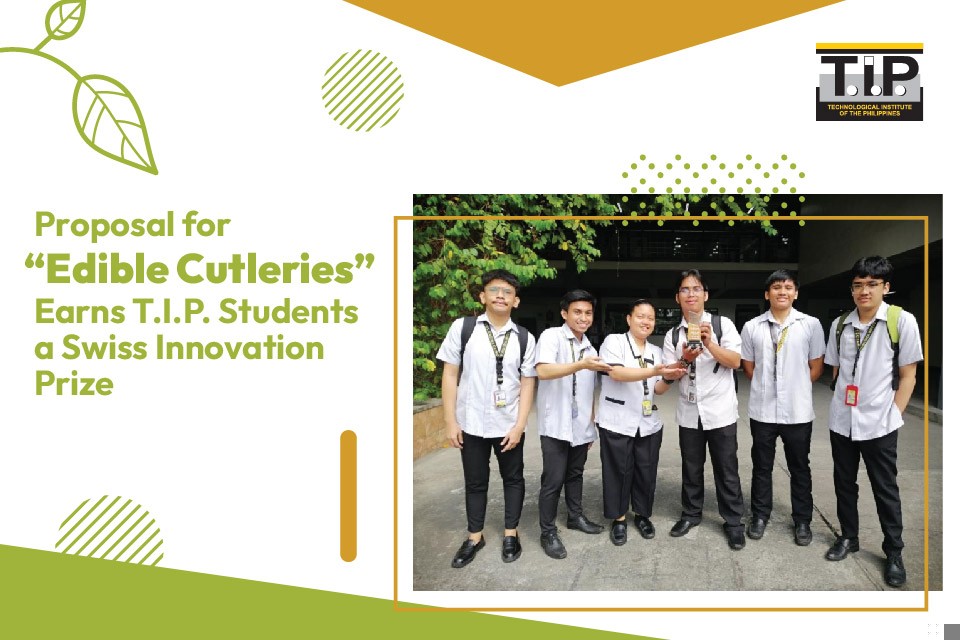
Proposal for “Edible Cutleries” Earns T.I.P. Students a Swiss Innovation Prize
Six aspiring engineers from the Technological Institute of the Philippines (T.I.P.) Quezon City recently won third place in the 2023 Swiss Innovation Prize “Sustainability” category for pitching “edible cutleries” as a viable solution against plastic pollution.
Inspired by eco-friendly materials already being produced in other countries, the students collectively known as “Edgetec” submitted a research paper, exploring the possibility of turning flour into consumable utensils that could potentially replace flatware made of single-use plastics.
Team leader Stanley del Rosario, a fourth year civil engineering major, said they focused on trying to reduce plastic waste upon learning of its terrible impact on the environment. The pollution is linked to a number of diseases and deaths of humans and marine biodiversity.
“With a simple product like ‘edible cutleries,’ we believe it can be a sustainable solution to lessen our need for single-use plastics… It won’t cause a problem to the community, especially for marine animals, because even if they ingest it, it is safe,” Del Rosario explained.
Other students who worked on the project include Elyza Marielle Camiguing and Amiel Salvania (3rd Year, Electronics Engineering), Emmanuelle Dave Santos and Faron Jabez Nonan (2nd Year, Computer Engineering), and John Paul Fernandez (4th Year, Civil Engineering).
The paper titled “Edible Cutleries with Biodegradable Packaging as an Alternative to Single-Used Plastics” was part of their coursework for their Tech 101 Engineering and Entrepreneurship class under Assistant Professor James Paul Menina from the College of Business Education.
Del Rosario said one of their goals in pursuing the topic is to raise awareness on the harmful effects of plastic pollution. Citing data from Plastic Bank, the team noted that the Philippines is the leading contributor of plastics in the ocean despite not being its biggest producer.
“We don’t have the discipline to dispose and segregate our plastic products properly. The Philippines doesn’t [even] have a strong and concrete Waste Management Plan. All these things need to be addressed because it is putting our future generations in danger,” he added.
The team worked on the project for two months and submitted it for competition at the 2023 Swiss Innovation Prize last September. It was adjudged Top 3 in the “Sustainability” category by a panel of six judges out of 150 entries from students and professionals across the country.
The Embassy of Switzerland in the Philippines launched and organized the competition in partnership with the Swiss Cultural Fund and the Swiss Chamber of Commerce to support “new ideas that have the potential to drive economic growth and improve society.”
Del Rosario and Camiguing represented T.I.P. Quezon City during the final stages of the pitching competition held last November 22-24, 2023. They accepted a trophy and P30,000 cash prize during the awards ceremony held on the last day at the Makati Diamond Residences.
As finalists, both students were also rewarded with site visits to various participating Swiss companies and non-profit organizations, as well as the official residence of the Swiss Ambassador to the Philippines Dr. Nicolas Brühl in Makati City, during the three-day activity.
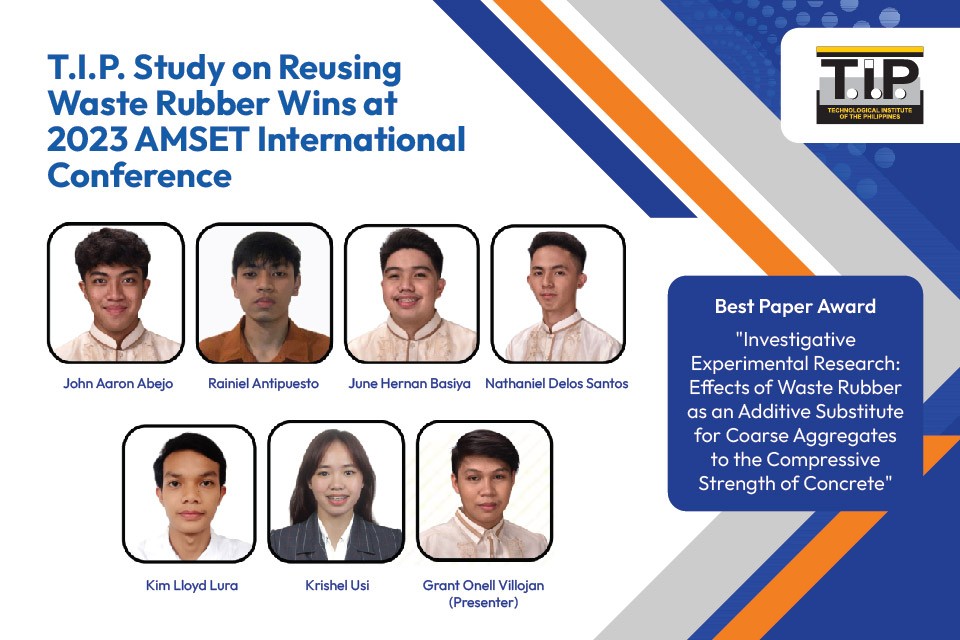
T.I.P. Study on Reusing Waste Rubber Wins at 2023 AMSET International Conference
An experimental research that seeks to address the problem of waste rubber disposal earned recognition for a team of junior Technological Institute of the Philippines (T.I.P.) Quezon City civil engineering students following a recent gathering of experts in Selangor, Malaysia.
The study explored the “effects of waste rubber as an additive substitute for coarse aggregates” in concrete mix. It was among the “Best Papers” submitted in the 2023 Advanced Materials and Sustainable Energy Technologies (AMSET) international conference hosted by Sunway University.
Grant Onell Villojan presented their findings in-person on behalf of his classmates and co-authors namely John Aaron Abejo, Rainiel Engelhart Antipuesto, June Hernan Basiya, Nathaniel Delos Santos, Kim Lloyd Lura, Krishel Usi, and research adviser Engr. Juland Padilla.
Their investigation revealed that using rubber as a coarse aggregate in concrete reduces its “compressive strength,” or the capacity of the building material to withstand loads. “Our conclusion is that rubber does not mix well with cement,” Villojan said.
“This is because rubber has distinct properties and does not chemically react with cementitious components during the hydration process. As a result, the rubber-concrete mixture has low adhesion and bonding,” the team noted in their abstract.
Villojan said they appreciate the citation they received from AMSET, and took note of the advice of the panelists who evaluated their research, one of them is a concrete specialist himself. The team is now hoping to improve their study within the same framework.
“We are thinking of the ideal ratio for the rubber mixture, so the pavement will not break down easily once the materials are applied to increase its coefficient of friction,” Villojan said. This will enable their experiment to pass a skid resistance evaluation once it is tested for human activity.
Sunway University received a total of 146 paper submissions for the 2023 AMSET held last October 30-31, 2023 in its Kuala Lumpur campus. Of this figure, 84 was shortlisted for presentations, including 14 from T.I.P. Manila and Quezon City.
According to Dr. Therese May G. Alejandrino, Director of the Technopreneurship and Collaborative Applied Research (TechnoCoRe) thrust, T.I.P. is engaging in these international conferences to ramp up its overall research agenda in the area of sustainable development.
The School of Engineering and Research Center for Nanomaterials and Energy Technology (RCNMET) of Sunway University spearheaded the two-day conference with T.I.P. as one of its co-organizers.
The event was part of the ongoing partnership between the two higher education institutions following the 2021 signing of a memorandum of understanding for the International Research Networks grant scheme.
Collaborating with Sunway University and RCNMET for the 2023 AMSET international conference was a T.I.P. initiative through its International Relations Office in coordination with TechnoCoRe Catalyst.
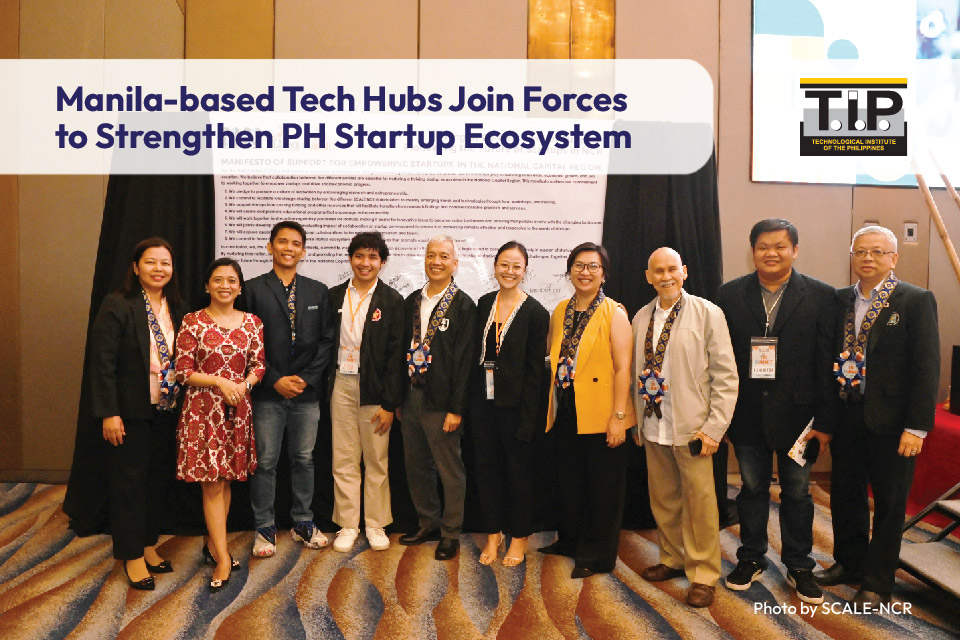
Manila-based Tech Hubs Join Forces to Strengthen PH Startup Ecosystem
Academic institutions, public and private sector organizations, and representatives from local government units (LGUs) in the National Capital Region (NCR) recently formed a consortium to boost the Philippine startup ecosystem through technology business incubators (TBI).
This developed following a memorandum of understanding (MOU) and manifesto of support signed between the parties during the NCR TBI Summit held last October 4 and 5, 2023 at Novotel Manila in Araneta City, Cubao, Quezon City.
The Strategic and Collaborative Alliance for Leveraging the Ecosystem of Startups (SCALE) NCR–the TBI consortium funded and supported by the Department of Science and Technology (DOST)–initiated the undertaking with the Technological Institute of the Philippines (T.I.P.) through its Nurture Innovation Technology Revolution Office (NITRO) serving as project lead.
The manifesto outlined several commitments among 30 signatories, including fostering a culture of innovation, knowledge sharing between the stakeholders, granting access to funds and resources for startups, and creating educational programs that encourage entrepreneurship.
Members of the consortium also agreed to work together to streamline regulatory processes for startups, develop frameworks for evaluating the impact of their collaboration, explore opportunities for international cooperation, and promote an inclusive and diverse ecosystem.
“By nurturing innovation, sharing knowledge, and providing the necessary resources, we aim to drive economic growth, create jobs, and solve pressing global challenges,” part of the SCALE NCR manifesto read.
The two-day summit gathered ranking officials from higher education institutions (HEIs) that already have existing TBIs in support of the DOST’s call to provide an enabling environment for innovation and technopreneurship.
In her keynote address, DOST-NCR Regional Director Engr. Romelen Tresvalles acknowledged the critical role that educators play in raising socially responsible individuals, especially those who aspire to build their own economically viable and problem-solving startups in the future.
“We recognize that establishing an enterprise that is technology-based is another level of challenge, and with the TBIs around, it eases the burden of our technopreneurs to find the path towards entrepreneurial success,” she said.
The Philippines is currently ranked at 59th in the 2023 Global Startup Ecosystem Index of research center StartupBlink. It has five cities in the index with Manila on top–ranked 95th globally–buoyed by its thriving financial technology (fintech) sector.
With this development, the DOST Philippine Council for Industry, Energy and Emerging Technology Research and Development (PCIEERD) encouraged SCALE NCR to replicate its success in other regions as well in terms of attracting investments and generating revenues.
“It boils down to the quality and attractiveness of the startup… There is an urgent need for all of us to reinforce startup developments in the region. That is our job as part of the ecosystem,” said DOST-PCIEERD Research Information and Technology Transfer Division Chief Russell Pili.
Also present were representatives from the Department of Trade and Industry, Department of Information and Communications Technology, National Innovation Council, Metro Manila Development Authority/Regional Development Council-NCR, among others.
They conducted learning sessions on how to access funding and investment opportunities, as well as navigate the intricate policies and processes of national government agencies, when it comes to establishing startup businesses.
Representatives from the investment offices of Quezon and Pasig cities, meanwhile, introduced summit attendees to the startup programs of their respective LGUs. Other speakers addressed the prevailing challenges for entrepreneurs amid an evolving business landscape.
Non-profit organizations such as Philippine Development (PhilDev) and IdeaSpace Foundations, alongside investors and accelerators, shared their pieces of advice and winning strategies to ensure the success of startup ventures in different fireside chats.
The last day of the summit featured different startup founders in the spotlight, pitching their enterprises to all interested investors, including DALA Smart Lockbox of T.I.P. Manila Assistant Professor Engr. Jennalyn Mindoro.
Vice President for Academic Affairs Dr. Cynthia Llanes signed the SCALE NCR MOU on behalf of T.I.P. together with dignitaries from other participating HEIs and TBIs including Adamson University (AdU), Mapua University, University of the Philippines-Diliman (UPD), University of Santo Tomas (UST), Miriam College (MC), De La Salle University (DLSU) Animo Labs Foundation, Inc., and IdeaSpace Foundation, Inc.
“We are here to be a force of unity, innovation, and growth... Together, we can help SCALE NCR be a beacon for startups and create a fertile ground for new ideas and solutions,” said Engr. Shearyl Arenas, TBI Manager for T.I.P. NITRO and lead convenor of the summit.
SCALE NCR involves the following DOST-funded TBIs: T.I.P. NITRO, DLSU Animo Labs Foundation, Inc., UST TOMASInno Center, Mapua Think and Tinker Laboratory, AdU Neo Science and Technology Incubation Center (NEST), UPD UPSCALE Innovation Hub, MC Technology Business Incubator, and QBO Innovation Hub.

T.I.P. Enters Top 300 in 2024 PH ‘Best Employers’ List
The Technological Institute of the Philippines (T.I.P.) made it to the Top 300 list of 2024 ‘Best Employers’ in the country, ranking at 152, according to a recent independent survey conducted by market research company Statista for the Philippine Daily Inquirer (PDI).
T.I.P. was grouped in the education industry with a total score of 8.29. It joined 15 other reputable universities and colleges in the list. The results were based on the responses of 16,000 employees who participated in the study between May to June 2023.
“This accomplishment is not only a source of pride for our organization, but it also symbolizes our mutual trust and confidence,” said T.I.P. President Dr. Elizabeth Quirino-Lahoz in a memo released to the school community upon the publication of the list.
In a separate statement, T.I.P. Senior Vice President Angelo Lahoz also welcomed this development. “Our contribution is in producing Filipinos with the hearts and minds towards lifelong learning,” he said.
“T.I.P. is constantly on the lookout for dynamic faculty and employees, who embody constructivist thinking; who want to be part of molding more Filipinos into effective problem-solvers for the new challenging hyper-global age we are facing,” Mr. Lahoz added.
The official list was made public last October 25, 2023 on the print and website editions of PDI. It is part of the newspaper’s “What Works at Work” special report, dedicated to delivering comprehensive insights and analysis on the ‘Best Employers’ initiative.
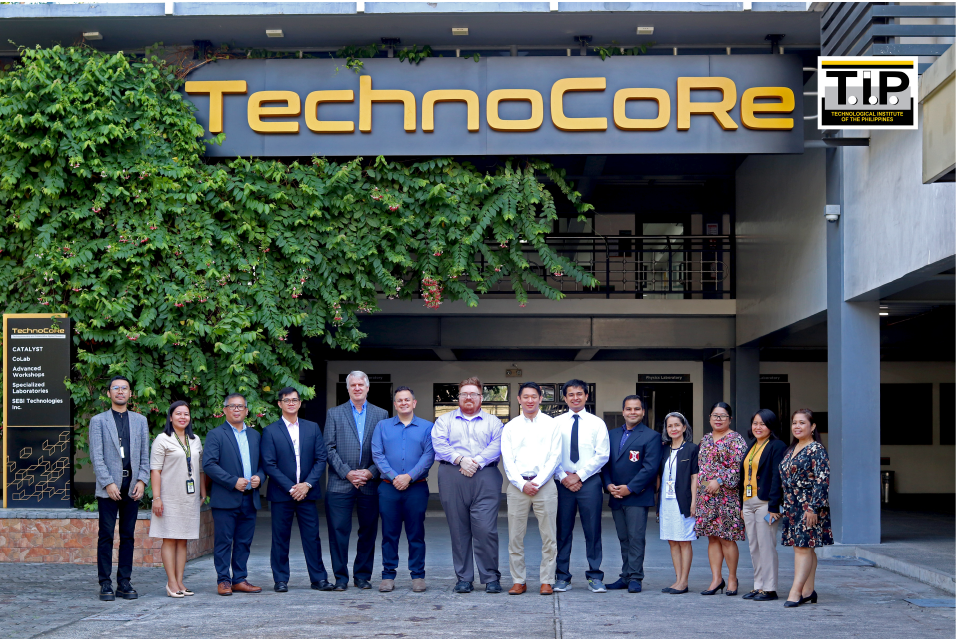
T.I.P. Teams Up with William Davidson Institute for Tech Commercialization
The Technological Institute of the Philippines (T.I.P.) has engaged the services of William Davidson Institute (WDI) at the University of Michigan (UM) to develop a strategic roadmap for commercializing T.I.P. technologies produced through funded research and special projects.
The commercialization plan will guide T.I.P. researchers in their initiatives along technology transfer. As a component of this partnership, a WDI-UM Multidisciplinary Action Project (MAP) team visited the T.I.P. campuses in Quezon City and Manila from September 18 to 22, 2023.
The collaboration seeks to assess the readiness of various externally funded T.I.P. technologies and intellectual properties, and obtain economic value from them down the road through licensing, startup ventures, or corporate spinoffs.
This will be a six-month project between the WDI and T.I.P. The Ann Arbor, Michigan-based organization is expected to deliver a comprehensive report on the commercial viability of T.I.P. technologies and how these can be marketed moving forward.
“We’re talking about taking ideas that come out of the industry or out of an academic institution and making them progress to the point that they can end up in the customers’ hands,” said WDI president Dr. Paul Clyde.
This entails a multidisciplinary approach. Hence, there is a need to strengthen the synergy among the engineering and business education departments, the legal consultants of T.I.P., and all the various units that support the aforementioned objectives.
“We need to be prepared for the fact that most ideas that come up are likely to fail… But when you combine it with educational opportunities, it’s not a failure… This is part of a longer journey between T.I.P. and the William Davidson Institute,” Dr. Clyde noted.
Dr. Clyde conducted learning sessions for T.I.P. Quezon City and Manila faculty researchers during the one-week visit in the Philippines. The MAP team also held discussions with educators and industry partners to conduct market research on two potential business ideas.
"Getting to know the originators of technologies and the resources at T.I.P. TechnoCoRe gave us a good launching point for this longer term collaboration with WDI,” the MAP team said.
T.I.P. TechnoCoRe director Dr. Therese May Alejandrino said engaging WDI-UM and its MAP team in this project offers a necessary “outsiders’ perspective” for T.I.P. to evaluate its existing structures and practices and how those may be improved further through a tailored commercialization plan.
“We always have to be anchored on T.I.P.’s vision of ensuring a better life for the Filipinos. We hope that as we firm up our commercialization roadmap, in collaboration with WDI and other stakeholders, we will ensure that T.I.P. technologies benefit the Filipino communities,” she added.
The WDI MAP team included Dr. Niral Shah (President, N.S. Surgical Professional Corporation), Mr. Jason Kovacs (Head of Theater, Fever), Mr. Patrick O’Sullivan (Product Manager, Emerson Electric), Mr. Matthew Stone (Chief Executive Officer, Pathless Productions), and Mr. Aditya Sridhar (Software Development Manager, Amazon). All are Master of Business Administration candidates at the UM-Ann Arbor.
***
IN PHOTO (L-R): Mr. Mandy Taller Bravo (International Relations and Linkages Officer, T.I.P), Engr. Shearyl Arenas (Technology Business Incubator Program Manager/Technopreneurship Coordinator, T.I.P.), Dr. Frank Alejandrino (Vice President for Student Affairs, T.I.P.), Dr. Conrado Navalta (Vice President for Quality Management & Strategic Initiatives, T.I.P.), Dr. Paul Clyde (President, WDI), MAP Team Members Mr. Jason Kovacs, Mr. Matthew Stone, Mr. Patrick O’Sullivan, Mr. Aditya Sridhar, and Dr. Niral Shah; Dr. Elizabeth Pader (Vice President for Administration, T.I.P.), Dr. Therese May Alejandrino (Director, T.I.P. TechnoCoRe), Dr. Jennifer Enriquez (Innovation Technology Support Unit Manager/Assistant Technopreneurship Coordinator, T.I.P.), and Engr. Annah Sibal (Senior Project Manager, T.I.P. TechnoCoRe).
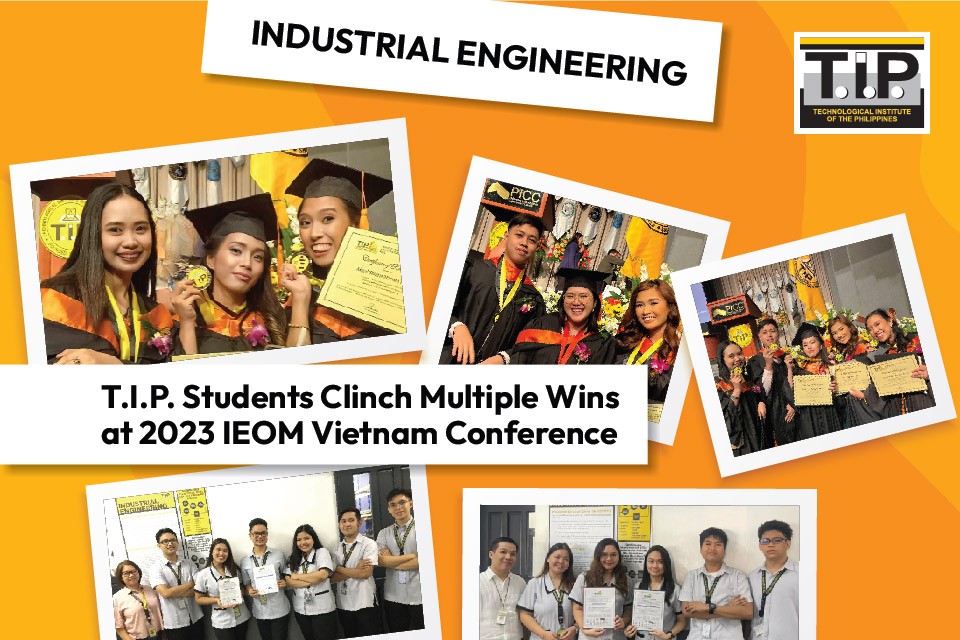
T.I.P. Students Clinch Multiple Wins at 2023 IEOM Vietnam Conference
Five teams represented both campuses of the Technological Institute of the Philippines (T.I.P.) at the recent 4th Asia Pacific Conference on Industrial Engineering Operations and Management (IEOM) and prevailed in their respective competitions.
Leading the list of podium finishers this year is the group who designed a technology-enabled service, where students may lease essential devices to their fellow learners at lower cost, so they would no longer have to buy them.
Fresh graduates Mary Jo Santiago, Christine Joy Olanosa, and Angel Shaine Martin presented this concept and called it “Helpy: A Mobile Application System for Engineering and Architecture Tools Rental Business.” It won first place in the Senior Design Project category.
“There are times when a specific tool is required for only a short period,” noted Santiago. Hence, their proposal tries to create an opportunity for some engineering and architecture students to earn extra cash for their school expenses by renting out resources at their disposal.
Another team composed of Thea Espinueva, Jhia Angelyck Mavy Cruz, and Vincent Matthew Labrador also placed third in the same competition with their project titled “Filtrar: A Canal Solid Waste Collector and Compactor Machine.”
This group created an innovative prototype using Arduino technology that can stand as an alternative solution to collect discarded materials in urban waterways. Espinueva said their project hopes to aid sanitation workers in addressing this perennial environmental problem.
Both groups are from T.I.P. Manila and worked with the guidance of Dr. Maria Teresa Mendoza. They also teamed up and collaborated with Engr. Janina Elyse Reyes in an academic paper that looked into the effectiveness of virtual work immersions for senior high school (SHS) graduates.
This particular study focused on the influence of remote working culture on a select number of SHS respondents when deciding which college program or career path to take. It earned them third place in the Undergraduate Student Paper category.
“It is important to consider the potential benefits of virtual work immersion, and the overall satisfaction level with the SHS program separately, as they may have different implications for the students' academic performance and career readiness,” Espinueva said of their findings.
Meanwhile, two teams from T.I.P. Quezon City likewise won in the Undergraduate Research competition. Engr. Jaypy Tenerife and his students took home second place for developing a food container with spoilage detector.
Jan Marielle Bidayan, Arjen Guila Cruz, John Rei Garchitorena, Erika Mae Ople, and Carl Joseph Quintana named their project “WasteNot.” It is a tech-enabled storage container that seeks to address issues related to food waste management and food safety.
Lastly, Engr. Ma. Teodora Gutierrez and her students–Mac Friedrich Dantes, Antonio Mari Garcia, Carlo Gonzalez, John Matthew Halog, Alliyah Jade Paguio, and Marinell Santos–claimed third place for their project that caters to the elderly and persons with disabilities (PWD).
The group submitted “Ergo Let,” which aims to ease the accessibility of senior citizens and PWDs to conventional public restrooms in Metro Manila. All participants come from the Industrial Engineering department of the T.I.P. College of Engineering and Architecture in both campuses.
The 4th Asia Pacific Conference on IEOM was held in a hybrid setup from September 12 to 14, 2023 in Ho Chi Minh City, Vietnam. The annual program fosters networking and collaboration opportunities among student and professional participants in the field of industrial engineering.
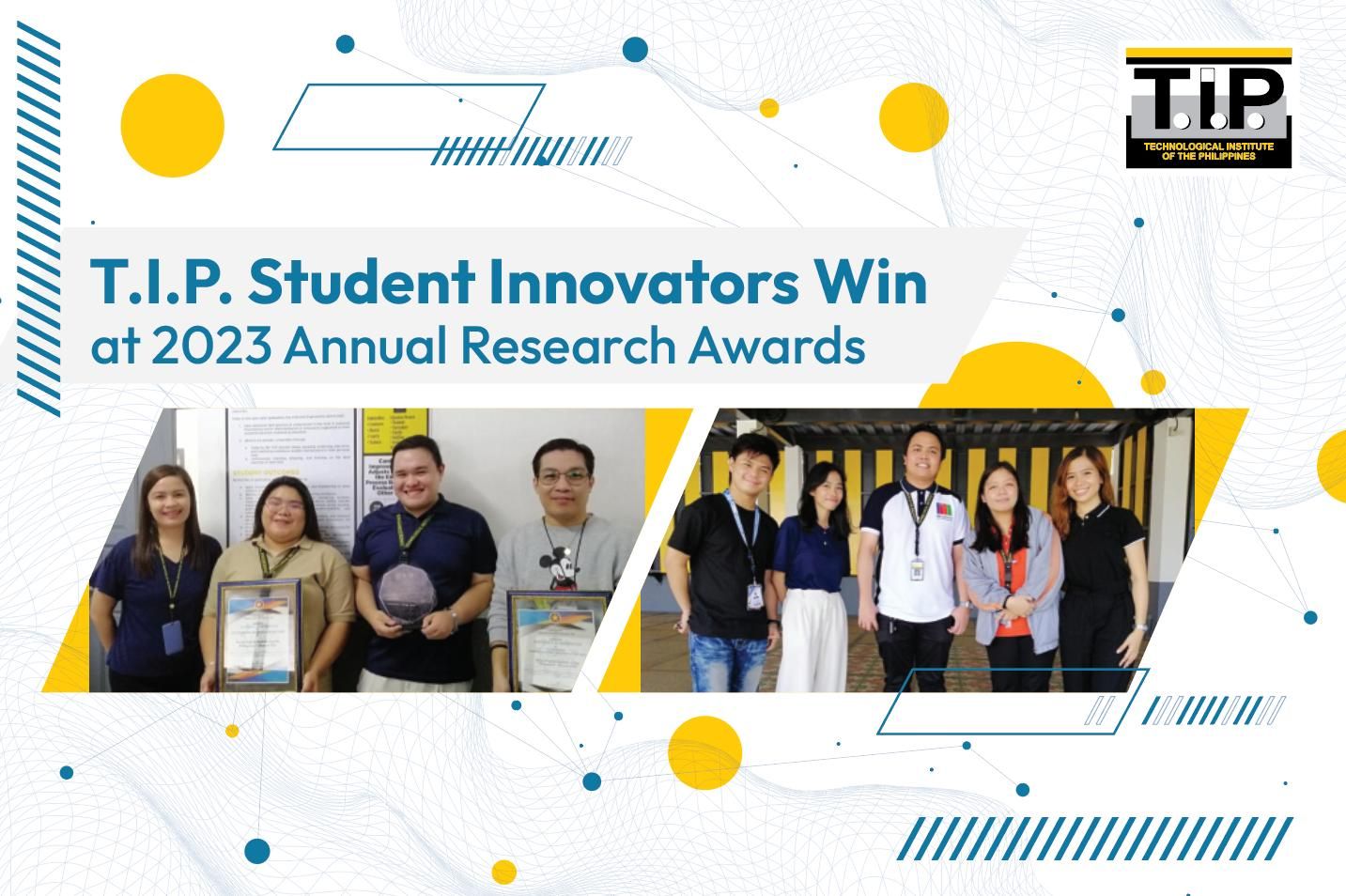
T.I.P. Student Innovators Win at 2023 Annual Research Awards
Two teams of future engineers from the Technological Institute of the Philippines (T.I.P.) Quezon City and Manila were recognized for their innovative projects at the recent 2023 Annual Research Awards (ARAW) hosted by the Polytechnic University of the Philippines (PUP).
Six incoming T.I.P. QC industrial engineering (IE) seniors led by Allen Serrano and Francine Daphne Carigma earned the Outstanding Research of the Year award for their ‘HeatFlask’ project, which also won the Best Commercialization Research category.
‘HeatFlask’ is a self-heating container for people who are looking for a safe and convenient way to warm up canned food and drinks in the absence of a stove or microwave oven. It is made of stainless steel with a heat pack inside to facilitate the reheating process.
Serrano said the product was a result of their project feasibility study under adviser Engr. Jaypy Tenerife. Carigma, who is into the food packaging business, pitched the idea after she saw a Filipino startup adopt a similar approach using boxes.
“We just thought of other alternative methods to heat up food products and that is how we came up with ‘HeatFlask,’” said Carigma. The team left many rooms for improvement in terms of product design as it is currently limited to reheating canned goods.
Nevertheless, Tenerife is proud that the ARAW panelists saw merit in the project of his students. He credited it to his team’s “level of commitment” in developing a good business model that emphasized the unique selling proposition of their prototype.
“It (HeatFlask) really showed a lot of promise as a business concept. I think that became our edge compared to the rest of the entries,” Tenerife said. Other IE students involved in the project were Cyrdio Adrian Dela Peña, Irah Scott Naldoza, Jemuel Tan and Neriel John Villamor.
The 2023 ARAW awards welcomed 97 submissions from different schools nationwide with the theme “Resiliency and Sustainability in Times of Post-Pandemic: The Commitment of Serving the Country through Engineering, Science, and Technology.”
A group of graduating T.I.P. Manila civil engineering students were also named first runner-up in the Best Scientific Research category of the competition for presenting a viable strategy to protect the structural integrity of buildings.
Batchmates Honey Lyn Gutierrez, Annedrei Figueroa, Jamniel Danish Gonzales, and Russel Veraña submitted their research titled “Enhancing the Seismic Resilience of 42-Story Reinforced Concrete Structure with Fluid Viscous Damper System Using Modal Decomposition Method.”
The study focused on developing a cost-effective approach to install energy dissipating devices in high-rise buildings. This also served as their capstone project under faculty member and adviser Engr. Dustin Glenn Cuevas.
Fluid viscous dampers work by absorbing vibrations or seismic waves from earthquakes to mitigate, if not eliminate, cracks and fissures that may otherwise result in significant property damage. This system is quite expensive depending on the scale of the construction project.
“In structural engineering, we refer to it as the ‘optimal damper placement’ problem, which many structural engineers are still trying to solve today,” said Cuevas. There are several ways to address this, but the team adopted the modal decomposition method because “it is more efficient and you get the same performance.”
Figueroa attributed their success to the relevance of their research. Gutierrez added they are grateful for the guidance of their adviser, which enabled them to perform well during the competition. All four T.I.P. Manila students will be graduating this September 5, 2023.
The 14th ARAW awards was held onsite last July 25, 2023 at the PUP campus in Santa Mesa, Manila. It was organized in collaboration with the Department of Science and Technology-Technology Application and Promotion Institute (DOST-TAPI).
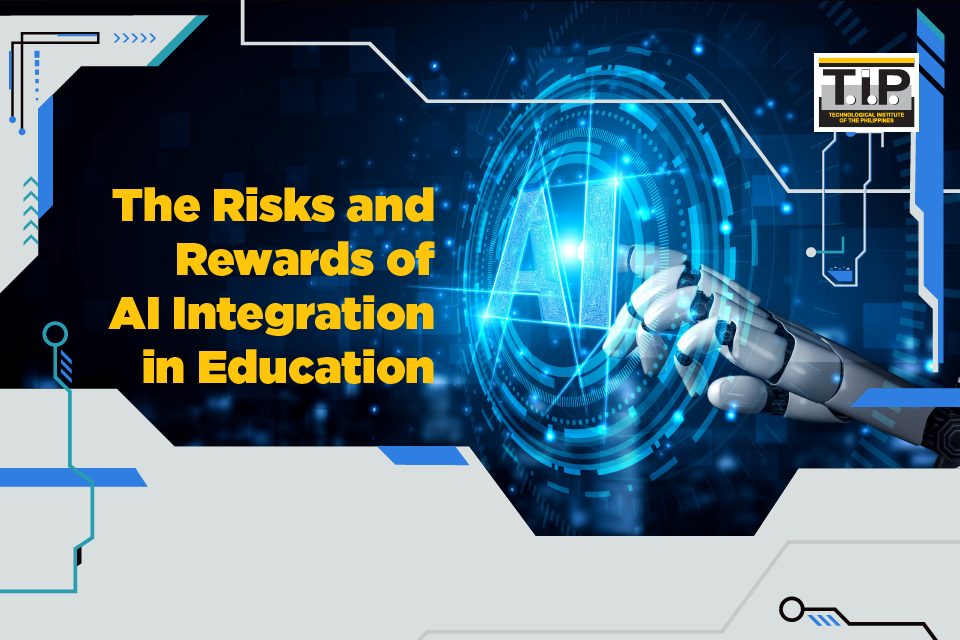
The Risks and Rewards of AI Integration in Education
Students should not be deprived of using artificial intelligence (AI) to enhance their learning experiences, but faculty members must establish clear boundaries anchored on ethical considerations when integrating it into delivering quality education.
This was the position of Dr. Elmer-Rico Mojica, associate professor at the Pace University in New York, during his talk on the risks and benefits of generative AI tools in teaching and research hosted by the Technological Institute of the Philippines (T.I.P.) last July 27, 2023.
The webinar entitled “Artificial Intelligence in Teaching and Research: Boon or Bane?” is another product of an ongoing partnership between T.I.P. and the Philippine-American Academy of Science and Engineering (PAASE) of which the speaker is an active member.
The longtime chemistry professor out of University of the Philippines Los Baños shared some strategies on working with this technology based on his experience when he tried using software applications, such as ChatGPT and Google Bard, in his own teaching and research practices.
Recognizing the inevitable impact of AI on education, Dr. Mojica advised school executives and academicians to lay down the ground rules when incorporating these large language model chatbots in generating outputs for teachers and learners.
“Since this is a discipline-based decision at the department level, teachers should tell their students what is acceptable or not, and the students should know it. That’s why we encourage them (educators) to put it (terms and conditions of AI use) in the syllabus,” he said.
Dr. Mojica also emphasized the importance of promoting academic integrity among students from the start, so they can become responsible users of technology and be well informed about the consequences of its misuse.
Citing his personal experience and recent research, he said the penchant for using AI tools may actually stem from the initiative of students to learn more and produce better outputs rather than to cheat, as most teachers fear.
Nevertheless, Dr. Mojica acknowledged the necessity of putting guardrails against the risks attached to ChatGPT and other generative AI applications, considering their limited sources of information. This is where expertise on the subject matter becomes indispensable for educators.
When teachers recognize ambiguities or questionable information in student submissions, then the students may be asked to conduct additional research using traditional sources of information like books and journals, according to the Pace University mentor.
Although his experience in using chatbots to generate ideas and other prompts for writing and research has been positive, Dr. Mojica is aware that AI can sometimes “hallucinate and give you answers that don’t exist.” Critical thinking, therefore, remains crucial when accessing such tools.
The lecturer, meanwhile, backs the use of AI-powered resources to ease the workload of teachers particularly when it comes to grading students’ outputs or automating curriculum design. This saves them time while keeping them abreast of useful technologies.
Allaying fears of many who see AI as a threat, Dr. Mojica echoes the argument that ‘AI will not replace humans, but the people who use it will.’ Regardless, gray areas such as the sinister rise of deepfakes and other manipulative tools of mass disinformation must be addressed properly.
“If you don’t know which one is true, you will believe anything generated by these AI tools. To prevent this kind of misinformation, I think human expertise and judgment are needed,” he said. Consequently, it is essential to constantly improve our digital literacy skills.
Dr. Mojica also mentioned that personal interaction between students and teachers must remain as much as possible despite the proliferation of AI and all kinds of machine learning technologies because “personal intervention is the best way to deal with the students.”
“AI like ChatGPT and Google Bard are just tools that can help us improve the teaching, learning and research writing process. We should ensure that the rise of AI does not get out of hand,” he concluded.

43 OSY Receive T.I.P. Training Through ‘Kabataang NEGOSYANTE’ Project
A total of 43 out-of-school youths (OSY) completed a months-long entrepreneurial training from the Technological Institute of the Philippines (T.I.P.) Quezon City at the culmination of its “Kabataang NEGOSYANTE” project last June 30, 2023.
The project was accomplished through a United States Agency for International Development (USAID) grant under its Opportunity 2.0 program, which was designed to provide second-chance education for Filipino OSY in at least 15 cities across the country.
NEGOSYANTE stands for ‘Navigating, Engaging, and Gearing Out-of-School Youths As New Technology Entrepreneurs.’ Its objective was to teach underprivileged children how to use available technologies that can help them earn possible livelihood opportunities.
Under the mentorship of T.I.P. faculty members, participants were provided with technical skills, business training, and values formation to help them set up their own online businesses through social media and other internet-based applications.
Dr. David Hall, Chief of Party for the USAID Opportunity 2.0 program and the Education Development Center (EDC), commended T.I.P. for merging its commitment to entrepreneurship with its responsibility to the local community through the “Kabataang NEGOSYANTE” project.
“What we’re trying to do is to strengthen systems to help out-of-school youth in the Philippines back into education and employment. And perhaps, most significantly with this grant, into self-employment,” Dr. Hall said in a video message played at the closing ceremony.
The OSY learners belong to the communities of Barangays Batasan Hills, Commonwealth and Holy Spirit in Quezon City. The outreach program started in June 2022 and ran for about a year. It accommodated a total of 76 learners, 43 of whom were able to complete the training modules.
All participants were honored with certificates and special awards. Cash prizes were also handed out for the top teams that presented best outputs. T.I.P. President Dr. Elizabeth Quirino-Lahoz also graced the concluding activity along with other school executives.
“The collective journey continues, and we should not doubt that together, we will make a lasting and positive impact on the world,” said Dr. Angeles de Guzman, Dean of T.I.P. Quezon City College of Business Education and project manager for “Kabataang NEGOSYANTE.”
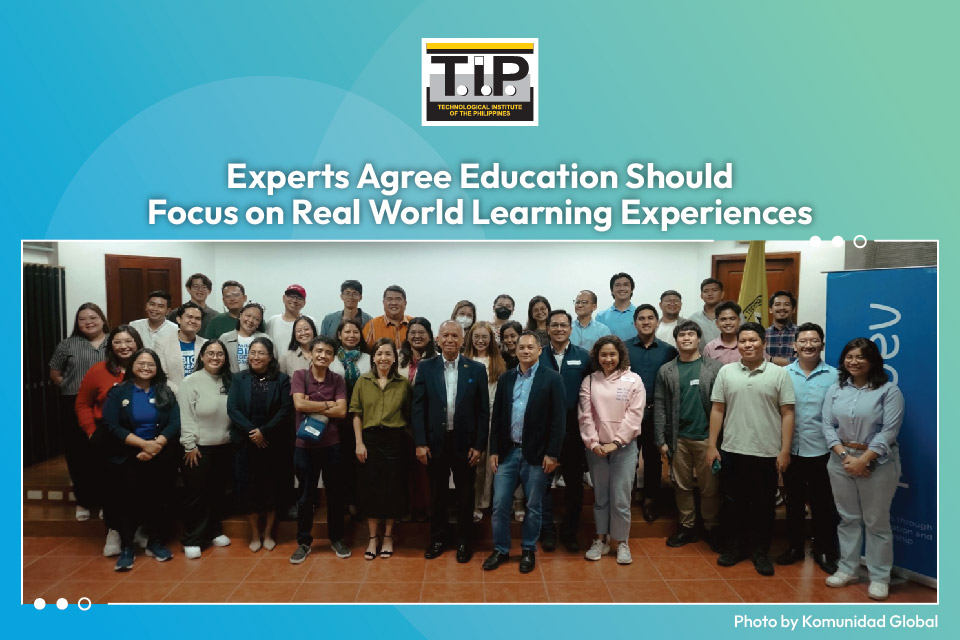
Experts Agree Education Should Focus on Real World Learning Experiences
At the rate technology is changing the world these days, Filipino educators must go beyond knowledge transmission and lean more towards immersing students in real world job experiences to better prepare them with the most essential and relevant skills for the future.
This was the consensus among a panel of thought leaders in a recent forum organized by startup company Komunidad Global at the Technological Institute of the Philippines (T.I.P.) in Quezon City with aspiring entrepreneurs and academic community members in attendance.
Seasoned educator Paolo Josef Blando of the National Teachers College (NTC) believes it is high time for professors facilitating classroom discussions in higher education institutions (HEIs) to step out of being “a sage on the stage” and serve instead as a “guide at the side” for learners.
“Because our emphasis is on learning experience and no longer as (being) just transmitters of the content. It’s a difficult task because not a lot of teachers are comfortable moving away from their comfort zone,” said Blando, the program and partnership development officer of NTC.
This entails building a much stronger working relationship with the business sector, which will always be in need of highly skilled, employable graduates, according to Dr. Danilo Lachica, president of the Semiconductor and Electronics Industries in the Philippines, Inc. (SEIPI).
“It’s gonna be hard to imagine how a professor can teach a particular technology subject without firsthand experience. So, you gotta give them that experience by giving them the opportunity to immerse and, conversely, students in technology courses (as well),” he said.
Lachica has been actively working on this thrust in his capacity as Chief of Party for the Advanced Manufacturing Workforce Development Alliance program of the United States Agency for International Development (USAID) in partnership with the Unilab Foundation.
At SEIPI, which T.I.P. is a member of along with 44 other universities, companies engage with different HEIs to identify each other’s needs and find ways to bridge the gap between them, the industry leader explained.
Lachica noted the importance of upskilling the workforce, particularly when it comes to emerging disruptive technologies, such as artificial intelligence and the like, which have been shaking up a lot of industries at present over their serious potential to take away jobs from people.
While this is true to some extent, the SEIPI chief reckons that a technology-driven future does not have to be viewed as bleak. “The nature of the job will evolve according to the needs of the environment, but I don’t think jobs will disappear. We just need to upskill the workers,” he said.
Komunidad Global founder and chief executive officer Felix Ayque echoed the statements of his co-panelists, adding it is likewise crucial to develop among future graduates that entrepreneurial mindset, so they can have the audacity to build their own problem-solving startups, too.
Ayque mentioned that launching a startup these days is no longer limited to tech services, citing the case of other unicorn companies in Southeast Asia, which managed to acquire billion dollar valuation because of their innovative solutions to existing problems, especially climate change.
T.I.P. hosted the Komunidad Xchange forum titled “Unlocking Potential: Future Skills and Preparing Future Innovators” last July 12, 2023, as part of its commitment to produce graduates who will be ready to take on the challenges of an ever-changing workplace.
The predominantly engineering college has been engaged in various industry-academe partnerships and other government-sponsored projects since 2017 through its Technopreneurship and Collaborative Applied Research (TechnoCoRe) thrust.
The Komunidad forum was held in collaboration with the Philippine Development Foundation (PhilDev), T.I.P. Nurture Innovation Technology Revolution Office (NITRO), Earth Shaker Philippines, and SCALE NCR organization.

T.I.P., DOST Venture Yield E-Commerce Solution With DALA Smart Lockbox
Filipino engineers from the Technological Institute of the Philippines (T.I.P.) aim to break into the electronic parcel locker market with the DALA Smart Lockbox, a new system designed to optimize and economize last mile logistics for the e-commerce industry.
The project was developed in partnership with the Department of Science and Technology (DOST) upon endorsement of its Philippine Council for Industry, Energy and Emerging Technology Research and Development (PCIEERD).
DALA Smart Lockbox offers an alternative drop-off and collection point for retailers and customers to facilitate safe, secure and seamless delivery of items purchased online. It comes with storage units of different sizes powered by a software program accessible for its users.
A team of engineers and faculty researchers from the T.I.P. Manila Computer Engineering and Electrical Engineering departments collaborated on the project under the leadership of assistant professor Engr. Jennalyn Mindoro.
Mindoro conceived of a Philippine-made smart parcel locker during her Tech101 training in 2018 at the UPSCALE Innovation Hub in University of the Philippines-Diliman. Project development began in 2021 after securing funding from DOST. It took about one and a half years to complete.
DOST earmarked roughly P5-million to bankroll the project under its Collaborative Research and Development to Leverage Philippine Economy (CRADLE) program. Electrical equipment company ITRACK Solutions, Inc. was later on attached as an industry partner.
At the soft launch ceremony for the DALA Smart Lockbox held in T.I.P. Manila last May 31, 2023, DOST Undersecretary for Research and Development Dr. Leah J. Buendia said they found merit in its intention to solve logistical problems for online shopping stakeholders.
“With the booming e-commerce sector in the country, introducing a system that can adapt and customize with the Philippines’ payment ecosystem looks like a promising and strategic business model,” Buendia said in her keynote speech.
With the help of partners in the private sector, the DOST is banking on the potential of parcel lockers to reach mainstream use in the country through the DALA Smart Lockbox, especially for people who are often on-the-go or are cautious about giving away their personal information.
The DALA technology adds an element of efficiency and can also be used to protect important documents from unfortunate events and situations, according to DOST-PCIEERD executive director Dr. Enrico Paringit.
“The time lost in getting all these parcels somewhere by going through treacherous traffic is quality time lost for our family. Although lockers are not common to our country, we believe that this (technology) is coming in at a good time,” Paringit noted.
“As we start integrating and implementing this innovation in the real world, we have high hopes and expectations that DALA will be at the forefront of every individual’s online shopping experience,” the DOST-PCIEERD chief said.
T.I.P. Manila Vice President for Academic Affairs Dr. Rosalinda Valdepeñas was impressed by the functionality of the DALA Smart Lockbox system, as it streamlines the way we send and receive our parcels. She thanked DOST for always being a reliable partner in this R&D venture.
“The DALA project stands as a testament to our unwavering commitment to harnessing the potential of science and technology for the betterment of society,” added Dr. Marianne Yumul, Dean of the College of Engineering and Architecture at T.I.P. Manila.
After its successful soft launch, Mindoro said they are now preparing the smart lockbox system for field testing by connecting the DALA application programming interface (API) to an e-commerce platform. They will then enter into a licensing agreement with their industry partner.
Discussions are also ongoing with a Philippine-based digital logistics service innovation company regarding API integration. Once completed, the team shall begin the installation of the DALA Smart Lockbox system in public spaces such as malls, among other strategic locations.
The DALA Smart Lockbox project was delivered with the guidance of the Technopreneurship and Collaborative Applied Research (TechnoCoRe) thrust of T.I.P., which fosters stronger industry-academe partnerships in response to real-world challenges.
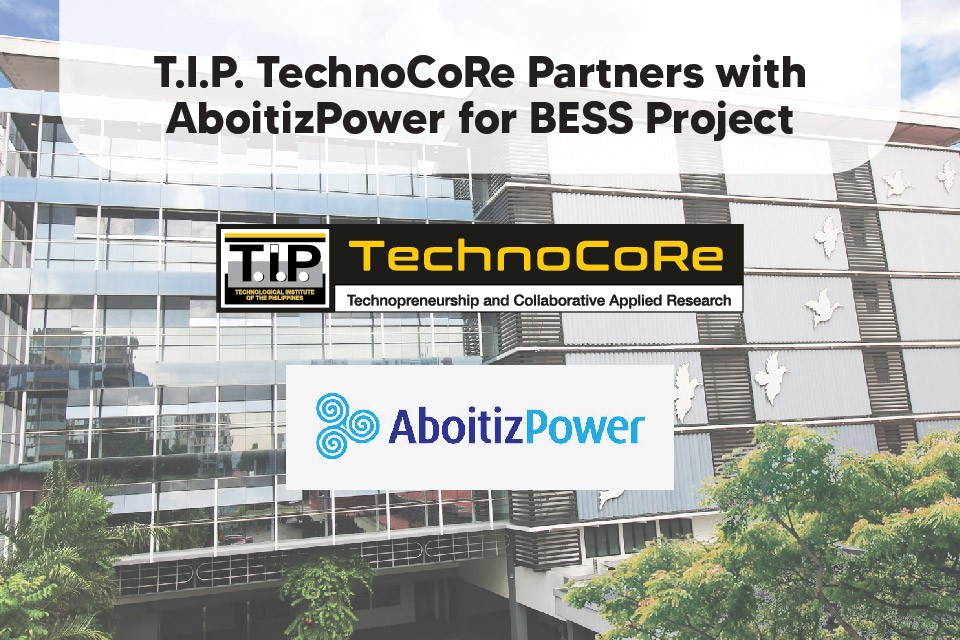
T.I.P. TechnoCoRe Partners with AboitizPower for BESS Project
The Technological Institute of the Philippines (T.I.P.) is working with Aboitiz Power Corporation (AboitizPower) to provide an environment for the small and large scale testing of one of its ongoing Battery Energy Storage System (BESS) projects.
The deal was initiated in April 2022 but was formalized only last January 16, 2023 by virtue of a research collaboration agreement signed between AboitizPower and T.I.P. through the latter’s Technopreneurship and Collaborative Applied Research (TechnoCoRe) thrust.
“This partnership enables us to help our nation make the most of its energy resources in a sustainable, rather than exploitative, manner that will support a corresponding economic upward transition,” said T.I.P. TechnoCoRe principal researcher Dr. Drandreb Earl Juanico.
BESS is a type of energy reserve facility that optimizes batteries to stockpile excess electricity during periods of oversupply from power generating plants or devices, so it can still be used by consumers later on.
It is part of the T.I.P. target deliverables for the Advanced Batteries Center, which is a joint venture with the University of the Philippines-Diliman and funded by the Department of Science and Technology (DOST) under its NICER (Niche Centers in the Region through R&D) program.
Research for the BESS project has already begun with a recent pilot study in an undisclosed location. Further studies are expected to accelerate soon after confirmatory tests reveal more insights into sustainable energy storage with readily accessible materials and technology.
The DOST-NICER Advanced Batteries Center seeks to capitalize on the potential of using batteries to boost the Philippines’ gradual shift towards renewable energy. T.I.P. engaged in the said program to develop its own battery storage technologies using its DC House project.
AboitizPower extended support to the initial phases of testing for the DC House by donating solar modules, charge controllers, and other materials to increase the amount of electricity collected through photovoltaic cells installed on the said facility. The next phase of the project will be a larger-scale application and testing of the technology, which will be done in parallel with the business case study for its possible commercialization.
AboitizPower Vice President for Innovation and Digital Transformation Chat Balita said she believes this partnership embodies the power of collaboration and innovation in pursuing sustainable energy solutions.
“Together with T.I.P., we aim to revolutionize energy storage systems, ensuring a greener and more energy-efficient future for our nation,” she added.

T.I.P. Lands in WURI Top 50 for Promoting Ethical Value, Fourth Industrial Revolution
The Technological Institute of the Philippines (T.I.P.) made it to Top 50 on its maiden participation in the 2023 World University Rankings for Innovation (WURI), after two of its projects were commended for their ethical value and relevance to the fourth industrial revolution.
T.I.P. ranked 41st in the WURI ethical value category for its “Project Ilawa: Clean Energy That Cleans” while its “A Virtual Tour to Cultural and Heritage Space of Corregidor Island in GPS-Based Augmented Reality” ranked 44th in the fourth industrial revolution category.
“It is an honor for T.I.P. to be recognized for the impact of its activities and programs that promote ethical values, as well as its innovative endeavors along the fourth industrial revolution,” said T.I.P. President Dr. Elizabeth Quirino-Lahoz.
The entries went through a blind peer review process and ranked based on their “innovativeness, implementability, and impact.” Overall, T.I.P. found itself in the WURI Global Top 200 Innovative Universities.
WURI evaluates the participating universities’ real contributions to society by highlighting their creative and innovative approaches to research and education, focusing on the following key issues: Industrial Application, Entrepreneurial Spirit, Ethical Value, Student Mobility and Openness, Crisis Management, and Fourth Industrial Revolution.
The 2023 WURI rankings were announced during the 3rd Annual Conference of the Hanseatic League of Universities (HLU) hosted by the Florida Gulf Coast University in Fort Myers, Florida, USA last May 17, 2023.
The WURI Conference 2023 is organized by the Institute for Policy and Strategy on National Competitiveness (IPSNC) and co-sponsored by four global institutions: the HLU with the Institute for International Policy Studies (IPS) of South Korea, The Taylor Institute at Franklin University Switzerland, and the United Nations Institute for Training and Research (UNITAR).

Electrical Engineering Topnotcher Credits Feat to ‘Faith, Flag, Focus’
Ranking fourth out of the 3,339 hopefuls in the April 2023 Electrical Engineering board exams has filled newly-registered Engr. Bernard Vic Senillo with an overwhelming sense of “joy and gratitude,” which he extended to God and the nation that helped him reach this milestone.
Senillo was a Department of Science and Technology (DOST) scholar, who graduated magna cum laude from the Technological Institute of the Philippines (T.I.P.) Quezon City in 2022. He wants to serve the country and pursue teaching, so he can help develop more future engineers.
“I am so grateful that God really answered my prayers. I feel happy because all my hardships and trials from college and up to the review period finally paid off,” said Senillo, who plans to take postgraduate studies in electrical engineering as soon as he lands a job.
Like other DOST scholars, Senillo is not entertaining thoughts of working abroad. He prefers to stay in the Philippines and contribute to its electrical engineering industry. Currently, the T.I.P. alumnus has been applying to local companies, where he can start a professional career.
“My first choice is to teach… But I want to finish my master’s degree first. My main goal in pursuing a career in the academe is to instill (in the minds of) students as early (as possible) that they should love the electrical engineering field,” Senillo added.
Should he receive an opportunity to work in the energy industry, the young engineer said one of the things he would like to improve on is the generation of electricity. He supports policy shifts towards renewable energy to cut power rates and achieve a “sustainable future.”
“To some, it (renewable energy) is unreliable for now, but through continuous research, we have the technology already, so we can do further studies. That’s why we have electrical engineers to help in improving (our) renewable energy (sector),” Senillo said.
The Leyte native has been a high achiever for much of his student life. He excelled not only in academics, but also during external school competitions. When asked to share some of his strategies to future licensure examinees, Senillo repeatedly mentioned the word “focus.”
One of the things he eliminated from his life when he was reviewing for the board exams was social media. Discipline is also something that he pointed out to keep himself motivated and reduce negative thoughts that led to feelings of self-doubt and anxiety.
“When you have the discipline, you will wake up each day and do your routine. You need to focus on your goal. Also, my advice to other students is they need to believe in themselves and they have to pray,” Senillo said.
Senillo encouraged aspiring engineers to keep practicing through their studies despite the struggles. He said they need to take the review process seriously because it will train them to solve problems “as fast as possible” on a consistent basis.
“Your dreams should be bigger than your fears. You need to stay focused, disciplined, pray… But, at the same time, enjoy and trust the process. Eventually, you will succeed,” the young engineer advised.
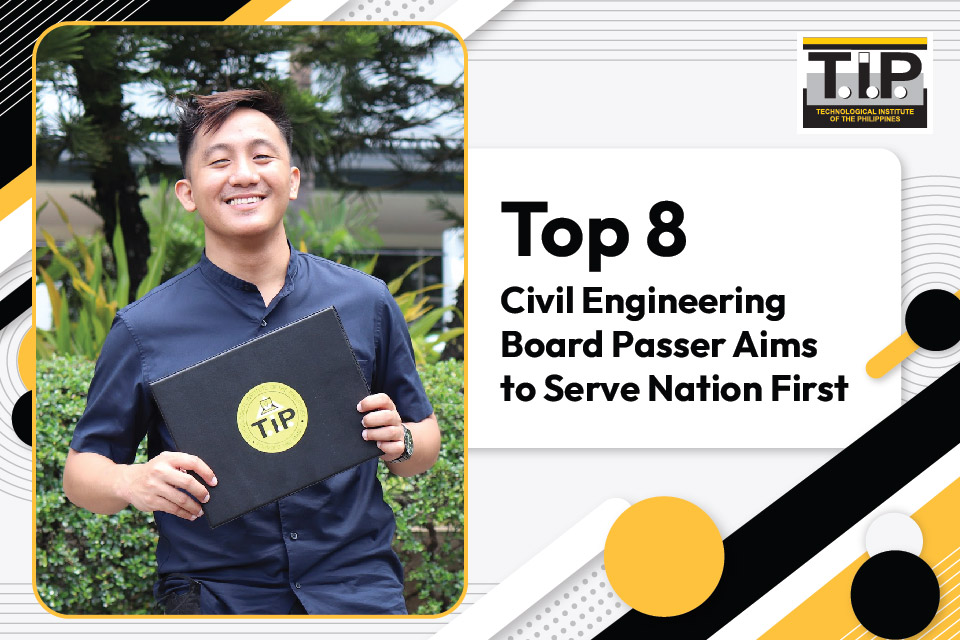
Top 8 Civil Engineering Board Passer Aims to Serve Nation First
Newly-licensed civil engineer and Technological Institute of the Philippines (T.I.P.) alumnus King Justine Guardario is bent on serving the country, after placing eighth out of the 5,887 hopefuls in the April 2023 Civil Engineering board examination.
“I told myself to give back first to those who helped me. I also want to keep training myself to be a good engineer in the field, continue learning, and to serve the community… I prefer to work for the Philippines,” said Guardario when asked of his initial plans after the results were announced.
Guardario was a scholar of the Department of Science and Technology (DOST) and graduated cum laude last year at T.I.P. Quezon City. He also spent his senior high school years in the same engineering college, which he credited for nurturing his love for math and science.
Landing in the Top 10 out of the thousands who took the recent licensure exam came as a welcome surprise for Guardario and his family. He said the news brought them “tears of joy.” The experience filled him with genuine happiness.
“I feel super grateful. At first, it was not sinking in because I really did not expect to become a topnotcher. I was just enjoying the review process,” he said. Guardario reviewed for the board exams for around six to seven months with two of his closest friends.
When asked if it was his childhood dream to become an engineer, the T.I.P. alumnus hesitated. He was interested in many fields, but eventually decided to pursue civil engineering. He chose to specialize in structural engineering because he enjoyed learning it more.
In college, Guardario was an active member of various student organizations and also taught his fellow students. He was part of online study group tutorials, teaching math, science and other engineering subjects. This made him consider the possibility of joining the academe as well.
“That’s one of the things I love to do, to teach and offer tutoring services, skills that I developed (with my mentors) in the Math and Physics departments,” said Guardario. He finds teaching as a great way to inspire people and share his knowledge with others.
His friends and fellow T.I.P.ians Lloyd Cebrero and Randel Nievera attested to his expertise. Nievera described Guardario as the most learned person in their group and thanked him for being a positive influence, which helped them ace the licensure exam, too.
“We really excelled because of our group studies… King is the most studious among us. His hard work just rubbed off on us, so to speak. I don’t study as hard as him, but his influence pushed us harder to pass the board exam,” Nievera said, echoing the thoughts of Cebrero.
Guardario’s advice to future licensure examinees is to “enjoy the process of learning” and give all their best during the test without succumbing to the pressure of it. “You really have to prepare for it and believe in yourself,” he underscored.

T.I.P. Pushes for Large Scale Application of Phyto Vortex Tech
Fresh from the success of its latest plant-based wastewater treatment project, the Technological Institute of the Philippines (T.I.P.) bats for more possible areas of collaboration with industries and government to scale up sustainable innovations designed to address water pollution.
Through its Technopreneurship and Collaborative Applied Research (TechnoCoRe) thrust, T.I.P. is now completing the product and system operations manual for its phyto vortex technology to facilitate its adoption in other sewage treatment facilities.
The system is a first of its kind in the Philippines and integrates phytoremediation, FOG (fat, oil, grease) remover and vortex technologies to eliminate primary and secondary effluents from water sources using reed beds and plants as organic decontaminants.
T.I.P. has been working on the project since 2021, after signing a research collaboration agreement with Subic Water and Sewerage Co., Inc. (SUBICWATER), under the official project title “Constructed Wetland for Wastewater Treatment of Effluent from a Water Provider."
The school rendered extensive applied research services courtesy of faculty members, students, and consultants from its various engineering programs led by the Chemical Engineering Department of T.I.P. Manila and the TechnoCoRe Catalyst Office.
They worked together with industry practitioners to design, test and validate the efficiency, reliability and sustainability of the phyto vortex system, according to T.I.P. Manila Vice President for Academic Affairs Dr. Rosalinda Valdepeñas.
A series of design upgrades were done to ensure that the integrated technologies used can successfully treat wastewater in compliance with the Water Quality Guidelines and General Effluent Standards set by the Department of Environment and Natural Resources (DENR).
The project was inaugurated last April 17, 2023 at the CUBI Sewage Treatment Plant of SUBICWATER in Subic, Zambales with officials from the Department of Science and Technology (DOST), the Subic Bay Water Regulatory Board (SBWRB), Subic Bay Metropolitan Authority (SBMA) Ecology Center, SBMA Public Works and Technical Services Group, and Morong Water District in attendance.
DOST financed more than half of the estimated P8.3-million total project costs while T.I.P. and SUBICWATER shouldered the rest. Rollout for the phyto vortex system on other sites will depend on SUBICWATER and other interested local government units.
“We hope that the impact of this collaborative endeavor goes beyond the confines of Subic as the phyto vortex system holds immense potential for large-scale application throughout the Philippines,” Dr. Valdepeñas said.
The project is part of the DOST Collaborative Research and Development to Leverage Philippine Economy (CRADLE) program with the Philippine Council for Industry, Energy, and Emerging Technology Research and Development (PCIEERD) as the monitoring body.
Dr. Valdepeñas thanked DOST-CRADLE and SUBICWATER for entrusting T.I.P. with this technological opportunity. "It serves as a shining example of how academia and industry can collaborate to create real-world solutions that benefit our society,” she said.

T.I.P. Hosts CYCU Professors for Engineering Symposium
The Technological Institute of the Philippines (T.I.P.) recently welcomed delegates from the Chung Yuan Christian University (CYCU) of Taiwan for an engineering symposium aimed at enhancing academic exchanges and partnership between the schools.
The activity was held last Thursday, 13 April 2023, at the Career Center training rooms of T.I.P. Quezon City with some school executives, program chairs, and faculty members from the College of Engineering and Architecture in attendance.
The participating educators engaged in a series of parallel presentations with respect to best research practices, technopreneurship, as well developments on various scientific studies in their respective engineering disciplines.
T.I.P. Quezon City Vice President for Academic Affairs Dr. Cynthia Llanes said the program was geared towards stimulating new ideas and fostering more meaningful collaborations between the academic communities of both schools.
The engineering college has been in partnership with CYCU since 2009 through a memorandum of understanding supported by the Philippine Commission on Higher Education and the Taiwan Ministry of Education.
IN PHOTO [L-R]: Dr. Chiashain Chuang (Associate Professor, Electronics Engineering, CYCU), Dr. Wen Yaw Danny Chung (Professor, Electronics Engineering, CYCU); Dr. Yuan-Hsiang Chang (Professor, Intelligent Computing and Big Data, CYCU); Dr. Wei-Jung Shiang (Assistant Professor, Industrial and Systems Engineering, CYCU); Dr. Cheng-Yuan Chang (Professor, Electrical Engineering, CYCU); Dr. Cynthia Llanes (Vice President for Academic Affairs, T.I.P. Quezon City); Dr. Jen-Te Yu (Associate Professor, Electrical Engineering, CYCU); Dr. Rosalinda Valdepenas (VP for Academic Affairs, T.I.P. Manila); Dr. Song-Nien Tang (Associate Professor, Information and Computer Engineering, CYCU); Dr. Elizabeth Pader (VP for Administration, T.I.P.); Dr. Yu-Lin Hsiao (Assistant Professor, Industrial and Systems Engineering); Dr. Conrado Navalta (VP for Quality Management and Strategic Initiatives, T.I.P.).
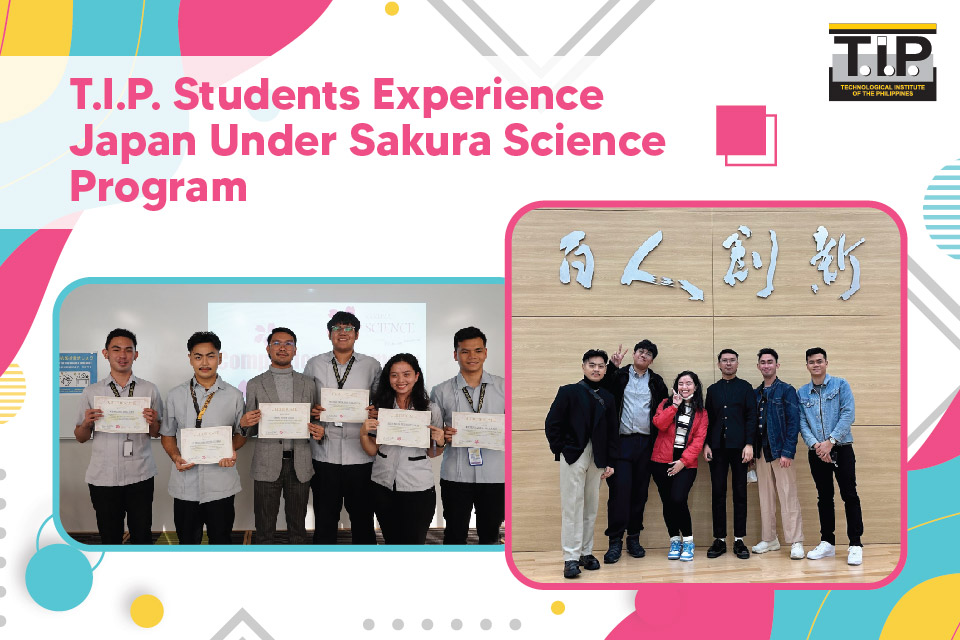
T.I.P. Students Experience Japan Under Sakura Science Program
Understanding the value of sustainable practices to protect the world we live in is a lesson worth learning, according to a group of Technological Institute of the Philippines (T.I.P.) students, who visited Japan for an educational tour under the Sakura Science Program (SSP).
T.I.P. College of Business Education standouts Von Eryl Morano, Maria Bernadette White, Erick Jose Velasco, Harvey Pajarillaga, and Jamil Martinez took part in a sustainable entrepreneurship crash course at the J.F. Oberlin University in Machida, Tokyo from February 26 to March 4, 2023.
The group represented the Philippines for the SSP during that period, which allowed them to meet and exchange ideas with other undergraduate and postgraduate students of not only Japan, but also Malaysia and India.
“They underwent business-related training in line with the sustainable development goals, environmental governance, management, the fundamentals of startups and venture capitalism,” said T.I.P. linkages and international relations officer Mandy Taller Bravo, who led the group.
The Japan Science and Technology (JST) agency funded the entire trip. JST has been implementing the SSP since 2014 to “support the development of talented human resources from overseas who have the potential to contribute to innovation in science and technology.”
The participating T.I.P. students all had positive words to say about traveling to the Land of the Rising Sun, primarily because it helped broaden their perspectives about the world, despite experiencing some language barriers with other nationalities and striking cultural differences.
“We have different cultures, educational backgrounds and environments, but we all aspire for a future where technology can be used to solve serious societal issues,” noted Velasco, a senior BSBA Logistics and Supply Management student from T.I.P. Quezon City.
Pajarillaga, a T.I.P. Manila BSBA Marketing Management junior, said he was able to develop a “global mindset” when he lived in Tokyo even for just a week. He is hoping to apply some of the insights and ideas he gained from the trip into his personal and professional life.
Although the Philippines remains as a developing country, White pointed out that we can learn so much from Japan in terms of how it was able to integrate modern technology into the daily lives of its citizens without losing touch of their cultural and ethical traditions.
“In the Philippines, it’s doable, but it’s going to be a lengthy process to get to that point because there are still a lot of Filipinos who are not technologically literate,” said White, a fourth-year BSBA Human Resources Management major from T.I.P. Quezon City.
Martinez, a BS Accountancy junior of T.I.P. Manila, is grateful to have his first overseas trip to Japan. He admired the kindness, discipline, and humility of its people even as he and upperclassman Morano struggled to adjust to some of their cuisine because of food allergies.
The students enjoyed being part of the SSP and would love to revisit Japan sometime in the future either to pursue further studies or explore other towns and cities. Morano felt proud to go there as a Filipino, knowing that he can adapt to its environment and it suits his personality.
The group received certificates of membership to the Sakura Science Club by virtue of their recent participation in the SSP. Bravo said T.I.P. continues to entertain invitations from universities in other countries to engage in similar international exchange student programs.
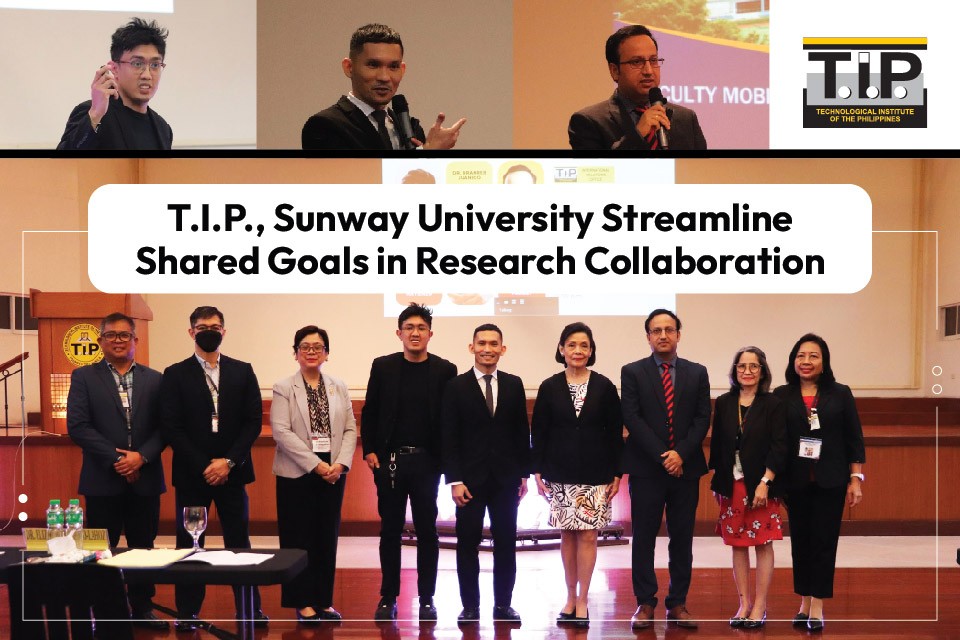
T.I.P., Sunway University Streamline Shared Goals in Research Collaboration
With the aim of unlocking the full potential of faculty members in aid of educating students to the highest global standards, the Technological Institute of the Philippines (T.I.P.) and Sunway University of Malaysia are streamlining their mutual interests in joint research projects.
This developed as T.I.P. wrapped up its first project with Sunway University, a series of learning sessions themed “Faculty Mobility Through International Research Collaboration,” held from March 13 to 15, 2023 at the school’s Quezon City and Manila campuses.
Dr. Adarsh Kumar Pandey, the associate dean for engagement at Sunway University’s School of Engineering and Technology, who also works for its Research Center for Nanomaterials and Energy Technology (RCNMET), was keynote speaker for the recently concluded event.
He underscored the value of collaborative research because it brings together different perspectives and skills among people. It also provides an avenue to share available resources between schools, enriching the minds of educators and students in the process.
Dr. Pandey likewise pointed out that the field of research is becoming more important to many countries these days because of the United Nations’ 17 Sustainable Development Goals–a set of urgent calls to action for governments around the world to create a better future for all.
“Research is for the community, not only within the country, but for the global citizens. We try to solve problems for the global citizens,” he said. Dr. Pandey also leads the Doctor of Philosophy in Sustainability Science and Technology program for Sunway University.
“Who collaborates well wins the race in terms of research publications, having product development, in terms of your reputation, and more exposure to your students and your faculties,” the visiting professor added.
Great communication is key to get the best out of international collaboration and achieve desired results. This entails developing conducive working relationships within the institution, between the industry and the academe, before reaching out to other organizations abroad.
T.I.P. TechnoCoRe principal researcher Dr. Dranreb Earl Juanico and Dr. DJ Donn Matienzo, an expert in hydrogen technologies and electrochemistry from University of the Philippines-Diliman, also shared their experiences, insights and best practices in research.
Dr. Matienzo underwent post-graduate studies and worked for different companies in Europe before moving back to the Philippines through the ‘Balik Scientist’ program of the Department of Science and Technology. He currently works as entrepreneurial lead for T.I.P. Quezon City.
Dr. Juanico, meanwhile, encouraged faculty members to take advantage of available opportunities to apply for scholarships overseas–like what he and Dr. Matienzo did–to help them develop a “growth mindset” that they can then impart to their students.
All three experts are working together to elevate the level of research in T.I.P. and Sunway University. Part of their plan, as Dr. Pandey announced, is to hold the first International Conference on Advanced Materials for Sustainable Energy Technologies (AMSET 2023).
T.I.P. through its TechnoCoRe Catalyst and International Relations Offices is coordinating with RCNMET for AMSET 2023, which will gather professionals, scientific experts, researchers and scholars for an interactive forum at Sunway University later this year.
The recent three-day seminar at T.I.P. culminated in a plenary session with participants from PACU member schools such as Southville International School and Colleges, Manuel L. Quezon University, San Pablo Colleges, Lyceum of the Philippines-Batangas, University of Luzon, Centro Escolar University and the National College of Business and Arts.
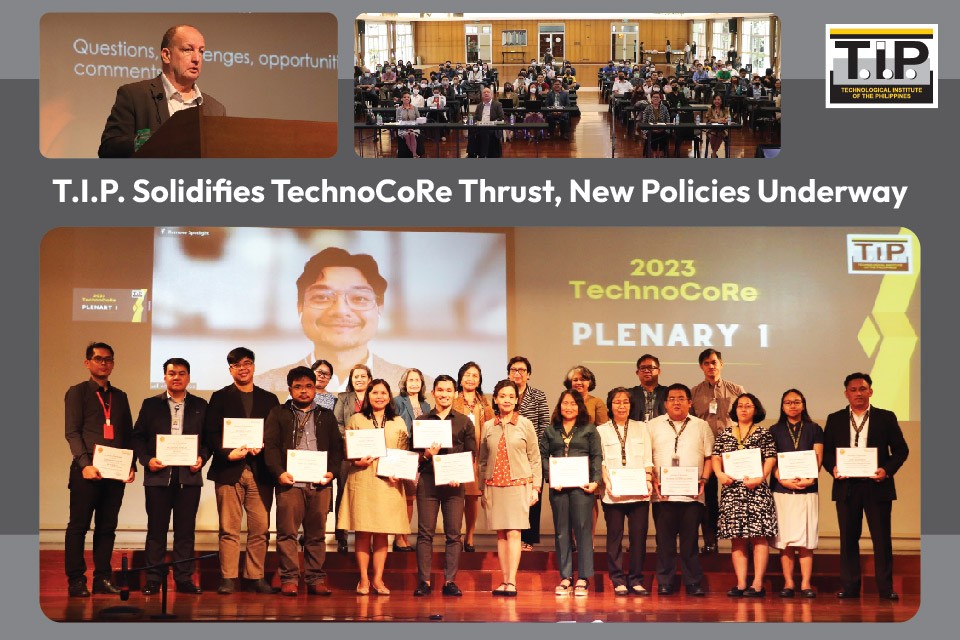
T.I.P. Solidifies TechnoCoRe Thrust, New Policies Underway
Focusing on its goal to produce graduates who are ready to help solve real-world industrial problems after getting their college degrees, the Technological Institute of the Philippines (T.I.P.) heightened its efforts toward educating students through experiential learning.
Central to this mission is the full immersion of undergraduate students and faculty members in various research and development activities through the Technopreneurship and Collaborative Applied Research (TechnoCoRe) thrust.
TechnoCoRe was established in 2017 to foster stronger ties between T.I.P. and its stakeholders in the private and public sectors, which, in turn, provide students and faculty the opportunity to work concretely on some of the biggest challenges facing companies today.
Over the past four years, TechnoCoRe has been successful in launching several technology-driven projects that helped address some industrial and environmental issues plaguing corporations and communities.
But T.I.P. senior vice president Angelo Q. Lahoz believes more needs to be done despite these developments. He wants the school to level-up and improve itself, now that it has experienced firsthand its potential to truly collaborate with and help the industries.
“We must now take stock of our successes, reassess our internal processes and governing policies, be informed of latest developments around (us), listen to our internal stakeholders, and strategize (our goals) for the immediate future,” Mr. Lahoz emphasized.
In view of this, T.I.P. through TechnoCoRe opened up a series of focus group discussions (FGDs) last March 1, 2023 to strengthen its applied research services and meet the growing demands and expectations of its partner industries and other stakeholders.
Special guest speaker in the plenary session that primed the FGDs was Dr. David Hall, Chief of Party for the Opportunity 2.0 program of the United States Agency for International Development (USAID) and the Education Development Center (EDC) in the Philippines.
In his talk, Dr. Hall urged T.I.P. to build its momentum around the three pillars of the 21st century university. These are “learning and teaching, applied research, and collaboration” amid new threats arising from unpredictable sociocultural shifts and emerging technologies.
“With technology, jobs are moving faster than you can change your curriculum… The ability (for both faculty and students) to learn-unlearn-relearn is actually the new literacy in the 21st century,” Dr. Hall said. Experienced-based learning, therefore, becomes even more critical.
Through a series of ongoing workshops, the T.I.P. management aims to gather rich input from its academic community to create new processes and policies that shall enable TechnoCoRe to further become the school’s way of life.

Anti-Plagiarism Talk Earns Graduating T.I.P. Students Podium Finish at PICPA Tilt
A fairytale-themed video from five senior Bachelor of Science in Accountancy students of the Technological Institute of the Philippines (T.I.P.) Manila was adjudged first runner up in the recently concluded lecture competition of the 2nd Accounting Students Research Festival.
Groupmates Alyssa Quiñones, Stefanie Anne Maming, Rica Mae Arienda, Gem Margaret Lucero, and Venice Marie Arroyo submitted an entry titled “Researchtopia,” which tackled the issue of plagiarism and how students can avoid it while working on their academic papers.
“We focused on the subject of plagiarism because we believe it is extremely important that we rely on trustworthy, evidence-based, and credible sources whenever we gather data and information, especially online,” said Quiñones, the group leader.
The eight-minute video lecture showed a student, played by Lucero, struggling to write the “Review of Related Literature” chapter of her research project. Coming to her rescue were online fairy godmothers played by the other four members of the team.
Each godmother took her turn guiding the student away from resources that might contain false information. They delivered their tips in the form of “magic potions” to help the student remember some best practices when browsing reference materials published on the internet.
Maming believed they won first runner up because of their unique concept, which the group executed by filming their scenes on their own from a script Quiñones wrote. “One of the judges loved the fact that we tried to be creative about it because accounting is an art,” noted Arroyo.
The Philippine Institute of Certified Public Accountants (PICPA) Committee on Research and Development organized the virtual competition in partnership with PwC Philippines/Isla Lipana & Co. and the National Association of Certified Public Accountants in Education.
PICPA is the national professional accountancy body of the Philippines. It is hosting the 2nd Accounting Research Festival from February 25 to April 29 this year with the theme “PICPA Playing Forward and Sustaining the Potentials of Accounting Students Through Research.”
Arienda said they are grateful to experience winning as a team in this competition because it helped enhance their communication and presentation skills, which they believe would be really invaluable once they step into the professional world upon graduation.
Quiñones also thanked Professor Froilan Labausa, Dean of the College of Business Education at T.I.P. Manila, on behalf of the group for his encouragement and support to accountancy students not only during external competitions but throughout their college life.

T.I.P. TechnoCoRe, Siemens Back PH Industrial Digital Transformation
The Technological Institute of the Philippines (T.I.P.) recently held a joint activity with Siemens, Inc. to provide its academic community and industry partners a more comprehensive outlook on a wide range of digital technologies in the fourth industrial revolution.
T.I.P. through its Technopreneurship and Collaborative Applied Research (TechnoCoRe) thrust partnered with Siemens, Inc. for a “Digital Industry Experience Technology Exhibit and Learning Sessions,” which began on February 16 until March 6, 2023.
The technology company first featured the same exhibit during the “Industrial Digital Transformation Congress” organized by the Department of Trade and Industry-Board of Investments (DTI-BOI) last December 2022.
Siemens, Inc. shared insights on the Future of Industrial Automation, Digital Transformation and Industry 4.0, Totally Integrated Automation, Edge Technology, Digital Twin, Virtual Commissioning, and Automated Guided Vehicles.
“Schools play a significant role in familiarizing stakeholders on how these new technologies work, based on actual demonstrations and discussions by the experts, and how they can impact Philippine industries,” T.I.P. industry relations and senior project manager Dr. Therese May Alejandrino said.
With the digital twin technology, for example, Alejandrino noted its potential to “continuously revolutionize how industries design, improve, manufacture and distribute their products and services,” thereby increasing employee productivity and company revenues.
T.I.P. is staying abreast of upcoming technologies, thus, it is regularly reviewing laboratory development plans for the continuous improvement of its academic facilities and equipment. Upgrading of facilities is essential to better prepare students for the latest technology drivers.
Jesus ‘TJ’ Tanchuco III, regional product manager for Siemens Inc., talked about how lines keep getting blurred between the virtual and physical worlds under Industry 4.0 that it behooves any organization to adjust its systems and processes in response to new challenges.
Siemens is actively working with the government, the academe, and the private sector to support the digital transformation journey of manufacturers in the Philippines. The company aims to help unlock the potential of industries by promoting Industry 4.0 technologies.
A total of 213 participants composed of students, academic officers, and industry practitioners attended the 15 learning sessions and demonstrations held at the TechnoCoRe building of T.I.P. Quezon City campus.
As one of the top engineering research schools in the Philippines, T.I.P. has always embraced research and development projects and joint activities to further equip its students, educators, and industry partners with the necessary skills and business acumen relevant to the government’s goals towards industrial digital transformation.

Green Engineering Goals from STEM Students of T.I.P. Manila
Motivated by their strong feelings against water pollution and its harmful effects on public health, three senior high school students from the Technological Institute of the Philippines in Manila are trying to blaze their own trail towards the field of green engineering.
Grade 12 students Mark Joseph Funilas, Nichole Emmanuelle Barcelona and Ansharina Therese Laud recently got the attention of their mentors and peers after developing an idea for an anti-water pollution device called “BuzzBuzz.”
This theoretical machine hopes to clear highly polluted streams and waterways of not only solid wastes, like plastics and other discarded objects, but also potentially dangerous microorganisms that can cause diseases.
“It works by integrating a built-in sensor in the machine, which will be powered by solar panels and lithium-ion batteries, that could filter out water pollutants it is programmed to detect. These, in turn, would automatically be collected and disposed properly,” the group explained.
The look of the device was partly inspired by the animated fictional character Buzz Lightyear–the legendary space ranger in the Toy Story franchise–so they decided to name their theoretical invention “BuzzBuzz.”
Their proposed concept won the Technology Innovation Challenge from the Institute of Electronics Engineers of the Philippines (IECEP) Manila Student Chapter last October 2022, which took them to the national level of the competition where they placed first runners up.
Established in 1950, the IECEP is a non-stock, non-profit organization duly recognized by the Professional Regulation Commission with thousands of members composed of registered and globally-competitive electronics engineers in and outside the country.
Funilas, Barcelona, and Laud, who are all currently enrolled in the science, technology, engineering, and mathematics (STEM) academic track of T.I.P. Manila, “hope to build on this accomplishment by turning their idea into a marketable product someday.”

T.I.P. Faculty Wins Doctoral Dissertation Competition at Australian Conference
For devising a template that could help address common manufacturing problems, a faculty member from the Technological Institute of the Philippines (T.I.P.) was awarded first place in a recently concluded doctoral dissertation competition held in Sydney, Australia.
Engr. Ma. Teodora Gutierrez, an assistant professor under the Industrial Engineering department of T.I.P. Quezon City, submitted her latest paper titled “A Model for Production Possibility Frontier of an Enterprise Using Multi-Objective Optimization Approach.”
Her work topped the doctoral dissertation category out of eight other research projects presented in person and online in that division at the First Industrial Engineering and Operations Management (IEOM) Conference in Sydney, Australia last December 20 to 22, 2022.
Gutierrez said her goal was to help her case study, a steel company based in the Philippines, find optimum solutions that would somehow make it easier for operations managers to minimize production costs and wastes subject to the availability of resources.
“I came up with this study to formulate a model for this particular company using their data and solved (a problem) using the operation research technique. So, this one is more complex because there are tradeoffs,” she noted.
Gutierrez was referring to the seemingly contradictory approach of doing more with less to increase productivity. In theory, she said, this can be done by achieving what is called a ‘pareto optimal solution’ to meet multiple objectives.
‘Pareto optimality’ or ‘pareto efficiency’ is a concept commonly used in economics to describe a scenario in which resources are allocated in the most efficient way possible without making one side of the equation better off or worse than the others.
The 21-year faculty member presented her paper virtually. She has been working on this problem as part of her Doctor of Engineering in Engineering Management studies at the Polytechnic University of the Philippines (PUP) in Manila.
Gutierrez’s win at the Australian conference of the IEOM Society is her first international recognition. IEOM Society is a non-profit global organization “dedicated to the advancement of industrial engineering and operations management discipline for the betterment of humanity.”
Prior to this achievement, Gutierrez has done research on improving productivity in a semiconductor subcontracting company and worked with other researchers on a solution to decongest the Manila Port using model simulation, among other studies.
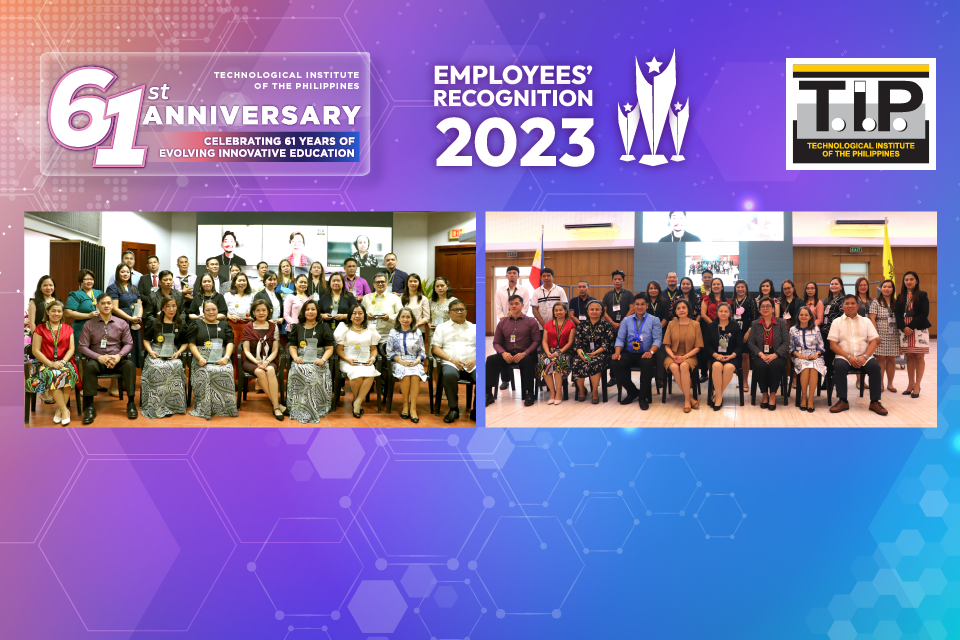
T.I.P. Honors Dedicated Employees with Annual Service Awards
Forty-seven seasoned employees were honored in an annual rite to celebrate their decades of success, hard work and loyalty to the Technological Institute of the Philippines (T.I.P.), which recently marked its 61st Founding Anniversary.
Engr. Shearyl Arenas, program chair of the Electronics Engineering department at T.I.P. Quezon City spoke on behalf of employees who were acknowledged for their 24 years of service. She is an alumna of the school herself and is proud of what it has done for her career.
“When I started at T.I.P., I was a young ‘promdi’ student, eager to learn and make a difference. Little did I know that this institution would become such a significant part of my life and that it would provide me with opportunities,” Arenas said in her speech.
Senior assistant Shirley Ricamata, who has been working at the Office of the Registrar, echoed similar thoughts. She is grateful for the opportunities that T.I.P. accorded her “to collaborate with fine and smart people.”
“I must say, besides learning a lot professionally, I felt that I gained more than what I needed. I've always hoped for a company that would give me more than job experience,” said Ricamata, who represented employees that have been with the organization for 20 years.
For faculty member Joel Payapa, what he loves about working for T.I.P. is its “harmonious working environment.” He has been teaching students for 15 years and counting under the College of Arts department.
“(T.I.P.) is imbibing the culture of excellence, not mediocrity. I am fascinated by how the administration transformed the institution. I believe excellent leadership plays a great role in that,” Payapa said.
Also named as awardees were faculty member Engr. Jerry Boromeo, senior guidance counselor Erlynn Pua, chief software architect Gleen Israel, secretary to the senior vice president Marybeth Dantes, and T.I.P. QC Vice President for Academic Affairs Dr. Cynthia Llanes, among others.
T.I.P. President Dr. Elizabeth Quirino-Lahoz personally extended her own message of gratitude to all the employees who chose to remain and help the organization move forward from the setbacks induced by the ongoing threat of Covid-19.
“The fact that you stayed on during the pandemic is symbolic because I'm sure you had other options. I’m sure you even wanted to rest or retire already… You all went through problems, but you’re still here… Thank you for thinking of T.I.P. as your second home,” Dr. Quirino-Lahoz said.
The loyalty awards were conferred on all employees who rendered 10 to 24 years of service during the Employees’ Recognition Day on Tuesday, February 7, 2023. The ceremony is a staple event that is held every year as part of the week-long anniversary celebrations of T.I.P.

T.I.P.ians Make it to the 2022 NASA Space Apps Challenge Global Finalists
A group of budding computer engineers and software developers from the Technological Institute of the Philippines (T.I.P.), who worked on a solution for measuring open science, emerged among the Top 35 Global Finalists in the recently concluded 2022 NASA Space Apps Challenge.
Open science seeks to broaden public access to a number of scientific studies and statistics being published on the internet through user-friendly information and communication related technologies for the benefit of society.
Team Loominaries composed of junior college students Neal Barton James Matira, Jeremy Reuel Cesista, Carlo Dominique Tolin, and Jomari Dungque proposed a web application that guides people in sifting through thousands of scientific research available online.
They called their project “RE:SCORE,” which was designed to measure the reproducibility index of a particular study by gauging peer evaluations, expert reviews, public reactions, and opinions towards it through sentiment analysis.
“‘RE:SCORE’ is an app that aims to give a credibility score towards open science materials for people to see their relevance as well as the actual validity and reliability of the research in accordance with its existing metrics,” explained Matira, the team leader.
Cesista, who served as backend developer in the project, said they tried to incorporate carefully programmed algorithms into the app to ensure that it would yield trustworthy results when users key-in the digital object identifier (DOI) of the research in question.
“We took into account the reviews of random people on social media, as well as those of the experts, and included other metrics such as the number of citations this research had in other research to determine which has the best score,” he added.
“Our project is still a work in progress but it has potential. I just hope that it will go beyond open space applications and can be used in other fields,” noted team member Dungque, a chemical engineering major from T.I.P. Manila.
Meanwhile, another team called T.I.P. Warriors also participated in the 2022 NASA Space Apps Challenge and made it to the list of Global Nominees. It won the Local People’s Choice citation in the Manila event of the global hackathon.
T.I.P. Warriors engaged in the “Learning Through the Looking Glass” challenge and created a relatively simple game called “Telescope Hunter,” featuring NASA’s James Webb Space Telescope (JWST) that encouraged more people to know about it.
Team leader Jerico delos Reyes worked with his fellow junior computer engineering students–Andrea Faith Alimorong, Christian Ainsley del Rosario, Zherish Galvin Mayordo, and Jesriel John Sarambao–in developing the app that allows players to hunt parts of the JWST.
“What I learned in this competition is that trying is better than failure because, to be honest, we were not sure if we would succeed… This is our first time joining this kind of competition and we were glad and proud of ourselves that (our efforts) were acknowledged,” Delos Reyes said.
The International Space Apps Challenge is an annual global hackathon organized by the US-based National Aeronautics and Space Administration (NASA) through its Earth Science Division in collaboration with other partner firms.
The 2022 NASA Space Apps Challenge took place from October 1 and 2 with the theme “Make SPACE.” According to its website, it reached a record-breaking 31,561 registered participants from 162 countries last year, making it the largest Space Apps Challenge to date.

Young Innovators from T.I.P. Manila Want to Reinvent Your Takeout Cutlery
With the goal of reducing the impact that disposable utensils have on the environment, a team of senior high school (SHS) students from Technological Institute of the Philippines (T.I.P.) Manila is developing a sustainable alternative using the organic filaments of a fungus called ‘mycelium.’
“We will use it as a binder and we chose it because, as we have found in our research, mycelium is often called ‘nature's biggest recycler,’” said Mary Nicole Alejandrino, a Grade 12 STEM (science, technology, engineering, mathematics) student.
According to Scientific American, mycelium is what “mushrooms are made of” and, when harnessed using our existing technologies, can help “replace plastics that are rapidly accumulating in the environment.”
Alejandrino has been working with her fellow STEM students–Rayvhen Dominique Rada, Paulo Luis Bautista and Will Andrew Mercado–since they were in Grade 11 to try and do just that. They are going to create mycelium-based biodegradable cutlery under Project “BioHoshi.”
Together, they formed Team Ensio, which recently won a research grant worth P451,000 from the Department of Science and Technology (DOST) in its 5th Young Innovators Program under the mentorship of Ms. Ellaysa Esplago and T.I.P. Manila SHS principal Dr. Glorielyn Camerino.
Esplago, the chief project adviser, said the team has been given a 10-month timeframe to develop a prototype of food grade single-use utensils made of mycelium. They are currently in the experimentation stage of the project after finalizing a memorandum of agreement with DOST.
“Aside from the main objective of the team, which is to help combat the unending and alarming waste management problem, another goal for us–hopefully, when the project becomes successful–is to make this as a startup,” said Esplago.
Camerino is proud that their students have developed keen interest in research and development this early. “They should not be afraid of trying to showcase their talents and to show that they are innovators,” she advised.
Like Esplago, Camerino hopes that their students would keep living by the T.I.P. mantra of becoming ‘lifelong learners, problem solvers, and innovators,’ who are capable of making positive contributions to Filipino society and the world at large.
The Young Innovators Program is an annual project of the DOST in collaboration with the Philippine Council for Industry, Energy and Emerging Technology Research and Development to support promising students who engage in scientific exploration in the said sectors.
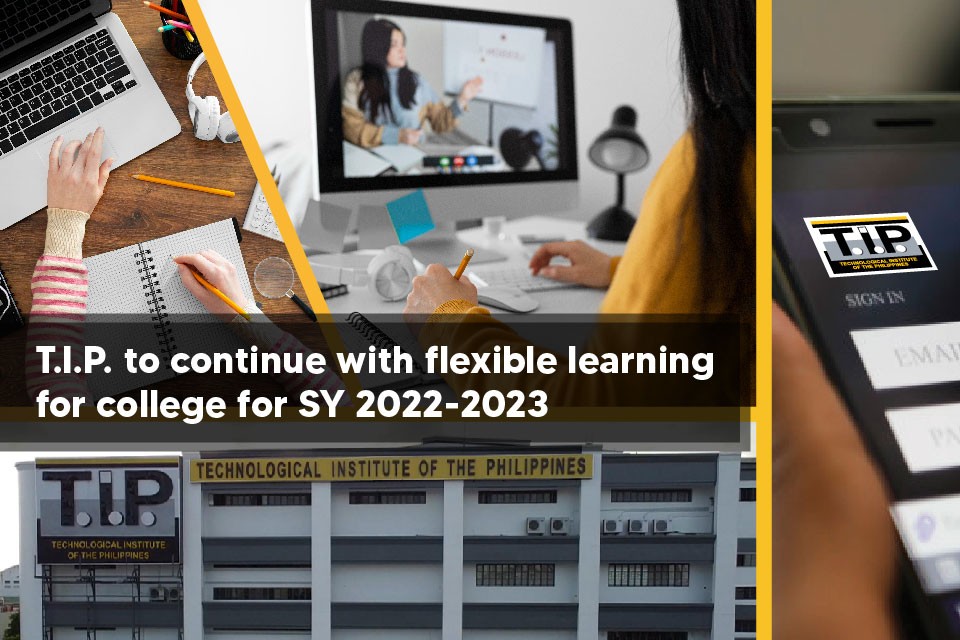
T.I.P. to continue with flexible learning for college for SY 2022-2023
The Technological Institute of the Philippines (T.I.P.) shall implement two teaching and learning modalities for its college students this SY 2022-2023: online and hyflex.
Students of non-board courses will have their classes fully online, while those enrolled in critical board courses will use the hyflex modality wherein classes are onsite, but with an exception for students with valid reasons to attend classes remotely.
"The decision comes from having a flexible mindset. If there is one thing that the pandemic taught us, it's to continuously explore new ways to deliver education. We remain to be open to the different possibilities so learning can be more inclusive," said T.I.P. President Dr. Elizabeth Quirino-Lahoz.
Most of the courses will still be delivered via modular approach, wherein they can be completed in 6 weeks, but some identified professional courses will be delivered within 18 weeks.
To protect the school community, students and faculty members must be fully vaccinated and should wear the right face masks to be allowed entry on campus.
As part of its health and safety protocols, T.I.P. strictly observes physical distancing and has likewise set up several hygiene stations inside school premises.
Application and enrollment for 1st Semester SY 2022-2023 are ongoing. Visit https://admission.tip.edu.ph/web/ to apply. To know about the teaching and learning modalities for SHS and Graduate Programs go to https://tip.edu.ph/be-a-tip-ian/faqs/.
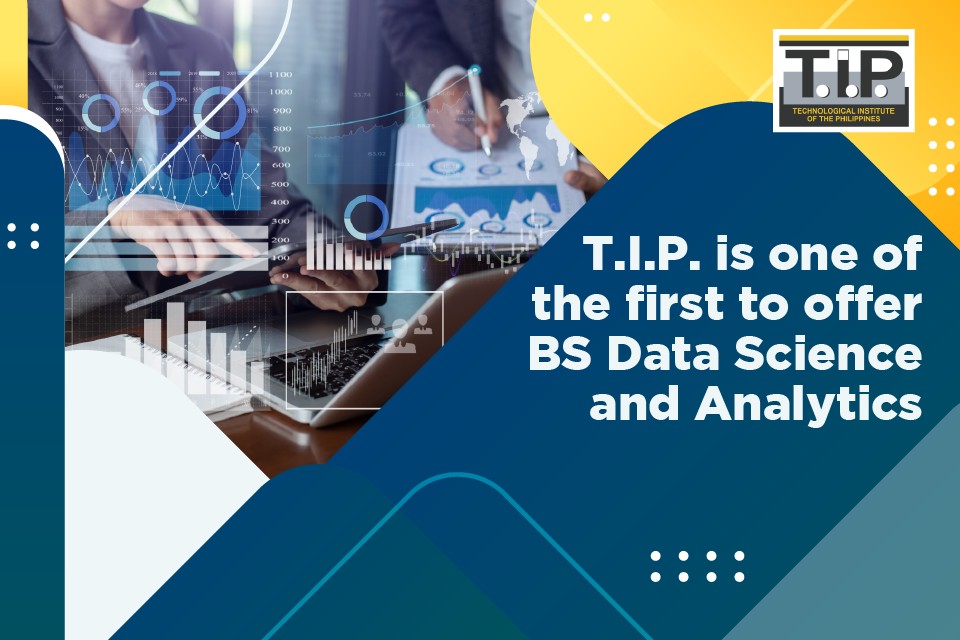
T.I.P. is one of the first to offer BS Data Science and Analytics
The Technological Institute of the Philippines (T.I.P.) is opening SY 2022-2023 with a new undergraduate degree offering — Bachelor of Science in Data Science and Analytics (BSDSA).
This comes two years after T.I.P. launched Metro Manila's first-ever Professional Science Master's Degree in Data Science (PSMDS) back in 2020.
"The substantial number of enrollees we've had for PSMDS is not only a confirmation that the market is informed and keenly aware of the growing need for data scientists; it's also an affirmation of the relevance of the program. We, therefore, deemed it necessary to offer BSDSA," said T.I.P. President Dr. Elizabeth Quirino-Lahoz.
BSDSA is a four-year program designed to equip students with theoretical, practical, and comprehensive knowledge to manage and analyze complex data.
It covers fundamental and advanced computer programming, predictive modeling, machine learning, statistical techniques, algorithms, methodologies, business intelligence, data visualization and its applications across multiple disciplines.
To ensure global competitiveness, T.I.P. benchmarked its BSDSA curriculum with top universities abroad.
"Data scientists are among the most in-demand professionals in the world today. With big data having a tremendous impact on how industries make major decisions, we need experts who can analyze and translate these numbers into positive business outcomes," Dr. Quirino-Lahoz added.
Application and enrollment for T.I.P.'s BSDSA is now open. For more information about the program, visit https://bit.ly/TIP_BSDSA.
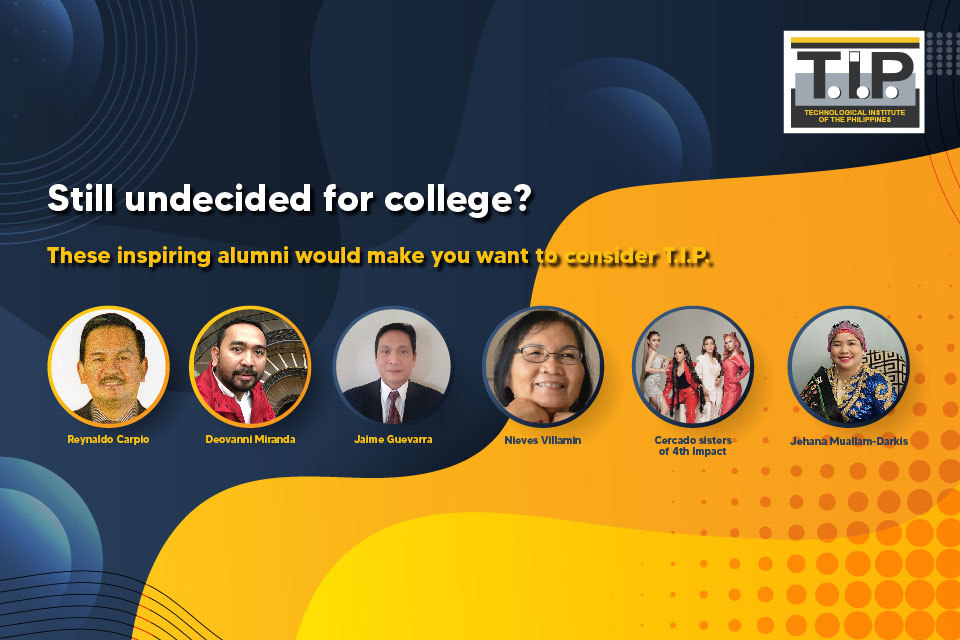
Still Undecided For College? These Inspiring Alumni Would Make You Want To Consider T.I.P.
College is one of the biggest decisions you'll ever make in life. From choosing a good school to picking your desired course, this phase requires a whole lot of preparation and planning.
If you haven't made up your mind yet, take a cue from these six inspiring alumni of the Technological Institute of the Philippines (T.I.P.) and their stories of grit and determination.
Reynaldo Carpio
Founder and CEO of Grand Monaco Estate Developers, Inc., Reynaldo Carpio finished Civil Engineering in T.I.P. back then. His was a rags-to-riches story. Born to farmer parents, Rey tirelessly worked his way to the top, taking on various side hustles even as a student.
Deovanni Miranda
Deovanni Miranda is a sought-after engineer abroad. He came back to the Philippines in 2019 to work on the LRT-2 line extension project and other "Build, Build, Build" endeavors of the government.
Jaime Guevarra
Jaime Guevarra is currently the Head of IT Strategic Services of the United Nations Office for the Coordination of Humanitarian Affairs (UN-OCHA) in New York. Electrical Engineering was his undergraduate degree in T.I.P.
Nieves Villamin
Nieves Villamin took up Accountancy in T.I.P., but fate had different plans. She is now an accomplished author and vineyard and winery owner in the US. Her most celebrated work, to date, is Bittermelons and Mimosas: A Philippine Memoir.
Cercado sisters of 4th Impact
All-girl group 4th Impact — composed of Cercado sisters Almira, Irene, Mylene, and Celina — rose to fame upon joining The X Factor UK in 2016. Almira and Irene are actually T.I.P.ians, with degrees in Information Technology and Secondary Education Major in English.
Jehana Muallam-Darkis
A computer engineer by profession, Jehana Muallam-Darkis went on to become the Vice President for Academic Affairs of Sulu State College. She was awarded Outstanding Educator and Empowered Academic Leader of the Year in the 2021 Gintong Parangal.
Want to become a T.I.P.ian yourself? Apply online via our Admissions portal at https://admission.tip.edu.ph/web/.
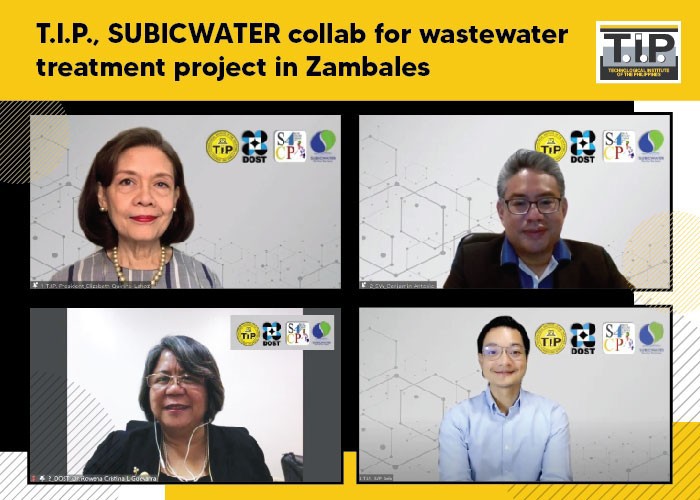
T.I.P., SUBICWATER collab for wastewater treatment project in Zambales
The Technological Institute of the Philippines (T.I.P.) has signed a collaborative research agreement with Subic Water and Sewerage Co., Inc. for the project titled "Constructed Wetland for Wastewater Treatment of Effluent from a Water Provider."
T.I.P. and SUBICWATER formalized their partnership in a virtual conference led by T.I.P. President Dr. Elizabeth Quirino-Lahoz, SUBICWATER Chief Executive Officer Benjamin Antonio III, and Department of Science and Technology (DOST) Undersecretary for Research and Development Dr. Rowena Cristina Guevara.
The joint venture comes as T.I.P. positions itself as a viable partner and pushes for stronger academe-industry-government linkages. The project per se—which aims to reduce the concentration of wastewater pollutants through an integrated wetland system—is funded by the DOST through its Collaborative Research and Development to Leverage Philippine Economy (CRADLE) program, with the Philippine Council for Industry, Energy, and Emerging Technology Research and Development (PCIEERD) as the monitoring agency.
"Collaborative projects such as this provide the platform for students, faculty members, and researchers to work with industry partners and government agencies, thus making learning more relevant, meaningful and impactful. Learning by doing," said Dr. Quirino-Lahoz.
For SUBICWATER, the partnership "could not have come at a more perfect time." Citing the 2018 Boracay wastewater crisis and the stricter standards set by DAO 2021-19 for water effluent, Antonio said this collaborative effort is an opportunity to create “one of the most practical and cost-efficient options that we can use to address growing issues in sewerage management in the Philippines.”
Dr. Guevara, meanwhile, noted that with increased economic activity comes the need to protect and rehabilitate the island.
"Tourism opportunities provide economic vibrance enjoyed by local industries, most notable are businesses lined up in waterways that take advantage of spectacular views. Through research and development, we'll be able to strike a healthy balance between preserving the environment and providing much needed support to private industries," she added.
T.I.P.'s venture with SUBICWATER is the latest addition to the list of DOST CRADLE-sponsored projects of the institution, spearheaded by T.I.P. Manila's Chemical Engineering Department Chair Engr. Lorraine Carrillo and TechnoCoRe Catalyst Industry Relations and Senior Project Manager Dr. Therese May Alejandrino.
TechnoCoRe is T.I.P.'s thrust towards technopreneurship and collaborative applied research. It empowers students, faculty members, and researchers to work on innovative solutions to the problems of stakeholders, including government, industry, civic organizations, and society at large.
For more information on T.I.P., please visit tip.edu.ph or T.I.P.’s official social media accounts through @TIP1962official for Facebook, Twitter, and Instagram.

T.I.P. to offer graduate scholarships in Computer Science
The Technological Institute of the Philippines (T.I.P.) will be offering new scholarships for its Master of Science in Computer Science (MSCS) and Doctor of Philosophy in Computer Science (PhDCS) programs starting in the Second Semester of SY 2021-2022.
This comes after the Department of Science and Technology - Science Education Institute (DOST-SEI) certified as priority the two graduate programs now covered under its Engineering Research and Development for Technology (ERDT) Scholarship Program.
"ERDT is a dream come true for the institution. It shall enable T.I.P. to contribute further to the existing body of research and make graduate education more accessible to Filipinos, especially since the Institutes for Research, Innovation and Scholarship (IRIS) also named us as the fifth top school for engineering research in the country this year," said T.I.P. President Dr. Elizabeth Quirino-Lahoz.
The DOST ERDT supports master's and doctoral degrees in various engineering fields. It aims to upgrade the quality of engineering colleges and professionals by implementing high-impact research agenda aligned with the Philippines' development plans.
To know more about the DOST-ERDT scholarship and how to apply, visit bit.ly/TIP_ERDT.
Deadline for applications is on December 10, 2021. Classes start on January 31, 2022.
For more information on T.I.P., please visit tip.edu.ph or T.I.P.'s official social media accounts through @TIP1962official for Facebook, Twitter, and Instagram.

More than just CCTV surveillance: T.I.P. builds SulyApp alert notification system for potential crimes
With crime rates on the rise, closed-circuit television (CCTV) cameras can only do so much. Police need to catch and arrest lawbreakers, but they can't do so if they're already late for the action.
This was the challenge that the Technological Institute of the Philippines (T.I.P.) sought to address in the 2021 Philippine National Police - Information Technology Management Service (PNP-ITMS) Hackathon.
To help lessen authorities' screen time and to allow for more productivity, Computer Engineering seniors Jarod Augustus Austria, Adrian Galit, Joaquin Tyrone Guevarra, Kathleen Jogno, and Franklin Nazareno built 'SulyApp,' an application that monitors and alerts CCTV operators of unwanted activities real-time.
The app, which won third place, uses artificial intelligence to read body movements typically associated with criminal assaults. Once it detects a suspicious pose or stance, SulyApp classifies the scene as an emergency and immediately sounds an alarm. It also sends out an email notification to the nearest police desk.
The first of its kind in the Philippines, SulyApp can be run anywhere there are CCTVs – may it be in schools, homes, or small neighborhoods. Rather than relying on manpower and mere evidence retrieval, the app detects crimes as they happen, changing the way we do surveillance and permitting faster response time.
"It provides an added layer of security, especially in unguarded areas. These students really went above and beyond to contribute to the safety of their communities," said Engr. Cecilia Venal.
The more data it gathers, the smarter and more accurate SulyApp gets. Every recorded clip can likewise be saved and downloaded for review. More features are underway as the technology will be further developed.
A total of 43 diverse teams competed in the PNP-ITMS Hackathon, which aimed to boost the national police force's digital transformation in the new normal.
For more information on T.I.P., please visit tip.edu.ph or T.I.P.’s official social media accounts through @TIP1962official for Facebook, Twitter, and Instagram.

T.I.P. wins double back-to-back in international industrial engineering conference
The Technological Institute of the Philippines (T.I.P.) Manila captured four wins in the IEOM Society International Second Asia Pacific Conference with three of its research papers and one design project finishing at the podium.
Mental load of work-from-home (WFH) employees, Metro Manila's COVID-19 vaccination rate, and problems arising from manual labor were among the issues tackled in the studies.
"These are all hot topics, especially mental health. We endeavored to know if there really is WFH stress," said Engr. Janina Elyse Reyes, who co-authored with her students Sheeno Dasmariñas, John Margel Otalla, and Kimberly Joy Perea Ergonomic Assessment on the Mental Load of Work from Home Employees.
The paper, which won first place, validated their earlier assumption and recommended a specific timeline similar to the pre-WFH arrangement to set boundaries and avoid 'Zoom fatigue' especially for the education, IT/BPO, and financial industries.
Engr. Reyes likewise worked with a team of students for the research titled Process Improvement of Covid-19 Vaccination System by Utilizing Queuing Theory and ProModel Simulator on Vaccination Facilities in Metro Manila.
The study – conducted by Larianne Cruzado, Mary Antonette Faminiano, Unique Kate Guna, Maria Ziziana Llegos, Kyla Mendoza, and Jolly Ann Villaflores – finished second place and was able to reduce the average vaccination time per person from more than two hours to just 85 minutes and 12 seconds.
"We streamlined processes like registration and screening so people would have less waiting time and less exposure to the virus, providing a safe facility and equitable access to vaccines," said Villaflores.
Also in second place were Gavin Frederick Bautista, Nellaine Delos Santos, and Edmar Garcia for their paper Application of Proper Manual Material Handling Techniques, Six Sigma Target Equation, and NIOSH Lifting Equation for the Improvement of the Level of Safety of Workers of AMG Rice Dealer.
Their research focused on ergonomic hazards of manual labor – noting that, for anything that involves heavy lifting, one should take it one load at time on their shoulders (and not on their heads as some would do) to prevent injury and muscular-skeletal disorders. Investing in gloves, shoulder padding, and other equipment was further advised.
Completing T.I.P.'s podium wins, Val Ryan Aguilar, Racquel Tadina, and Eugene Tamba's bakelite cleaner landed third place in the senior design project competition. The device, made from scraps, automatically polishes the insulating material attached to kitchen wares called bakelite, ultimately reducing bottlenecks in the production line.
"We're gearing our students to be research/design-oriented by making it part of their academic achievement to present their papers in local and international research fora. The automatic bakelite cleaner was actually Tamba's OJT project at Marilao Alerco Industrial Corporation," said T.I.P. Manila IE Chair Dr. Maria Teresa Mendoza.
IEOM is a global non-profit organization dedicated to the advancement of industrial engineering and operations management amongst countries. It holds various conferences in a year to connect students and professionals with innovative and entrepreneurial minds.
For more information on T.I.P., visit tip.edu.ph or T.I.P.'s official social media accounts through @TIP1962official for Facebook, Twitter, and Instagram.

No scraps left behind: T.I.P. engineering senior builds 4-in-1 rechargeable emergency kit from recycled materials
Modern problems require simple solutions.
This is what Paul Bryan Mancenido, an electrical engineering senior from the Technological Institute of the Philippines (T.I.P.), proved with his 4-in-1 rechargeable emergency kit built from scraps.
The device – which won him the grand prize in T.I.P.'s Environmental Fair, and which recently caught the attention of media giant GMA 7 – features a handy flashlight, lamp, electric fan, and USB charging port all rolled into one.
"My mantra has always been not to let go of scrap materials just yet. They can still be reused and recycled, especially now when we can't easily go out due to the pandemic," Mancenido said, recalling that rainy day he thought of making his novel invention.
As an only child, Mancenido grew up playing and experimenting with broken motor parts. His father is an air-conditioning mechanic, while his mother is a housewife. When he was younger, he would often repair devices for free. This hobby would continue on up to college, when Mancenido realized that he wanted to build a career and a legacy out of it.
"People would belittle my ideas sometimes, and even my parents would caution me every now and then; but I know in my heart that I've got something to give. They may not understand it now; but someday, when I'm already a full-fledged manufacturing engineer, they will," Mancenido said.
The thought of contributing largely to society did not sink in until Mancenido himself saw his work on national television. Congratulations were immediately in order for the humble student from San Mateo, Rizal. Years of failures and self-conceptualizing have somehow bore fruit, and this is just the beginning. The kid is only getting started.
As he nears graduation, Mancenido looks back on his journey as a T.I.P.ian. It was the institute's laboratories that inspired him to dream, and it's also how he envisions his future workspace to be.
Ariel Magat, program chair of T.I.P.'s electrical engineering department, lauded Mancenido's 4-in-1 rechargeable emergency kit, saying this multifunctional invention made from scraps shows that "breakthroughs doesn't necessarily mean discovering new things, it may also be about looking at improving those around us."
"Mr. Marcenido's project would definitely open up other bright ideas from our students and other young inventors out there. This would encourage them to explore integration of various concepts and technology – things that are already on hand but just waiting to be tapped and reproduced into innovative tools, gadgets, or equipment," he added.
For more information on T.I.P., please visit tip.edu.ph or T.I.P.'s official social media accounts through @TIP1962official for Facebook, Twitter, and Instagram.
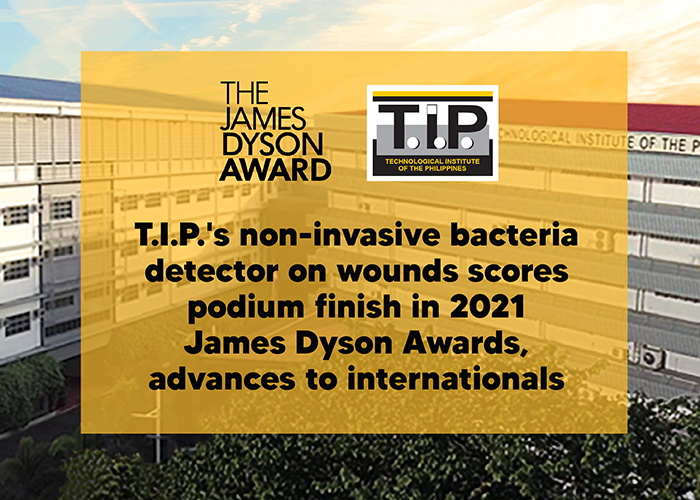
T.I.P.'s non-invasive bacteria detector on wounds scores podium finish in 2021 James Dyson Awards, advances to internationals
The Technological Institute of the Philippines (T.I.P.) Manila assumed a podium spot in the 2021 James Dyson Awards (JDA) with its non-invasive bacteria detector on wounds, an electrochemical device that identifies microbes found in wounds and other topical cuts through quick gas absorption.
Electronics engineering fresh graduates Angelica Moneth Lozano and Shania Xylene Miguel worked on the medical instrument for over a year, competing with 33 more student entries and eventually finishing runner-up in the JDA nationals.
"Our prototype gives immediate diagnosis of infectious and decaying wounds, skipping long processes of laboratory sampling which is rather costly and painful," said Lozano.
"We've tested it on diabetic patients at Jose R. Reyes Memorial Medical Center; and for results to be accurate, the device's sensors need to absorb the fumes emitted by the wound from an ideal distance of one to four millimeters only. Bacteria present will be shown through an LCD screen in less than five seconds," she added.
The goal, according to Lozano, was to make healthcare accessible to all, especially in a time of crisis.
Dr. Rommel Anacan, head of T.I.P. Manila's Math and Physics department, echoed this sentiment – noting that with its latest inventions and breakthroughs, the institution aims to create a "culture of excellence and innovation."
T.I.P.'s non-invasive bacteria detector on wounds is now advancing to the international JDA where it will go head-to-head with fellow podium finishers of other countries.
The James Dyson Awards is an annual global competition that celebrates the works of the brightest and youngest minds in design engineering.
For more information on T.I.P., please visit www.tip.edu.ph or T.I.P.'s official social media accounts through @TIP1962official for Facebook, Twitter, and Instagram.
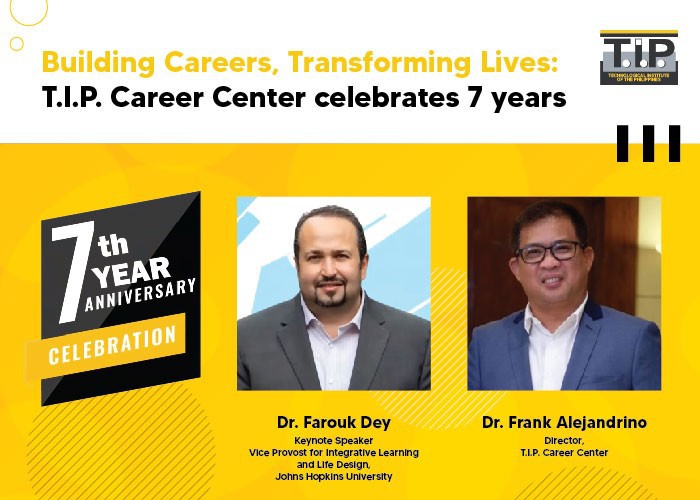
Building Careers, Transforming Lives: T.I.P. Career Center celebrates 7 years
They say that seven is a lucky number.
For the Technological Institute of the Philippines (T.I.P.), indeed, it is. The institution's renowned Career Center recently marked—amidst the pandemic—seven years of successful operations, and it couldn't be any prouder.
To celebrate this milestone, the T.I.P. Career Center held a month-long series of engagement activities with the theme "Building Careers, Transforming Lives." The event saw T.I.P. students, faculty, alumni, and partners collaborate for peer advising sessions, skills and resume assessment, and virtual company tours, among others.
"The idea of having a career center was introduced to us by the United States Agency for International Development (USAID)-Science, Technology, Research and Innovation for Development (STRIDE). Through the years, we have learned to nurture at the institutional level real working linkages with the best industry partners, helping jumpstart the careers and transform the lives of our students," said T.I.P. President Dr. Elizabeth Quirino-Lahoz.
Recognized as a Model Career Center by USAID-STRIDE in 2019, the T.I.P. Career Center has produced top-notch professionals in various fields.
T.I.P., in fact, has an average employment rate of 92.5% for both its Manila and Quezon City campuses. Jobstreet's 2018 Employer Survey also ranks T.I.P. as the seventh most preferred school by employers when it comes to hiring fresh graduates and the second most preferred school by companies in the engineering industry.
"From peer and faculty advising, on-the-job training, internship, apprenticeship, to cooperative education, the T.I.P. Career Center works round the clock to bring T.I.P.ians closer to the career of their dreams, providing them opportunities, experiences, and connections way beyond the usual realm of possibilities in higher education," Dr. Quirino-Lahoz added.
Careers in the Post-Pandemic Era
Capping the T.I.P. Career Center's seventh anniversary celebration was Dr. Farouk Dey, Vice Provost for Integrative Learning and Life Design of Johns Hopkins University.
In his talk, Dr. Dey called on T.I.P.ians to be "unconventional, brave, and audacious" about their future, especially with the ongoing Covid-19 pandemic.
"The biggest startup successes happen in moments of crisis because these are times when rules are suspended, and you have the opportunity to try things out. Don't just rely on luck; be strategic on how you make luck work for you. Ideate, build, and test your prototype to people who can give you honest feedback," he said.
Dr. Dey likewise stressed the need for students and professionals to continuously upskill, citing massive changes in the workplace as reported by global economic groups.
"Jobs you may have planned for yourselves may no longer exist in the future, as they're already being displaced by automations and machines. Take a moment to pay attention to what is changing around you. If you allow your vision to be guided by outcome and data, you are more likely to succeed."
Despite the pandemic, the T.I.P. Career Center remains committed to ensuring the success of its students and graduates. To know more about its services, check out facebook.com/TIPCareerCenter.
For more information on T.I.P., visit tip.edu.ph or T.I.P.’s official social media accounts through @TIP1962official for Facebook, Twitter, and Instagram.
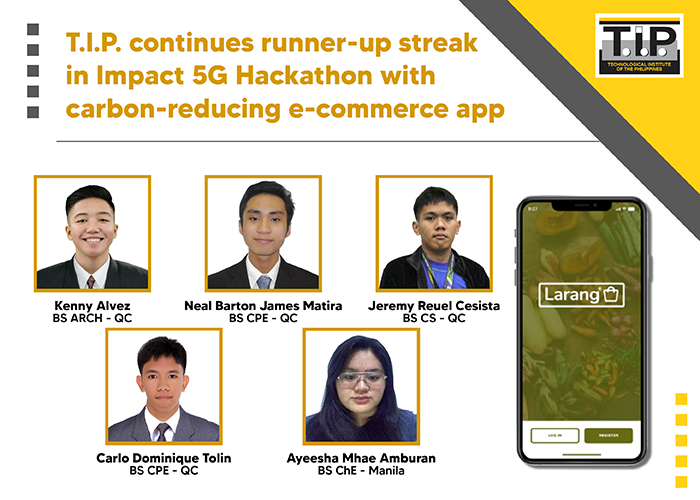
T.I.P. continues runner-up streak in Impact 5G Hackathon with carbon-reducing e-commerce app
The Technological Institute of the Philippines (T.I.P.) secured another podium finish in the Impact 5G Hackathon, placing second runner-up this time in the climate change category.
T.I.P.'s e-commerce app 'Larang,' which means equilibrium in Filipino, wowed the judges enough to beat 22 others in the competition. Its premise lies in connecting consumers to the nearest supplier of fresh, healthy, and local produce, thereby reducing the country's overall carbon footprint.
"A person's diet dictates the amount of carbon footprint he emits. Through Larang, people can have access to the cheapest and freshest local products in the market," said student researcher Ayeesha Mhae Amburan.
Powered by artificial intelligence, Larang allows users to choose from a wide variety of produce complete with prices and nutrition count. The app likewise permits them to select from a list of the closest suppliers in town. Both pickup and delivery options are available.
"By cutting travel distance, we hope to meet the equilibrium and lessen our contribution to climate change. This way, we also add to our gross domestic product or GDP," Amburan added.
What started as a quarantine passion project for Amburan and fellow T.I.P. freshmen Kenny Alvez, Jeremy Reuel Cesista, Neal Barton James Matira, and Carlo Dominique Tolin is now up for incubation under Impact 2050.
Mentor and faculty researcher Cris Hate credited the team's success to each member's innate empathy and problem solving skills.
"Talent and empathy is a winning combination not so common among students; but to be able to do something good and significant to the community, you must first have to feel — it's one of the values we instill among T.I.P.ians from the onset," he said.
Impact 5G Hackathon is the longest-running hackathon in the country. A flagship program of Impact Hub Manila in collaboration with Smart and PLDT, it aims to decentralize opportunities and create impactful digital solutions for health, education, climate change, good governance, food and agriculture, indigenous people, and smart cities.
For more information on T.I.P., please visit tip.edu.ph or T.I.P.’s official social media accounts through @TIP1962official for Facebook, Twitter, and Instagram.

T.I.P. named 5th top school for engineering research in the country - IRIS
The Technological Institute of the Philippines (T.I.P.) was hailed as the fifth top school for engineering research in the 2021 IRIS (Institutes for Research, Innovation, and Scholarship) Philippine University Research Rankings.
In a webinar last July, IRIS revealed its beta list of 106 public and private higher education institutions (HEIs) ranked in the engineering, sciences, and health sciences fields based on cumulative publications and citations from Thomson Reuters and Elvesier.
IRIS also cited T.I.P. as one of the fastest growing universities in the sciences category, jumping from 37th to 28th in the last five years.
T.I.P. President Dr. Elizabeth Quirino-Lahoz welcomed the results as "good news," saying "affirmations such as this one inspire us to further contribute to that critical mass in research and innovation."
The IRIS rankings provide a stepping stone for local HEIs aspiring to earn international standing.
Dr. Carlos Primo David, who presented the list, stressed the importance of tracking university research performance "as these institutions are the primary seedbeds for knowledge creation." He also noted that "there's a good correlation between a vibrant research culture and high quality instructions at the tertiary level."
IRIS is a private educational organization that seeks to create pathways for collaboration among Filipino researchers, educators, and innovators in science, technology, engineering, mathematics, and agro-fisheries.
For more information on T.I.P., please visit tip.edu.ph or T.I.P.’s official social media accounts through @TIP1962official for Facebook, Twitter, and Instagram.
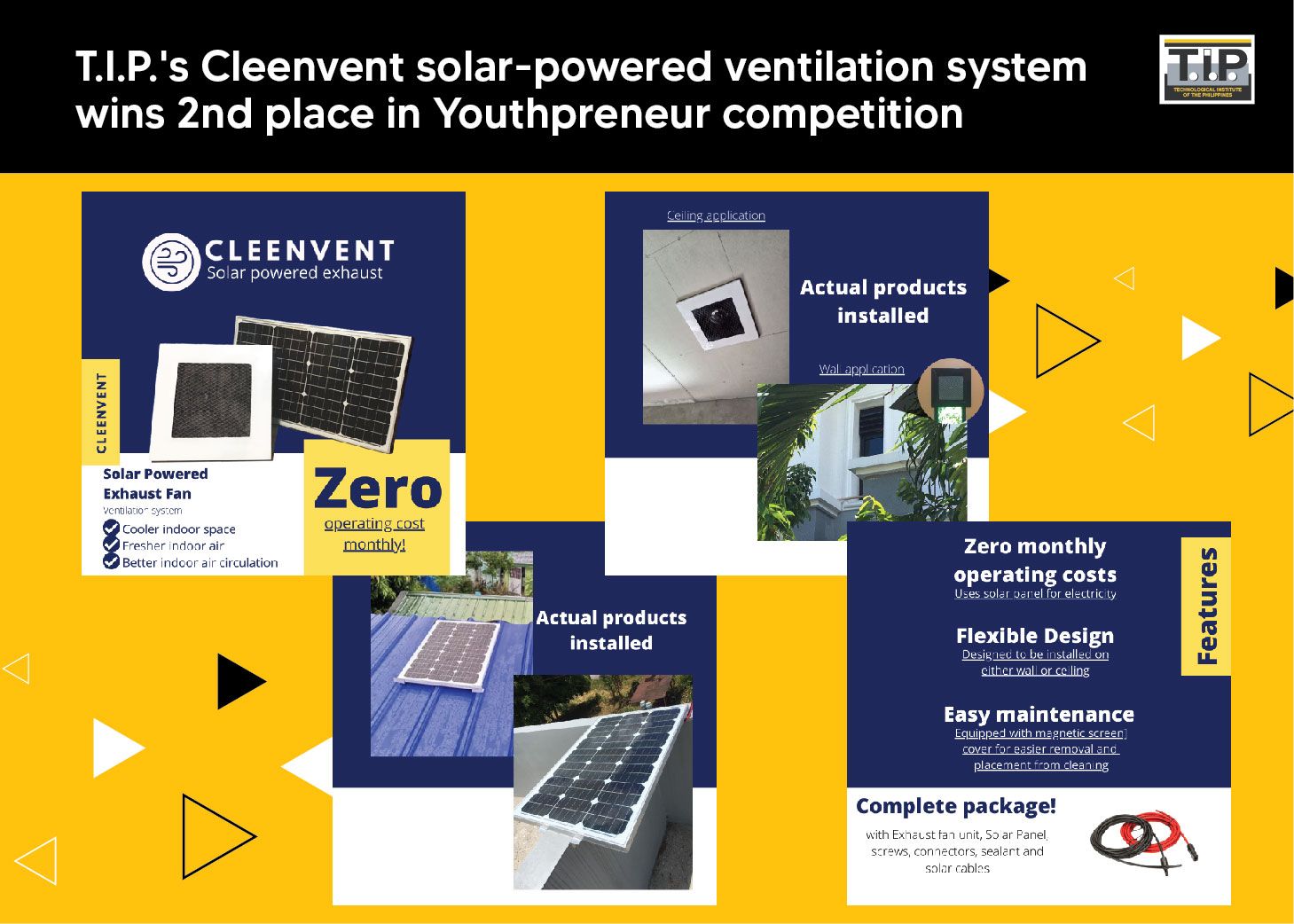
T.I.P.'s Cleenvent solar-powered ventilation system wins 2nd place in Youthpreneur competition
The Technological Institute of the Philippines (T.I.P.)'s Cleenvent solar-powered ventilation system bagged second place in the 2021 Youthpreneur in Action (YPIA) competition organized by Indonesia's Podomoro University.
A startup venture under the T.I.P. Nurture Innovation Technology Revolution Office (NITRO), Cleenvent promises "a better air environment for a better home," providing continuous proper ventilation in households and establishments by sucking indoor air out and bringing cooler air in.
"Good air quality allows for a healthy and more productive life, so Cleenvent is really a need especially this time when everyone's learning and working from home," said mechanical engineering senior and Cleenvent co-founder Raven Anot.
Anot and his team – composed of T.I.P. students, alumni, and industry partners – spent more than a year developing the automated ventilation system. Unlike typical exhaust fans commonly found in kitchens and restrooms, Cleenvent works on a wider scale and can be installed on walls, ceilings, or attics with zero operating costs.
"Cleenvent uses the sun's radiation to decrease temperature and humidity buildup inside our homes. It's powered by renewable energy so it does not contribute to consumers' electricity bills," Anot explained.
For T.I.P. Technopreneurship Coordinator Engr. Shearyl Arenas, Cleenvent is proof that there is no age requirement for being an entrepreneur. "If you have a great idea, pursue it. You can have your own venture even before graduation. It doesn't mean that you're a student, you can't create something impactful to the community," she said.
As part of the T.I.P. TechnoCoRe ecosystem, T.I.P. NITRO serves as the school’s incubation arm focused on bolstering, optimizing, and readying disruptive ideas into market-ready businesses. It is one of the 32 technology business incubators (TBI) established nationwide by the Department of Science and Technology - Philippine Council for Industry, Energy, and Emerging Technology Research and Development (DOST-PCIEERD).
An annual business idea pitching competition, YPIA brings student entrepreneurs from all over the globe to overcome world problems with innovative and practical solutions. More than 500 student teams joined this year's virtual event.
For more information on T.I.P., please visit tip.edu.ph or T.I.P.’s official social media accounts through @TIP1962official for Facebook, Twitter, and Instagram.

T.I.P.ians bag 1st place in industrial engineering conference with undergraduate research paper
A group of industrial engineering seniors from the Technological Institute of the Philippines (T.I.P.) Quezon City nabbed 1st place in the IEOM Society International First Central American and Carribean Conference with their undergraduate research paper titled "Minimizing the Effect of the Covid-19 Pandemic as One of the Supply Chain Disruption in a Timber Trade Sector."
Using secondary data analysis, researchers Christienne Austin Bernardo, Celenina Grace Cruz, Kate Antonette Dy, Hector Jamero, Norvin Mindoro, and John Russel Tan assessed the current state of the furniture industry, noting a tremendous decrease in sales and productivity because of the Covid-19 pandemic. Their recommendation: maximize the use of digital technology and online marketing strategies.
"This undertaking, apart from being a class requirement, was a test on the students' resilience and creativity. They had to make use of the available data given the circumstances," said research adviser Engr. Romalyn Galingan.
For T.I.P. Industrial Engineering Program Chair Engr. Arriane Palisoc, bagging first prize showcased the immense knowledge and capabilities of T.I.P. engineers.
"We always try to be responsive to the needs of the times; and since the pandemic is the most pressing issue as of late, conducting the research was only fitting and necessary," she said.
IEOM is a global non-profit organization dedicated to the advancement of industrial engineering and operations management amongst countries. It holds various conferences in a year to connect students and professionals with innovative and entrepreneurial minds.
Six groups battled it out in the undergraduate research category.
For more information on T.I.P., visit tip.edu.ph or T.I.P.’s official social media accounts through @TIP1962official for Facebook, Twitter, and Instagram.
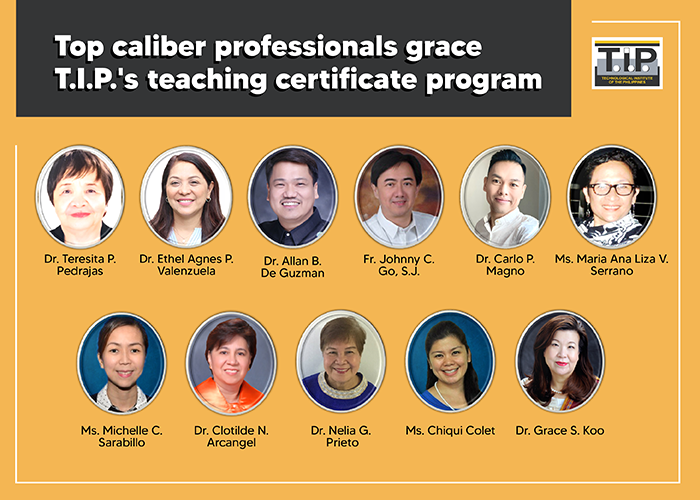
Top caliber professionals grace T.I.P.'s online teaching certificate program
The Technological Institute of the Philippines (T.I.P.) has signed a collaborative research agreement with Subic Water and Sewerage Co., Inc. for the project titled "Constructed Wetland for Wastewater Treatment of Effluent from a Water Provider."
T.I.P. and SUBICWATER formalized their partnership in a virtual conference led by T.I.P. President Dr. Elizabeth Quirino-Lahoz, SUBICWATER Chief Executive Officer Benjamin Antonio III, and Department of Science and Technology (DOST) Undersecretary for Research and Development Dr. Rowena Cristina Guevara.
The joint venture comes as T.I.P. positions itself as a viable partner and pushes for stronger academe-industry-government linkages. The project per se—which aims to reduce the concentration of wastewater pollutants through an integrated wetland system—is funded by the DOST through its Collaborative Research and Development to Leverage Philippine Economy (CRADLE) program, with the Philippine Council for Industry, Energy, and Emerging Technology Research and Development (PCIEERD) as the monitoring agency.
"Collaborative projects such as this provide the platform for students, faculty members, and researchers to work with industry partners and government agencies, thus making learning more relevant, meaningful and impactful. Learning by doing," said Dr. Quirino-Lahoz.
For SUBICWATER, the partnership "could not have come at a more perfect time." Citing the 2018 Boracay wastewater crisis and the stricter standards set by DAO 2021-19 for water effluent, Antonio said this collaborative effort is an opportunity to create “one of the most practical and cost-efficient options that we can use to address growing issues in sewerage management in the Philippines.”
Dr. Guevara, meanwhile, noted that with increased economic activity comes the need to protect and rehabilitate the island.
"Tourism opportunities provide economic vibrance enjoyed by local industries, most notable are businesses lined up in waterways that take advantage of spectacular views. Through research and development, we'll be able to strike a healthy balance between preserving the environment and providing much needed support to private industries," she added.
T.I.P.'s venture with SUBICWATER is the latest addition to the list of DOST CRADLE-sponsored projects of the institution, spearheaded by T.I.P. Manila's Chemical Engineering Department Chair Engr. Lorraine Carrillo and TechnoCoRe Catalyst Industry Relations and Senior Project Manager Dr. Therese May Alejandrino.
TechnoCoRe is T.I.P.'s thrust towards technopreneurship and collaborative applied research. It empowers students, faculty members, and researchers to work on innovative solutions to the problems of stakeholders, including government, industry, civic organizations, and society at large.
For more information on T.I.P., please visit tip.edu.ph or T.I.P.’s official social media accounts through @TIP1962official for Facebook, Twitter, and Instagram.
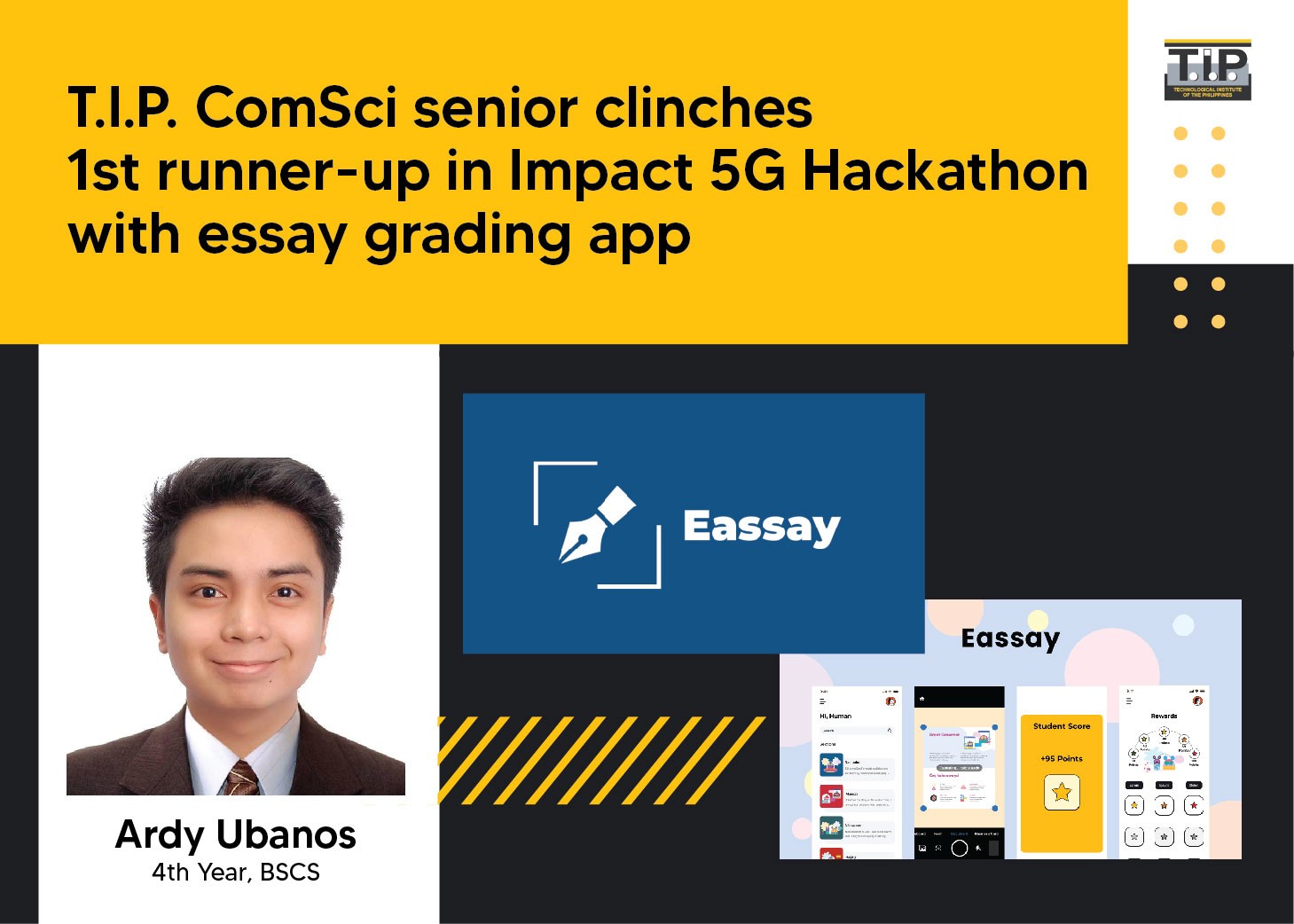
T.I.P. ComSci senior clinches 1st runner-up in Impact 5G Hackathon with essay grading app
A Computer Science senior from The Technological Institute of the Philippines (T.I.P.) Manila finished first runner-up in the education vertical of the Impact 5G Hackathon with his essay grading app, Eassay.
Ardy Ubanos represented the institution to compete alongside a team of students and professionals from across the country.
"Hackathons usually judge winners based on their work's innovativeness and not just relevance. This is what differentiated Eassay and eventually captured the interest of the jury," said T.I.P. Information Technology Program Chair Dr. Alexander A. Hernandez.
Powered by artificial intelligence, Eassay reads and grades essays based on input keywords. The more keywords an essay satisfies, the higher the score it gets. The app can be used in both classroom and workplace settings.
"We have automated test checkers for multiple choice exams but none for essay types. Based on research, teachers just usually look for keywords. Eassay does that job and instantly rates a printed or online paper, saving instructors time and energy. Companies can likewise use it for job hiring and customer service initiatives," Ubanos explained.
Eassay, which Ubanos developed for the whole three days of the competition, is now up for incubation under Impact 2050 for further improvements.
Impact 5G Hackathon is the longest-running hackathon in the country. A flagship program of Impact Hub Manila in collaboration with Smart and PLDT, it aims to decentralize opportunities and create impactful digital solutions for health, education, climate change, good governance, food and agriculture, indigenous people, and smart cities.
For more information on T.I.P., please tip.edu.ph or T.I.P.’s official social media accounts through @TIP1962official for Facebook, Twitter, and Instagram.

Teacher Teacher, A Tribute To Teachers Everywhere
Eight years ago, the Technological Institute of the Philippines (T.I.P.) published a book entitled Teacher Teacher as part of its 50th anniversary celebration. The book gave honor and praise, not just to the teachers who had been with T.I.P. since the beginning, but also to all the teachers who are working hard to educate generations and generations of Filipinos, so they too, can have a better future.
T.I.P. founders Engr. Demetrio A. Quirino and Dr. Teresita U. Quirino started out as teachers themselves before they acted on their vision of doing more for the Filipino youth by founding an engineering educational institution. Since 1962, T.I.P. has been transforming students into graduates with full competence in their fields of studies and who also possess Filipino values, industry-desired values, and global citizen values.
Teachers are the most significant component of any educational institution’s success. The book Teacher Teacher is T.I.P.’s way of giving thanks and showing appreciation for its teachers’ tireless efforts to meet the vision of the T.I.P. founders: to make T.I.P. the leading professional technological institution in the Philippines and to produce graduates who contribute to the welfare of society.
With the shift to the new normal, T.I.P. understands that it is not just students who are experiencing challenges but teachers as well. The re-release of the book Teacher Teacher hopes to bring more inspiration to educators to continue giving their best in educating their students so they too can also be the best version of themselves.
T.I.P. shares this book with everyone.
Please click on this link to access some essays from the book Teacher Teacher, A Tribute to Teachers Everywhere -- http://bit.ly/TeacherTeacherSelectedEssays

T.I.P. student innovations win golds, silvers in first-ever MIPIBIEx
Six groups of senior high school students from the Technological Institute of the Philippines (T.I.P.) Manila brought home three golds and three silvers from the 1st Manila Intellectual Property Innovation and Business Incubation Expo 2021.
Five of the six entries focused on creating solutions for the country’s problem in water hyacinth invading large bodies of water like the Pasig River while the other one concentrated on utilizing pineapple stem, one of the waste products in pineapple production.
These researches of the 44 senior high school students of T.I.P. Manila aimed to reduce the growth of water hyacinths while taking advantage of its usefulness and introducing its viability of becoming a source of income for a community. Their hard work produced a variety of innovative products made from water hyacinth and pineapple stem. The six entries are as follows:
- Utilization of Pineapple Stems (Ananas Comosus) in Producing Starch-Based Bioplastic (gold) by student researchers Kimaru Cerda, Arnie Gerome De Guzman, Almira Caryl De Mesa, Rizza Mae Mamangon, Jade Niño Nemis, Kayla Santelices, and Syl Norman Vidal.
- Vegan Leather: The Reinforcement of a Sustainable Manufactured Products Using Water Hyacinth Stems as Raw Material (gold) by student researchers Shania Pumicpic, Yves Jun Barcenilla, Jamie Amandaleigh Enriquez, Gene Paolo Espiritu, Lloyd Martin Hollero, Jana Marie Sadicon, Edward Louis Eisen Saga, and Ann Kassiel San Jose
- Utilization of Water Hyacinth (E. crassipes) Fibers as Yarn for Production of Organic Gloves (gold) by student researchers Enrique Raphael Bondoc, Kyle Leo Sartorio, Vince Matthew Ignacio, John Marco Coralde, Carl Andrew Palabasan, Nomer Sadiasa, and Paolo Miguel Bulanon.
- Feasibility Study of Water Hyacinth Eichhornia crassipes Board as a Sustainable Innovation (silver) by students researchers Jylcian Paul Asauro, John Jerwin Bautista, Yasmaine Abigail Maraña, John Patrick Peros, Samantha Pauline Ramos, and Alethea Erika Vargas.
- Source of Energy: Utilization of Water Hyacinth as a Main Component of Charcoal Briquette (silver) by students researchers Mark Aldrin Santos, Rob Ryan Baluyot, Ludwig Liam Hapor, Ryndle Carl Obar, Matthew James Pilar, Samuel Sandoval, Rod Jacob Brent Tapang, and Vhinze Aarinze Zoleta.
- Launching of HyaTerminatre v1.0: A Collector of Seed and Stolon from Eichhornia crassipes (silver) by student researchers Rhea Mae Bucio, Maui Christ Ierathel Flores, Jessie Israel Vladimir Grados, Harvin Leyran, Dhan Marie Karl Lomanog, Joshua James Pagaoa, Ricardo Puri, and Sophia Shane Robles.
Three of the six groups also received special awards from the competition: Special Honour of Invention (Organic Gloves and Starch-Based Bioplastic), Manila Seal of Excellence (Organic Gloves); and Best Video and Top 3 Product Innovation (HyaTerminatre).
Winning three golds and three silvers was a big accomplishment to T.I.P. Manila’s Senior High School department. Dr. Glorielyn Lucas-Camerino, Principal, said, “T.I.P's mantra of lifelong learning, problem-solving, and innovation made our student representatives win. From the onset, T.I.P.ians are trained to become research-oriented to find solutions to social and environmental problems and help champion sustainable development goals.”
Mr. Jose Antonio B. Orcine, Mathematics and Research Teacher, introduced the existing problem of water hyacinth invasion to the researchers. He proposed the application of Problem - Based Learning, the teaching method in which real-world problems are used to promote student learning, to be the framework students used for their researches.
A total of 65 groups participated but only 19 qualified for the finals in the student category of the competition. The students virtually presented to a panel of judges from different organizations like JCI Makati and Ayala Foundation.
MIPIBIEx is a division-wide competition organized by the Division of City Schools-Manila Innovation Council in partnership with the City Government of Manila and other stakeholders.
For more information on T.I.P., please tip.edu.ph or T.I.P.’s official social media accounts through @TIP1962official for Facebook, Twitter, and Instagram.
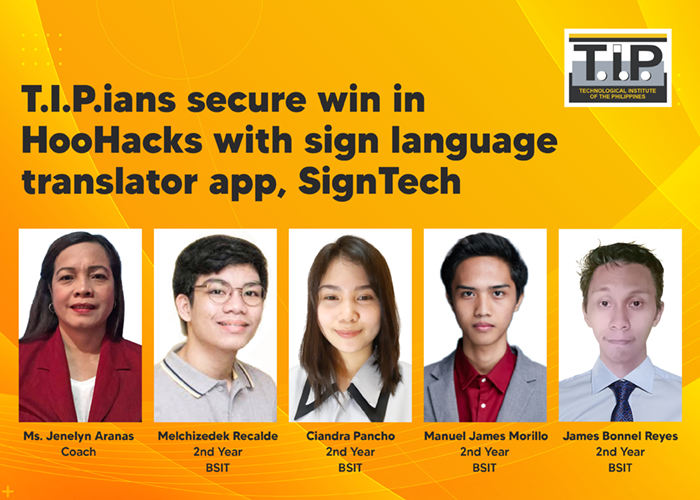
T.I.P.ians secure win in HooHacks with sign language translator app, SignTech
A group of IT students from the Technological Institute of the Philippines (T.I.P.) Manila bagged second prize from the Accessibility and Empowerment Prize Track Category of HooHacks Hackathon 2021, an international competition organized by the University of Virginia, Charlottesville, Virginia.
Second-year Bachelor of Science in Information Technology (BSIT) students Manuel James Morillo, Melchizedek Recalde, Ciandra Pancho, and James Bonnel Reyes with the guidance of their coach Ms. Jenelyn Aranas bested other teams from across the world with their sign language translator application called SignTech, an app designed to make communication easier and possible between deaf and mute people and people who can speak.
The SignTech app is divided into four parts: the Learn Section which contains a number of Youtube video tutorials and articles on sign language; the Maps which shows deaf-and-mute-friendly establishments nearby; the Sign Language Translation which users can use to translate sign language by video recording it; and last is the Speech-to-Text section which translates spoken words into text for a mute and deaf person to read. These components of the app make it accessible for both speaking and mute-deaf users.
The four T.I.P. participants understand the importance of communication in everyday life and are keenly aware that not all people can communicate as easily as others, particularly deaf and hard-of-hearing individuals. With the desire to assist people with this specific disability, the group decided to compete in the Accessibility and Empowerment track where they showcased SignTech. The group believes the app shall not just benefit people with disabilities, it shall also help everyone else understand sign language, bridging the communication gap between deaf-and-mute individuals and non-disabled people.
T.I.P. students have been winning and joining competitions for many years now and each achievement shows how successful the institution is in honing the knowledge and skills the students need in their chosen field of expertise. The institution supports and encourages T.I.P.ians who want to showcase their skills in their field of study by participating and competing in local and international competitions; believing each experience is essential to their growth as students and as professionals.
Dr. Jonathan Caballero, Dean, College of Information Technology Education (CITE) and concurrent Program Chair, Computer Science, noted, “Winning in the hackathon proves that T.I.P. students are well prepared to solve real-life complex computing problems using innovative techniques and tools as well as showcasing the problem-solving skills in designing the solution learned from T.I.P.’s computing program.”
For more information on T.I.P., please tip.edu.ph or T.I.P.’s official social media accounts through @TIP1962official for Facebook, Twitter, and Instagram.
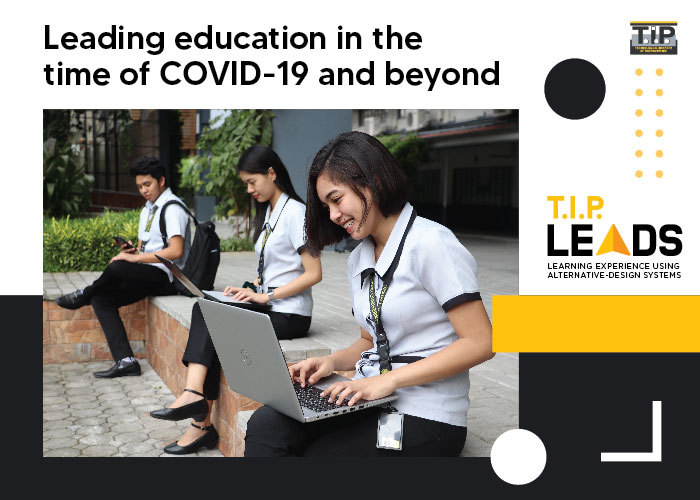
T.I.P.: Leading education in the time of COVID-19 and beyond
2020 was historic for the Philippine education system. With the COVID-19 pandemic forcing everyone to stay at home and to practice physical distancing, education around the country had to evolve quickly. Like all other schools, T.I.P. was forced to trade the familiarity of physical classrooms for the safety of remote learning. Education could not stop and its continuity was paramount.
As a 59-year old institution, T.I.P. has surpassed various challenges that shaped it into one of the country’s top engineering schools. Meeting this new challenge of the pandemic head on, T.I.P. implemented online and flexible learning for all its students across Senior High School, College, and Graduate Programs starting March 2020.
Fortunately for T.I.P.’s students, the school was no stranger to online learning.
Even before the pandemic, T.I.P. 's students and teachers had already engaged in non-traditional learning methods to augment face-to-face classes. All these efforts were consolidated starting the 2nd Semester of School Year 2019-2020, with T.I.P. officially tapping Canvas as its exclusive learning management system (LMS). During the Summer 2020 term, T.I.P. was one of the few institutions in the country and in the National Capital Region to offer fully online learning.
By mid 2020, just a few months into the pandemic, T.I.P. reengineered its education ecosystem to fit the unique needs of online learning and online service delivery to its students. The T.I.P. culture of continuous improvement and its track record as an accomplished engineering institution allowed the school to be steadfast in this new educational climate.
Aggressive in-service training in all levels, across all levels, was conducted. Teaching personnel were especially trained for platform-appropriate educational delivery. Even T.I.P. services were recalibrated and the processes were redesigned. Moreover, the school created student-centric learning policies to make remote learning as welcoming as possible for the entire community.
All these efforts further ensure that though the modality may be different, the outcomes shall remain the same: T.I.P.ians enjoy the same quality, relevant, and responsive education that empowers them towards a successful future. In fact, with the job market undoubtedly tougher during this pandemic, T.I.P. is further driven to provide its students with the best industry-relevant education they deserve. What this means is T.I.P. students shall graduate with full competence in their fields of study, equipped with the desirable traits highly sought after by employers.
This is what T.I.P. ultimately seeks to accomplish—its sole purpose since its inception in 1962: to provide a better life for Filipinos by empowering its students with the best globally competitive technological education.
For a year now, the school has vigilantly innovated its online and flexible learning modality under the banner of T.I.P. LEADS—Learning Experience using Alternative-Design Systems. T.I.P. LEADS is the collectivity of all these student-centric efforts undertaken to make the remote learning experience better for T.I.P.ians.
The components of T.I.P. LEADS include a re-engineered education ecosystem; strengthened IT infrastructure; a synergistic delivery of student services through the online T.I.P. Student Well-being Program; the transition of its Career Center into a virtual one, a modular delivery of courses for undergraduate students; free online tutorial and study group service; and a very accessible online library service.
Furthermore, T.I.P.’s online learning pace has been made to be more student-friendly. Now, T.I.P. students experience just the right amount of live class hours and weekly school requirements for a better student-life balance. Not to mention the introduction of regular academic breaks—called T.I.P. Academic Breathers— every other Friday whenever possible, to provide T.I.P.ians an extra day of rest.
Still, T.I.P. shall not rest in its continuous improvement initiatives. Rather, T.I.P. is evermore driven to continuously innovate itself for the betterment of its students’ lives, to preserve global excellence, and to continue being a leading provider of engineering, computing, and technological education in the Philippines.
For more information on T.I.P., please tip.edu.ph or T.I.P.’s official social media accounts through @TIP1962official for Facebook, Twitter, and Instagram.
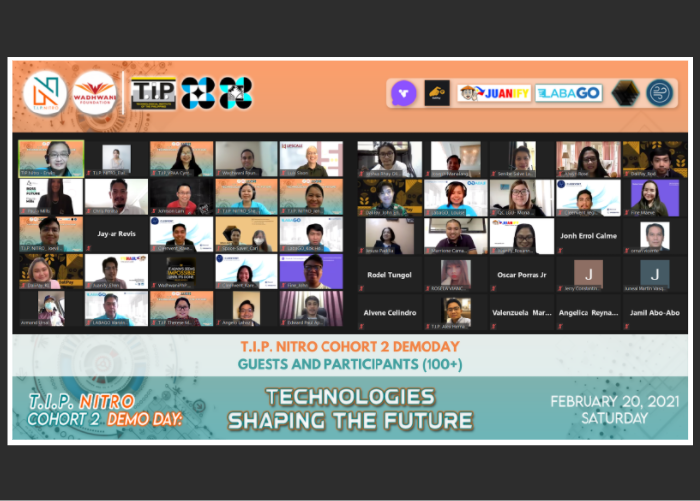
6 technology startups graduate from T.I.P.-Wadhwani incubation program
The Technological Institute of the Philippines (T.I.P.) and partner Wadhwani Foundation last February 20, 2021 concluded the 4-month virtual incubation program of T.I.P.’s technology startups. Incubated under the Department of Science and Technology-funded (DOST) T.I.P. Nurture Innovation Technology Revolution Office (NITRO) program, the incubation program cohorts were composed of T.I.P. undergraduate students, alumni, and industry professionals.
Dubbed the T.I.P. NITRO Cohort 2 Demo Day, the event saw the six teams pitching to judges from esteemed organizations based locally and abroad.
The six cohorts’ technology startups cover a wide variety of industries and applications. They include: (1) Cleenvent, a startup that aims to provide better air quality inside homes; (2) Dalipay, a contactless payment option utilizing artificial intelligence (AI), blockchain security, and palm vein biometrics; (3) Fine, a social networking platform dedicated to mental health support and services; (4) Juanify, an AI-powered food delivery services aggregator for small and medium enterprises; (5) LabaGo, a mobile application for laundry pickup and delivery services; and (6) Space-saver Furniture, a developer of various types of multi-functional and space-saving furniture designed for small living spaces.
On top of receiving valuable feedback and insights from the judges, this momentous event also served as an opportunity for the cohorts to network with guests and partners to further grow their respective businesses.
“We would like to thank all our partners and mentors for going through this journey with us. Enabling and empowering such innovative ventures is one of the core mantras of our new T.I.P. TechnoCoRe thrust. On top of active applied research collaborations with industry, T.I.P. TechnoCoRe develops technopreneurs who can identify societal problems, ideate possible answers, develop real-world solutions, and bring these out to market,” said T.I.P. President Dr. Elizabeth Quirino-Lahoz.
T.I.P. NITRO is one of 32 technology business incubators (TBI) to be established by the DOST-Philippine Council for Industry, Energy, and Emerging Technology Research and Development (DOST-PCIEERD) nationwide as of 2020. As part of the T.I.P. TechnoCoRe ecosystem, T.I.P. NITRO serves as the school’s incubation arm focused on bolstering, optimizing, and readying disruptive ideas into market-ready businesses.
“DOST-PCIEERD supports T.I.P. NITRO’s initiative in building an enabling innovation ecosystem to nurture tech innovators, entrepreneurs, and startups from conception to commercialization. I hope NITRO becomes a rallying point for all the innovative initiatives that are coming from T.I.P. by way of the creativity and resourcefulness of the school’s students and faculty members,” said DOST-PCIEERD Executive Director Dr. Enrico Paringit.
The event’s judges included Paula Mills, CEO of Australia-based Academy of Entrepreneurs; Christopher Peralta, CEO & Founder of US-based Silicon Valley HQ; Johnson Lam, Founder and Owner of Malaysia-based Kakidiy.com; Dr. Luis Sison, Director of the University of the Philippines Technology Transfer and Business Development Office; Mona Yap, Officer-in-Charge of the Quezon City Small Business Cooperatives Development Promotions Office; and Alwyn Rosel, Head of the Startup Development Program of IdeaSpace & QBo Philippines.
Also present during the event were Ankit Macchar, Program Head of the Wadhwani Foundation’s National Entrepreneur Network; Cris Delgado, Program Manager of Wadhwani Foundation Philippines; Engr. Edward Paul Apigo, Senior Science Research Specialist of DOST-PCIEERD; Atty. William Bierce, Managing Attorney and Co-Founder of Bierce and Kenerson, PC; Engr. Armand Ursal Vice President of Engineering of Quest Broadcasting, Inc and former Vice President for External Affairs of the Institute of Electronics Engineers of the Philippines (IECEP); Engrs. Romulo Agatep and Ornan Vicente, both former Presidents of IECEP; Jhaze Asuncion, CMO and Co-Founder of Blackbook Solutions Inc.; and Marrione Pol Camacho, Academy Manager of Draper Startup House Manila.
For more information on T.I.P. and T.I.P. TechnoCoRe, visit T.I.P.’s official social media accounts through @TIP1962official for Facebook, Twitter, and Instagram. You may also visit technocore.tip.edu.ph or email technocore@tip.edu.ph.
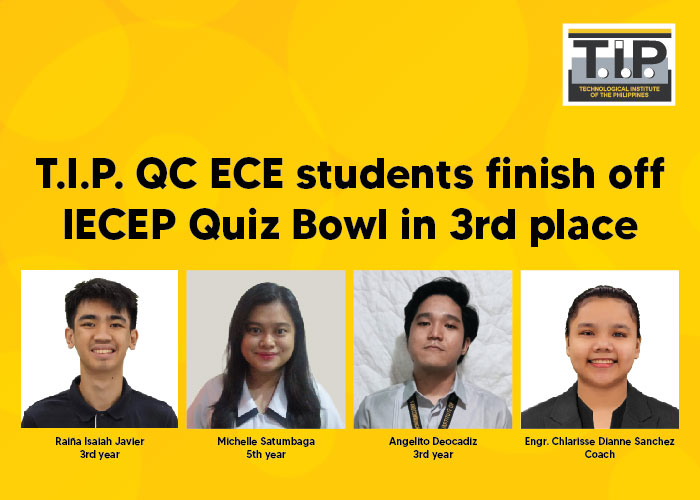
T.I.P. QC ECE students finish off nat’l electronics engineer competition in 3rd place
Three Electronics Engineering students from the Technological Institute of the Philippines Quezon City (T.I.P. QC) won 3rd place in the recently concluded Institute of Electronics Engineer of the Philippines (IECEP) Quiz Bowl, besting 40 other teams of Electronics Engineering students from different schools from across the country.
Angelito Deocadiz (3rd year), Raiña Isaiah Javier (3rd year), and Michelle Satumbaga (5th year) with backup member Jon Rae Romanillos (2nd year) finished the national competition in the third spot under the guidance of Engr. Chlarisse Dianne Sanchez, earning them certificates, a cash prize, and a scholarship in Excel Review Center per member.
The IECEP Quiz Bowl is an annual event organized by the Institute of Electronics Engineer of the Philippines (IECEP) Quezon City Student Chapter. This year was the IECEP Manila Student Chapter’s first-ever Quiz Bowl event.
All participating teams in this year’s IECEP Quiz Bowl went through an elimination process wherein each member of a team answered a different set of examinations within two hours. Teams were then ranked according to the sum of each member’s scores and only the top 10 teams moved on to the final round.
Since the T.I.P. team ranked 4th in the elimination round, they proceeded to the final round where each team was placed in a breakout room to discuss their answers to the quiz that was divided into easy, average, and difficult rounds.
As an engineering school, T.I.P. actively joins annual competitions such as the IECEP Quiz Bowl to challenge and enhance the technical and analytical skills of its students. Javier, one of the IECEP Quiz Bowl participants, said, “Joining the competition gave me an opportunity to test the knowledge I gained during my years of schooling. Winning the competition helped me realize how near I am towards my goal.”
Engr. Sanchez, the team’s coach, further shares what she wants her ECE students to gain from this annual event, “I want to bring out the best in them, to take them out of their comfort zones, to help them take risks, and open opportunities for them.” She added, “Their success is our success, and winning is just a bonus.”
For more information on T.I.P., please visit www.tip.edu.ph or the school’s official social media accounts through @TIP1962official for Facebook, Twitter, and Instagram.
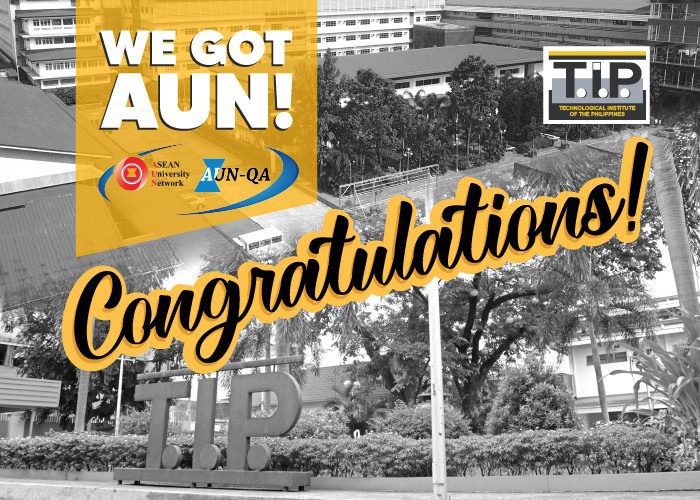
T.I.P. gets international AUN-QA accreditation for its four programs
The Technological Institute of the Philippines (T.I.P.) successfully gained another set of international recognition, this time from the ASEAN University Network - Quality Assurance (AUN-QA) for T.I.P. Manila’s Architecture and Business Administration programs and T.I.P. Quezon City’s Accountancy and Secondary Education programs. The AUN-QA program assessment was fully conducted virtually by a team of AUN-QA assessors last February 8-12, 2021.
“Since 2013, T.I.P.'s 20 engineering and computing programs have enjoyed international validation of their quality from the US-based ABET Engineering Accreditation Commission (EAC) and Computing Accreditation Commission (CAC). Now, our programs in Accountancy, Architecture, Business Administration, and Secondary Education are also internationally assessed through the AUN-QA system. This latest accomplishment is proof that these four programs are up to par with the educational quality standards in the entire ASEAN region,” commented Dr. Elizabeth Quirino-Lahoz.
During the 5-day virtual assessment, the four programs of T.I.P. were found to have adequately fulfilled the 11 criteria set by AUN-QA. The full implementation of the criteria by T.I.P. was supported by evidence which reflected consistent results by the institution.
The ASEAN University Network is an international organization that promotes cooperation among higher education institutions in the ASEAN region. Its assessment arm is AUN QA, responsible for educational standards and continuous academic improvement of ASEAN schools. AUN QA assessors are composed of chief quality officers appointed by AUN member universities.
Currently, T.I.P. is also an associate member of AUN-QA, and to date, is one of only 16 schools in the Philippines to have such a status with the assessing body.
“This assessment is a value-adding effort done ultimately for the benefit of T.I.P. students. Through their programs’ local and international accreditations, T.I.P. students are ensured that they are getting high-quality education that molds them into well-rounded and comprehensively skilled individuals—ones who can make a difference once they step outside of the classroom and join the workforce or set up their own business,” concluded Dr. Lahoz.
For more information on T.I.P., please tip.edu.ph or T.I.P.’s official social media accounts through @TIP1962official for Facebook, Twitter, and Instagram.

T.I.P. tapped as trainer for Conservation International Philippines’ green-gray program
The Technological Institute of the Philippines (T.I.P.) closed out 2020 with a consultancy and training engagement with the Conservation International Philippines’ (CIP) green-gray infrastructure capacity building program. The environmental sustainability partnership between the two organizations was formalized last September 1, 2020, with the training sessions happening October and November last year.
As one of the country’s top technological schools, T.I.P. lent its civil engineering and architecture expertise in CIP’s training sessions attended by LGUs, municipal engineers, and construction contractors who are currently implementing green-gray solutions in their respective communities. Specifically, the program focused on efficient green-gray infrastructure (GGI) designs which take into account the unique ecosystems, processes, and construction materials available for each locality.
Participating in the training program were representatives from: the Provincial Governments of Batangas, Iloilo, Marinduque, Occidental Mindoro, and Oriental Mindoro; the Iloilo municipalities of Ajuy, Batad, Concepcion, and Estancia; Department of Environment and Natural Resources IV-A and IV-B; Department of the Interior and Local Government IV-B; Department of Public Works and Highways; National Economic and Development Authority IV-A and IV-B; and the Iloilo Caucus of Development Non-Government Organizations, Inc. (iCode).
GGI designs are hybrid solutions that combine the restoration of natural systems (such as forests, mangroves, and wetlands) with conventional, man-made solutions (such as water treatment facilities, seawalls, and dams) to deliver climate change resilience and adaptation benefits for both ecosystems and communities. Nature is preserved and protected from further damage, while communities are made much more resilient against floods, storms, droughts, and other effects of global warming.
“Everyone has a big role to play in humanity’s fight against climate change. As an engineering school, one of the ways T.I.P. contributes to this battle is through sharing its expertise in and insights on sustainable engineering and architecture practices. In being a consultant and trainer, T.I.P. helps lay the foundation for a future where such green initiatives are the standard and the norm throughout the country. T.I.P. is thankful and humbled to have been tapped by CIP for this significant endeavor,” commented T.I.P. Senior Vice President Angelo Lahoz.
As an offshoot of this T.I.P.-CIP partnership, T.I.P. is also a pioneer member of the Global Community of Practice on Green-Gray Adaptation, an international multi-sectoral group taking a holistic approach to GGI designs. Other pioneer members are the University of Melbourne, City University of New York, and other international organizations. T.I.P. also participated in finalizing the updated version of CIP’s Practical Guide to Implementing Green-Gray Infrastructure, a primer for implementing GGI designs that better serve vulnerable communities.
With the goal of sustaining the T.I.P.-CIP partnership, new programs are now being mapped out to promote GGI designs locally and abroad. The GGI designs and guides for implementation of government agencies and other private organizations are some of the key targets this year.
This partnership is made possible by T.I.P. TechnoCoRe, T.I.P.’s thrust towards Industry-Academe Collaborative Applied Research. As an institutional direction, TechnoCoRe enables T.I.P. researchers and faculty members to participate in nation-building and solution-generating efforts with the full support of the school. For more information on T.I.P. and T.I.P. TechnoCoRe, please visit T.I.P.’s official social media accounts through @TIP1962official for Facebook, Twitter, and Instagram. You may also visit technocore.tip.edu.ph or email technocore@tip.edu.ph.

PAASE and T.I.P. formalize partnership to step up local science, engineering, and research
The Philippine-American Academy of Science and Engineering (PAASE) and the Technological Institute of the Philippines (T.I.P.) formalized their partnership via a virtual Memorandum of Understanding (MOU) signing held last January 25, 2021. The PAASE-T.I.P. partnership shall entail the training of future science and technology leaders as well as close cooperation in T.I.P.’s innovation center projects.
Representing the two organizations were PAASE President Dr. Gisela Concepcion and T.I.P. President Dr. Elizabeth Quirino-Lahoz. Serving as witnesses were PAASE President-Elect 2022-2023 Dr. Mariano Sto. Domingo; PAASE Founding Member and 2nd PAASE President Dr. Jose Cruz; T.I.P. Senior Vice President Angelo Lahoz; and T.I.P. Quezon City Vice President for Academic Affairs Dr. Cynthia Llanes.
“This MOU is a milestone for PAASE. It is our first agreement to be signed with a higher education institution—T.I.P.—to offer Filipinos the highest quality of STEM education. T.I.P.’s aim to likewise promote science and engineering research, development, and entrepreneurship also resonates well with our mandate and goals at PAASE. The collaboration between PAASE and T.I.P. is very likely to succeed and to yield positive outcomes,” commented PAASE President Dr. Gisela Concepcion.
PAASE is a non-profit organization composed of scientists and engineers of Philippine descent who have distinguished themselves in scholarly and research related activities. It has over 230 members from all over the world specializing in diverse fields of study, including physics, chemistry, biology, medicine, mathematics, computer science, and engineering.
The MOU paves the way for T.I.P. to tap PAASE members as visiting professors who shall teach online courses in the school’s undergraduate and graduate programs. The first priority under this term of the partnership is for PAASE industry experts to serve as online guest lecturers in T.I.P.'s Graduate Programs, such as in the PhD in Computer Science and Professional Science Master’s in Data Science programs.
“A primary objective of PAASE is to promote contacts and collaborations among Filipino scientists the world over, and to help the Philippines in her efforts to advance science and engineering teaching and research in our country. Today's MOU directly supports this aim,” explained Dr. Jose Cruz.
“Raising the economic welfare of the Philippines and the well-being of Filipinos would be more likely to occur with wise application of science, technology, and innovation. This means a need for more computer scientists and data scientists. Formal degree programs in these fields are the quickest ways to reach critical mass in this sector of the workforce,” Dr. Cruz added.
Additionally, T.I.P. may also tap PAASE members to serve as Research Fellows and Research Consultants for projects under T.I.P.’s innovation center called T.I.P. TechnoCoRe. As the engineering school’s technopreneurship and collaborative applied research thrust, T.I.P. TechnoCoRe enables T.I.P. researchers and faculty members to participate in nation-building and solution-generating efforts with the full support of the school. T.I.P. TechnoCoRe has most recently worked with eminent PAASE member Dr. Vince Faustino, an Intensivist at the Yale University School of Medicine, and other civil society groups for the SiglaVent Automated Emergency Ventilator project.
“Collaboration is the only way to go. This was the case before the pandemic, but now, even more so, during the pandemic. PAASE and T.I.P. have a common thrust in strengthening science and engineering teaching and research in the country. With our two organizations coming together, the possibilities are endless. I am in awe of PAASE’s credentials and I look forward to a fruitful, working partnership with its members,” concluded T.I.P. President Dr. Elizabeth Quirino-Lahoz.
Learn more about PAASE by visiting paase.org/about-paase. For more information on T.I.P. and T.I.P. TechnoCoRe, please visit tip.edu.ph or T.I.P.’s official social media accounts through @TIP1962official for Facebook, Twitter, and Instagram. You may also visit technocore.tip.edu.ph or email technocore@tip.edu.ph.
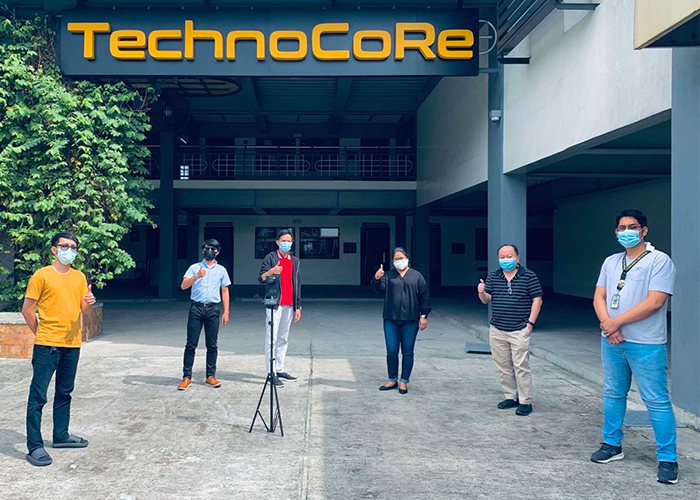
T.I.P. partners with Applied Machining Corporation for integrated temperature-attendance monitoring system against COVID-19
The Technological Institute of the Philippines (T.I.P.) and Applied Machining Corporation (AMC) are in the final phase of producing a Filipino-designed temperature scanner that can be integrated with a company’s attendance monitoring system. Called the duoSENSE, the T.I.P.-developed device shall enable more efficient health monitoring and COVID-19 contact tracing efforts initially in AMC’s headquarters in Biñan, Laguna.
The engineering school’s duoSENSE device is a contactless elevated skin temperature scanner that uses two infrared sensors. Unlike conventional scanners which lack calibration features, duoSENSE can be calibrated based on certification standards, allowing it to take highly accurate body thermal readings despite varying environmental temperatures. This allows it to be reliable in the long run without becoming less and less accurate over time, as is the risk with conventional infrared thermometers.
Moreover, duoSENSE was developed to work with AMC’s existing attendance monitoring system, a feature absent on traditionally standalone temperature scanners. The data from T.I.P.’s device can automatically be recorded, gathered, transported, and integrated with a company’s existing systems and databases.
“The T.I.P. duoSENSE solves the inefficiency and accuracy issues of common infrared thermometers, ensuring that companies can keep their workforces safe in our continuing battle against COVID-19,” commented T.I.P. Senior Vice President Angelo Lahoz.
“On top of integrating traditionally separate health monitoring and attendance systems, duoSENSE also enables employees to report into work much quicker without being hindered by manual logging processes. Companies also save valuable resources and can facilitate better contact tracing because they do not have to manually consolidate attendance and temperature records. We thank AMC for trusting T.I.P. with this significant endeavor,” Mr. Lahoz further explained.
The T.I.P. duoSENSE project was designed and developed over the course of seven months by T.I.P.’s team of expert engineers in close cooperation with AMC. This timeline involved circuit design, device prototyping, performance evaluation, and product iterations to ensure that duoSENSE is reliable, accurate, can be certifiably calibrated, and is seamlessly integrated with AMC’s attendance system.
This project between T.I.P. and AMC is made possible by T.I.P. TechnoCoRe, T.I.P.’s institutional direction towards Industry-Academe Collaborative Applied Research. This thrust enables T.I.P., its researchers, and its faculty members to help Philippine organizations address their pain points through innovative, solution-generating efforts. T.I.P. TechnoCoRe also provides industry partners with an innovative and inquisitive workforce for key projects beyond the scope of their organizational capabilities. For more information on T.I.P. and T.I.P. TechnoCoRe, please visit T.I.P.’s official social media accounts through @TIP1962official for Facebook, Twitter, and Instagram. You may also visit technocore.tip.edu.ph or email technocore@tip.edu.ph.
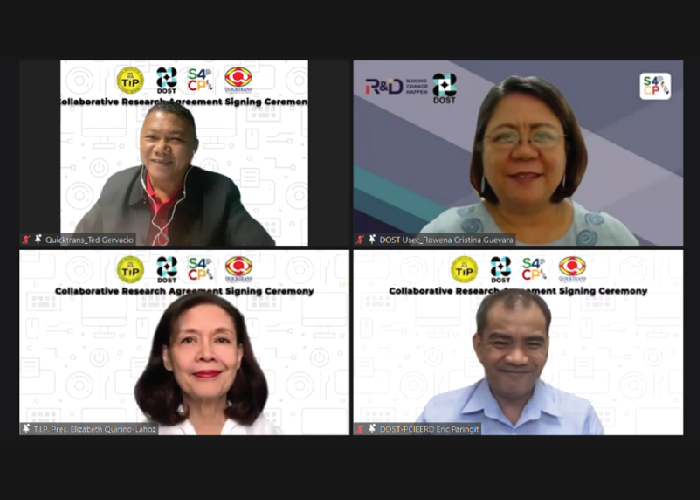
DOST, QuickTrans, T.I.P. tie up to upgrade truck driver skills through AI
The Technological Institute of the Philippines (T.I.P.) recently gained Department of Science and Technology (DOST) funding for its DRIVER.PH project, an endeavor that aims to help improve the skills of Philippine truckers through the Internet of Things (IoT), artificial intelligence (AI), and data analytics. The partnership was formally inked in a virtual MOA signing last February 23, 2021, with Quicktrans Cargo Moving, Inc. serving as DRIVER.PH’s first technology adopter.
DRIVER.PH is T.I.P.’s 2nd project conducted through the DOST Collaborative Research and Development to Leverage Philippine Economy (CRADLE) program under its Science for Change Program (S4CP). Monitored by the DOST - Philippine Council for Industry, Energy, and Emerging Technology Research and Development (DOST-PCIEERD), it is also the 9th project granted to T.I.P. through the DOST Grants-In-Aid research fund since 2014.
The DRIVER.PH or “Drivers Roadworthiness Improvement Verification Education and Readiness for the Philippine Logistics Industry” project is an end-to-end solution that utilizes software and hardware solutions tied together through IoT, AI, and data analytics.
“Supporting research and development is always in DOST’s agenda because these make positive changes happen. We are driven to foster collaborations between private companies where we can accelerate tech production and materialization. After all, it is only when research becomes useful and tangible that we consider R&D to be completed,” stated DOST Undersecretary for Research and Development Dr. Rowena Cristina Guevara.
DOST PCIEERD Executive Director Dr. Enrico Paringit added, “We see a huge potential in this endeavor and we want to see it to fruition. Because what you can do with a truck, you can do for other transportation networks. The potential coming out of this project is limitless. We’re hopeful that this will be successful and become very much relevant.”
According to the Metropolitan Manila Development Authority (MMDA) 2019 Metro Manila Accident Reporting and Analysis System (MMARAS) Annual Report, 18,667 trucks were involved in road accidents in the region. With trucks being the primary means for land-based logistics in the country, freight companies need their truckers to be safer and more efficient on the road.
"In my 40 years of experience, we’ve always had the dream of having world-class truck drivers. This is a step towards the realization of that dream. DRIVER.PH aims to professionalize the trucking sector by professionalizing and improving the skills of our truck drivers. Through this, we can more reliably transport goods and necessities to every Filipino,” said Quicktrans CEO Mr. Teddy Gervacio on the project.
Specifically, DRIVER.PH gamifies the driving experience both on and off the road. On the road, trucks will be equipped with IoT devices that monitor and record a driver’s road habits and technical skills, including information related to location, turning, speed, acceleration, braking, and stopping. These data are then sent to the cloud for data analysis powered by artificial intelligence. Off the road, DRIVER.PH also provides driver education modules and interactive lessons to further refine driver skills and vehicle roadworthiness knowledge. Likewise, the data gathered in these sessions are analyzed through AI. DRIVER.PH will then recommend areas for improvement, with results continuously refined with every trip and lesson the driver takes.
The result is a scientific and objective evaluation of a truck driver’s road competence, which the three organizations agree shall lead to safer and more efficient trucking.
“T.I.P. provides relevant technological education that encourages students to apply their competencies, mindsets, and values in science and technology to serve the needs of industry or to pursue technopreneurship to solve societal problems. The DRIVER.PH project is one such excellent experiential opportunity for both T.I.P. faculty members and students,” concluded T.I.P. President Dr. Elizabeth Quirino-Lahoz about the opportunity.
Just recently, T.I.P. Senior Vice President Angelo Q. Lahoz guested on DZMM TeleRadyo's Usapang Kalye with Tim Orbos and Tina Marasigan to share further details about DRIVER.PH as well as its key role to help improve the trucking and logistics industry. To watch the full interview, go to this link.
T.I.P. is facilitating this project through T.I.P. TechnoCoRe, its institutional thrust towards Industry-Academe Collaborative Applied Research. This thrust empowers T.I.P. researchers, faculty members, and students to participate in various nation-building efforts with the full support of the school. For more information on T.I.P. and T.I.P. TechnoCoRe, please visit T.I.P.’s official social media accounts through @TIP1962official for Facebook, Twitter, and Instagram. You may also visit technocore.tip.edu.ph or email technocore@tip.edu.ph.
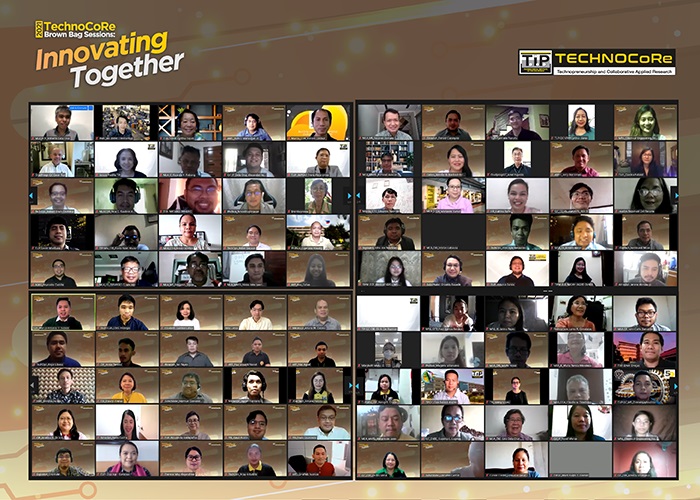
T.I.P. holds first Brown Bag Sessions for applied research projects
The Technological Institute of the Philippines (T.I.P.) last February 24, 2021 held its inaugural TechnoCoRe Brown Bag Sessions. This is a virtual event where its researchers and faculty members share their experiences in collaborative applied research and projects with the school’s industry partners. It was witnessed by T.I.P.’s management and academic community from its Quezon City and Manila campuses.
T.I.P. TechnoCoRe is the school’s thrust towards Technopreneurship and Collaborative Applied Research. It empowers T.I.P.’s researchers, faculty members, and students to work on innovative solutions to the problems of stakeholders, including government, industry, civic organizations, and society at large.
“At its very core, TechnoCoRe exposes our researchers and faculty members to experience-based skills development and knowledge application with our partners. It gives them vast opportunities for real-life problem solving, which then translates into better insights and mentoring of their students in the classroom. They are the ones educating and equipping our nation’s future workforce. Therefore, it is in our best interest to put them at the intersection of theory and practice,” said T.I.P. Senior Vice President Mr. Angelo Lahoz during the event.
A total of 12 T.I.P. project teams presented during the TechnoCoRe Brown Bag Sessions, each sharing their experiences, learnings, and insights from working on applied research projects and consultancies with T.I.P.’s partners. These projects cover various fields of expertise, including: software development; enterprise resource planning; product design, system design, and development; automation, artificial intelligence, machine learning, and data analytics; power and energy engineering; and environmental and sanitary engineering.
Some of the industry partners for these endeavors include the following: ADEC Innovations Healthcare Incorporated, Almedah Food Machineries Corporation, Applied Machining Corporation, Conservation International Philippines, JGenTech, Metercor, SiglaVent, and SubicWater.
T.I.P.’s in-house Applied Research Unit, Technical Operations Unit, and Technology Business Incubation Unit also shared their roles in enabling TechnoCoRe’s various completed and on-going efforts. On top of these projects, T.I.P. TechnoCoRe also has a growing portfolio of other collaborative applied research activities across various stages of completion.
“As an engineering school, our ability to help stakeholders solve problems through innovative and collaborative applied research is our strong suit. The quality, depth, and breadth of the work we have done and are currently doing with our partners is our contribution to national development. We will always be an open and willing partner of Filipinos, for Filipinos,” concluded Mr. Lahoz.
For more information on T.I.P. and T.I.P. TechnoCoRe, please visit T.I.P.’s official social media accounts through @TIP1962official for Facebook, Twitter, and Instagram. You may also visit technocore.tip.edu.ph or email technocore@tip.edu.ph.
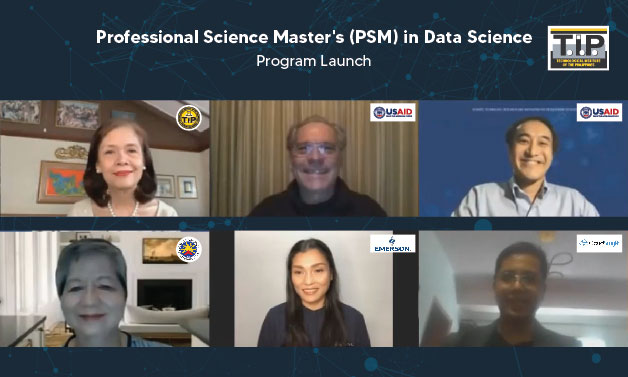
T.I.P. and partners formally launch PSM Data Science amidst pandemic
Joined by representatives from the United States Agency for International Development (USAID), its Science, Technology, Research and Innovation for Development (STRIDE) Program, the Technological Institute of the Philippines (T.I.P.) formally launched its Professional Science Master’s (PSM) Degree in Data Science in a virtual ceremony last September 10, 2020.
Also present during the launch were partners from the Commission on Higher Education (CHED), Emerson Philippines, and CloudSwyft Global Systems, Inc.
T.I.P. President Dr. Elizabeth Quirino-Lahoz welcomed the international and local partners with good news, saying, “Despite these challenging times and despite the program’s quick incubation period, we have a total of 27 pioneering students and counting for our brand new graduate program.” Dr. Lahoz added, “They will be mentored by the program’s impressive faculty line up, all with both academic background and deep experience in the data science industry.”
In contrast to a traditional, theory-centric Master’s degree, a PSM Degree in Data Science involves the perfect mix of science-based theory and industry-desired business skills to produce holistic graduates who are well-versed in both theory and practice. It is essentially an advanced scientific and business degree combined into one comprehensive graduate program.
Additionally, STRIDE Chief of Party Dr. Richard Abendan explained that a PSM program “...enables industry to drive curriculum development and deliver real-world relevance and applications to students. These have a mixture of technical and business courses that prepare students for greater roles in industry.”
Providing key industry insights in the program’s curriculum development and ensuring its global significance were partners CloudSwyft Global Systems, Inc. and Emerson Philippines.
Meanwhile, USAID Office of Education Director Dr. Tom LeBlanc noted the importance of such a PSM program for Filipinos, remarking, “Indeed, the future looks bright for the next generation of Filipino scientists and engineers. No longer will they need to seek further education on this emerging industry outside the country. Initiatives such as the PSM make it possible for young Filipinos to compete with their contemporaries from around the world.”
The T.I.P. PSM Data Science program only had a six-month runway for its launch, with most of this time under the pandemic period. CHED National Capital Region CESO III Director IV Dr. Virginia Akiate commended the engineering school’s effort, “The very birth of your PSM program goes to show that even the COVID pandemic cannot stop the Technological Institute of the Philippines from offering Metro Manila’s first ever Professional Science Master’s degree in Data Science starting this School Year 2020-2021 purely online.”
The T.I.P. Professional Science Master’s (PSM) Degree in Data Science is expected to help meet the growing demand for local data scientists, one of the top emerging and most in demand jobs in the Philippines today. For enrollment and program inquiries, you may email admissions.tipqcgraduateprograms@tip.edu.ph (QC) or mlagradprogram@tip.edu.ph (Manila). You may also reach T.I.P. through the following numbers (+632) 8911-0964, (+63) 917-8590279 for T.I.P. QC and (+632) 8733-9117 for T.I.P. Manila. For Graduate Program requirements and all other details, please visit www.tip.edu.ph.
You may watch the replay of the T.I.P. PSM Degree in Data Science Formal Launch Ceremony here: http://bit.ly/TIPPSMinDataScienceLaunching.

T.I.P. offers first Professional Science Master’s (PSM) Degree in Data Science in NCR
The Technological Institute of the Philippines (T.I.P.) is offering Metro Manila’s first ever Professional Science Master’s (PSM) Degree in Data Science starting this School Year 2020-2021 to help meet the growing demand for data scientists, one of the top emerging and most in-demand jobs in the Philippines.
“We are very excited to be offering this new PSM Degree in Data Science. With big data having tremendous impact on how industries make major decisions, professionals who can analyze the numbers and translate these into positive business outcomes will be highly valuable and sought after. Both these skills shall be mastered by students of this new graduate program,” said T.I.P. President Dr. Elizabeth Quirino-Lahoz.
T.I.P. benchmarked the curriculum of its PSM Degree in Data Science against the data science programs of schools affiliated with the United States’ National Professional Science Master’s Association (NPSMA), ensuring enrollees shall be up to par with international standards. T.I.P. also partnered with CloudSwyft Global Systems, Inc. and Emerson Philippines to further enhance the curriculum’s local and global significance.
These benchmarking and partnership efforts were facilitated by the United States Agency for International Development (USAID) Science, Technology, Research and Innovation for Development (STRIDE).
Asked on the program’s significance, CloudSwyft Vice President for Business Development Prince Datu commented, “Data Science is one of today’s hottest jobs – rapidly growing in response to the amount of data being captured and analyzed. Companies hire data scientists to find insights and to solve meaningful business problems.”
In contrast to a traditional, theory-centric Master’s degree, a PSM Degree in Data Science involves the perfect mix of science-based theory and industry-desired business skills to produce holistic graduates who are well-versed in both theory and practice. It is essentially an advanced scientific and business degree combined into one comprehensive program.
“Industry needs data scientists who are not only equipped with technical skills but also with business and organizational skills, as well as workplace skills,” affirmed Emerson Automation Solutions Senior Manager for Quality and Excellence Engr. Villacer Ceredon.
Enrollees of the proposed program shall be better equipped in gathering data, turning big data into useful actionable insights relevant to the industry, solving real-world problems through carefully applied problem-solving skills, and contributing in the creation of more effective companies and industries. These in turn will pave the way for PSM graduates to become global key players, in this data-driven era.
This graduate program in Data Science is the second PSM degree to be offered by T.I.P. The first is the PSM degree in Construction Management which was likewise launched through the support of USAID STRIDE and in partnership with Megawide Construction Corporation and Meralco Industrial Engineering Services Corporation (MIESCOR) in 2015. The T.I.P. PSM Construction Management program was the very first PSM program to be ever offered in the whole country.
The PSM Degree in Data Science shall be delivered purely online on a modular basis via the Canvas learning management system, T.I.P.’s official online learning platform. Classes start on August 24, 2020.
For enrollment and program inquiries, you may email admissions.tipqcgraduateprograms@tip.edu.ph (QC) or mlagradprogram@tip.edu.ph (Manila). You may also reach T.I.P. through the following numbers (+632) 8911-0964, (+63) 917-8590279 for T.I.P. QC and (+632) 8733-9117 for T.I.P. Manila. For Graduate Program requirements and all other details, please visit www.tip.edu.ph.

T.I.P. shifts to flexible learning, holds first-ever online summer classes
In an effort to encourage its students to keep safe by staying home and learning online, the Technological Institute of the Philippines (T.I.P.) is now conducting its Summer Classes 2020 digitally via the Canvas learning management system. This is part of the institution’s flexible learning efforts amidst the COVID-19 pandemic.
T.I.P. commits to helping its students adjust to flexible learning by thoroughly developing effective and enjoyable courses properly modified to fit this new learning environment.
In a written address, T.I.P. President Dr. Elizabeth Quirino-Lahoz explained to the T.I.P. community the importance of the institution’s move, saying, “Learning cannot stop, and we need to use whatever tools are communally available to ensure continuity of education.”
With abrupt changes in the education system, T.I.P. understands that not all students have the means to enroll in online classes this summer. Dr. Quirino-Lahoz also addressed this, explaining, “This (offering of online classes) does not aim to discriminate against those who cannot avail themselves of such a modality. Rather, the goal here is to at least be able to serve a segment of students who are able and willing to do so.”
Flexible learning shall be part of the new normal in education. T.I.P. sees offering online summer classes as early as now as an opportunity to gather feedback from the online experience, that will be vital to crafting its future flexible learning initiatives and policies, especially leading up to the 1st semester of SY 2020-2021.
To further ensure education continuity for incoming senior high school students and college freshmen, T.I.P.’s Admissions Office has also transitioned to fully online applicant registration. Interested enrollees can now register via admissions, as well as email their inquiries through admissions.qc@tip.edu.ph and admissions.manila@tip.edu.ph.

T.I.P. launches student-friendly semester for undergraduate and graduate programs!
Going Modular: T.I.P.'s new approach to delivering online and flexible learning courses
The Technological Institute of the Philippines (T.I.P.) is making major changes to its education system as it opens its virtual doors on August 24, 2020 for its undergraduate and graduate program students for the School Year 2020-2021.
T.I.P. shall be adopting online and flexible learning approaches for the coming first semester due to the continued threat of COVID-19. This is true for T.I.P.’s engineering, architecture, computing, business education, ARTS, teacher education, and graduate programs.
Alongside these changes in educational modality is T.I.P.’s shift to modular delivery of its courses. T.I.P. designed the modular format with students in mind to provide them with a study-life balance. As well as keeping in mind the challenges they may be facing that are brought about by the COVID-19 pandemic. The modular approach shall be very manageable for the students because they shall only deal with 3 or less courses every 6 weeks. This pace is much friendlier and is very much in contrast to a regular semester where they shall take 9 courses simultaneously in one semester. Students shall not experience any online course burn out because they only need to focus on 2 or 3 courses at a time. They can pursue their hobbies and interests while enrolled in T.I.P.
“T.I.P. has always valued the health and safety of its community, which is one of its primary reasons for providing online/flexible learning classes,” explained T.I.P. President Dr. Elizabeth Quirino-Lahoz. “This drastic change may sound intimidating at first for our students. But once they understand the logical design of the modular delivery of courses, they shall soon know that they can still achieve the expected course outcomes, and at the same time balance their academic load with their other responsibilities,” Dr. Quirino-Lahoz continued.
The school has heavily invested in its IT systems to anchor its online/flexible learning efforts. It has recently revamped its EmpowerED ARIS student management portal to facilitate enrollment in the new normal, as well as adopted the Canvas learning management system (LMS) for the conduct of classes and online student life. All other student services such as its Career Center, Student Group Tutorial, Student Affairs, Guidance Office, and even its Dental and Medical services are now all accessible in just a few clicks through Canvas.
T.I.P.’s efforts in shifting its education modality and student services online is part of its newest thrust towards reengineering its education ecosystem. Interested incoming SHS and College students can apply online via admissions or emailing admissions.qc@tip.edu.ph (QC) or admissions.manila@tip.edu.ph (Manila). For more inquiries, applicants can also reach T.I.P. through the following numbers (+632) 8911-0964 and (+63) 917-8590279 for T.I.P. QC and (+632) 8733-9117 for T.I.P. Manila
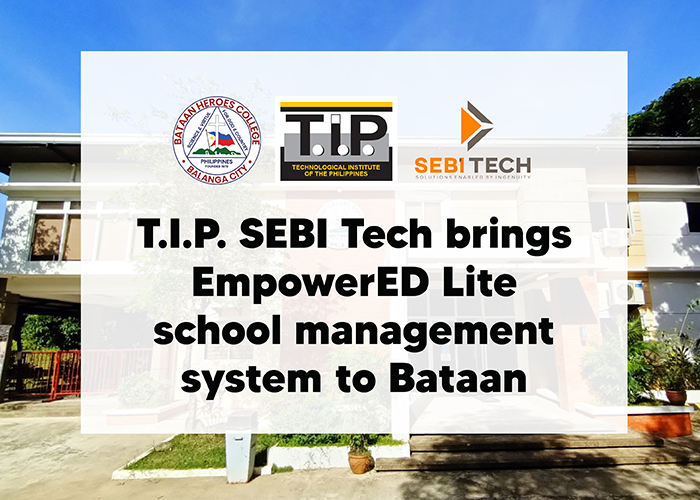
T.I.P. SEBI Tech brings EmpowerED Lite school management system to Bataan
The Technological Institute of the Philippines' (T.I.P.) first spin-off company, SEBI Technologies, Inc. (SEBI Tech), is expanding its reach in the north with the introduction of its homegrown EmpowerED Lite school management system to the Bataan Heroes College (BHC).
T.I.P. Senior Vice President and concurrent SEBI Tech President and CEO Angelo Lahoz signed a Memorandum of Agreement with BHC Administrator Laurice Faye Juarez early October, marking the start of a good working relationship between their schools.
"This partnership aligns with our strategic thrust towards digital transformation and sustaining innovation. We see the future of work and classes as hybrid (on campus and online), so we are working towards building the capacity to do both well," said Juarez.
BHC is SEBI Tech's latest client-partner, and is the first to use EmpowerED Lite.
A fully integrated, customizable, ready for use school management system, EmpowerED Lite offers all the key benefits of EmpowerED at a much lower cost and shorter deployment timeframe.
In as fast as two months, client-partners like BHC can have faster, more efficient, automated student and faculty services ranging from enrollment, grades, curriculum, and fees management, including graduation.
"We always want to find ways to do things better. From an internal standpoint, decongesting manpower for clerical tasks will allow us to focus more on high value work, not to mention sparing our personnel from burnout. It helps boost their morale too," Juarez added.
With BHC on the list, the EmpowerED school system now serves a combined total of 42,500 students and over 3,000 faculty and staff across different schools in the country.
For more information on SEBI Tech and the EmpowerED line of school system products and services, visit sebitechnologies.com or contact them at 0917 838 5503 or info@sebitechnologies.com.

The Best of T.I.P. at a Glance
At a glance, see the accreditations, recognitions, and rankings achieved by the T.I.P. community. We beam with #TIPPride as the institute continues to stay true to its commitment to excellence.
Latest CHED Award: Granted Autonomous Status Again by the CHED (2024-2027)
Latest AUN-QA Assessment: Given Institutional Assessment by the AUN-QA
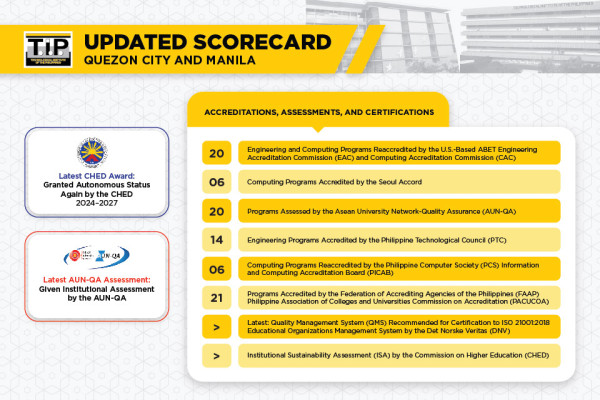
ACCREDITATIONS, ASSESSMENTS, AND CERTIFICATIONS
- 20 Engineering and Computing Programs Reaccredited by the U.S.-Based ABET Engineering Accreditation Commission (EAC) and Computing Accreditation Commission (CAC)
- 6 Computing Programs Accredited by the Seoul Accord
- 20 Programs Assessed by the ASEAN University Network-Quality Assurance (AUN-QA)
- 14 Engineering Programs Accredited by the Philippine Technological Council (PTC)
- 6 Computing Programs Reaccredited by the Philippine Computer Society (PCS) Information and Computing Accreditation Board (PICAB)
- 21 Programs Accredited by the Federation of Accrediting Agencies of the Philippines (FAAP) Philippine Association of Colleges and Universities Commission on Accreditation (PACUCOA)
- Latest: Quality Management System (QMS) Recommended for Certification to ISO 21001:2018 Educational Organizations Management System by the Det Norske Veritas (DNV)
- Institutional Sustainability Assessment (ISA) by the Commission on Higher Education (CHED)
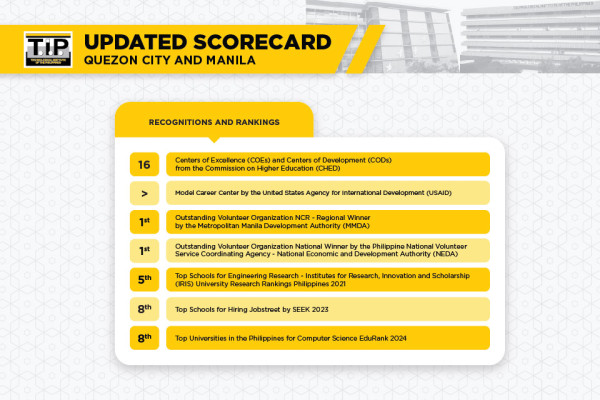
RECOGNITIONS AND RANKINGS
- 16 Centers of Excellence (COEs) and Centers of Development (CODs) from the Commission on Higher Education (CHED)
- Model Career Center by the United States Agency for International Development (USAID)
- 1st Outstanding Volunteer Organization NCR - Regional Winner by the Metropolitan Manila Development Authority (MMDA)
- 1st Outstanding Volunteer Organization National Winner by the Philippine National Volunteer Service Coordinating Agency - National Economic and Development Authority (NEDA)
- 5th Top Schools for Engineering Research - Institutes for Research, Innovation and Scholarship (IRIS) University Research Rankings Philippines 2021
- 8th Top Schools for Hiring Jobstreet by SEEK 2023
- 8th Top Universities in the Philippines for Computer Science EduRank 2024
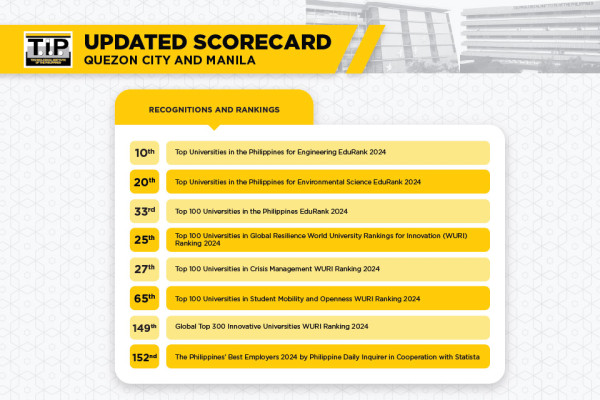
RECOGNITIONS AND RANKINGS
- 10th Top Universities in the Philippines for Engineering EduRank 2024
- 20th Top Universities in the Philippines for Environmental Science EduRank 2024
- 33rd Top 100 Universities in the Philippines EduRank 2024
- 25th Top 100 Universities in Global Resilience World University Rankings for Innovation (WURI) Ranking 2024
- 27th Top 100 Universities in Crisis Management WURI Ranking 2024
- 65th Top 100 Universities in Student Mobility and Openness WURI Ranking 2024
- 149th Global Top 300 Innovative Universities WURI Ranking 2024
- 152nd The Philippines' Best Employers 2024 by Philippine Daily Inquirer in Cooperation with Statista

